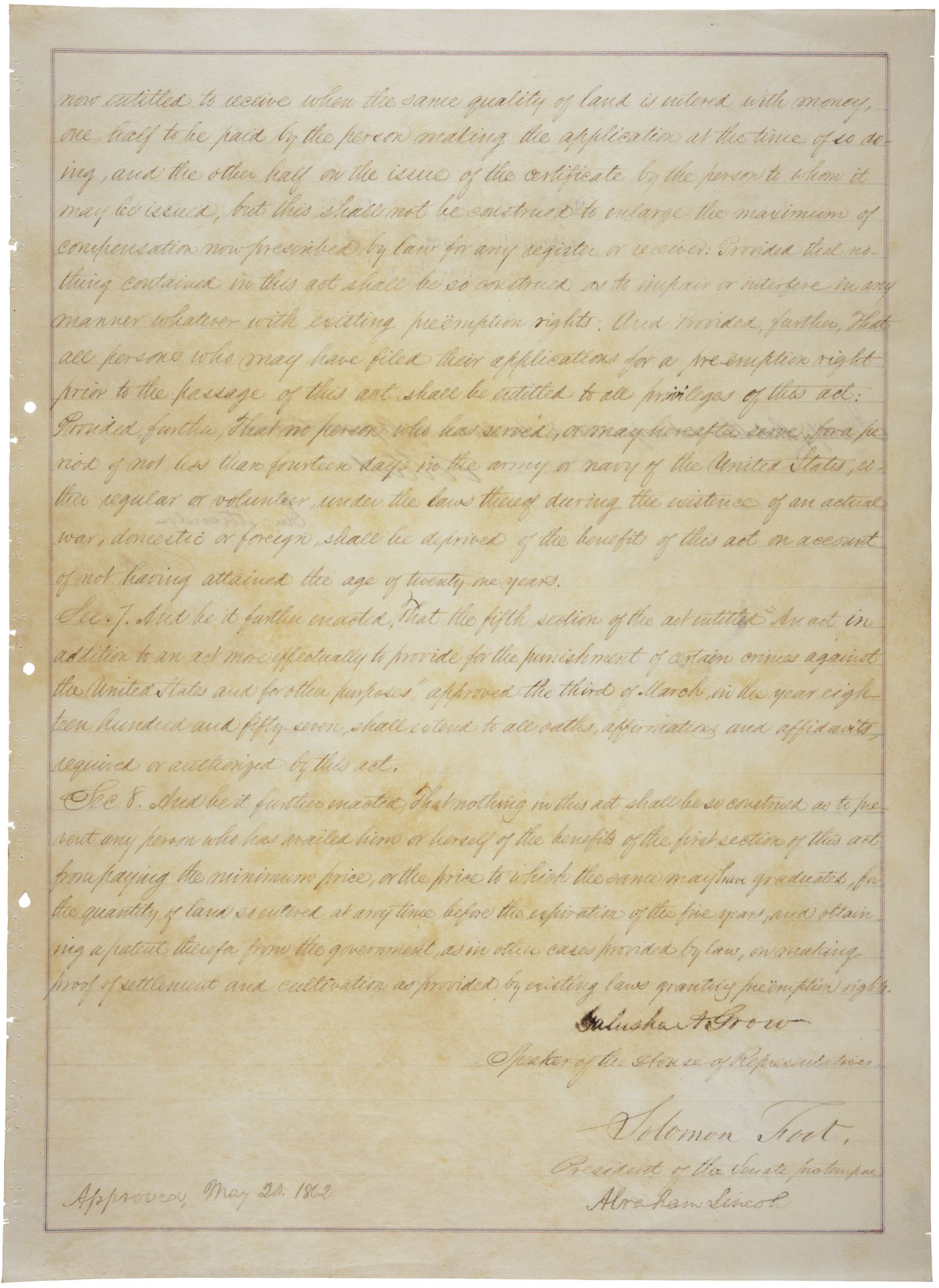Beginning of a Dream, Homestead Act Made Law Part 1
Making Connections
All documents and text associated with this activity are printed below, followed by a worksheet for student responses.Introduction
The Homestead Act changed the complexion of the United States and the world forever! The offer of free land encouraged millions from all across the globe to collect in the United States. The Homestead Act defines the American Dream! Under this law more than 270 million acres or 10 percent of the nation was given away in search of that dream. Homesteading had a significant impact on the history of immigration, industrialization, agriculture, and transportation, as well as social, environmental, and cultural histories. Today there may be as many as 93 million people who are descendent of homesteaders; they are a testament to the impact that this legislation had on our country.Name:
Class:
Class:
Worksheet
Beginning of a Dream, Homestead Act Made Law Part 1
Making Connections
Examine the documents and text included in this activity. Fill in any blanks in the sequence with your thoughts and write your conclusion response in the space provided.Land Ordinance of 1785
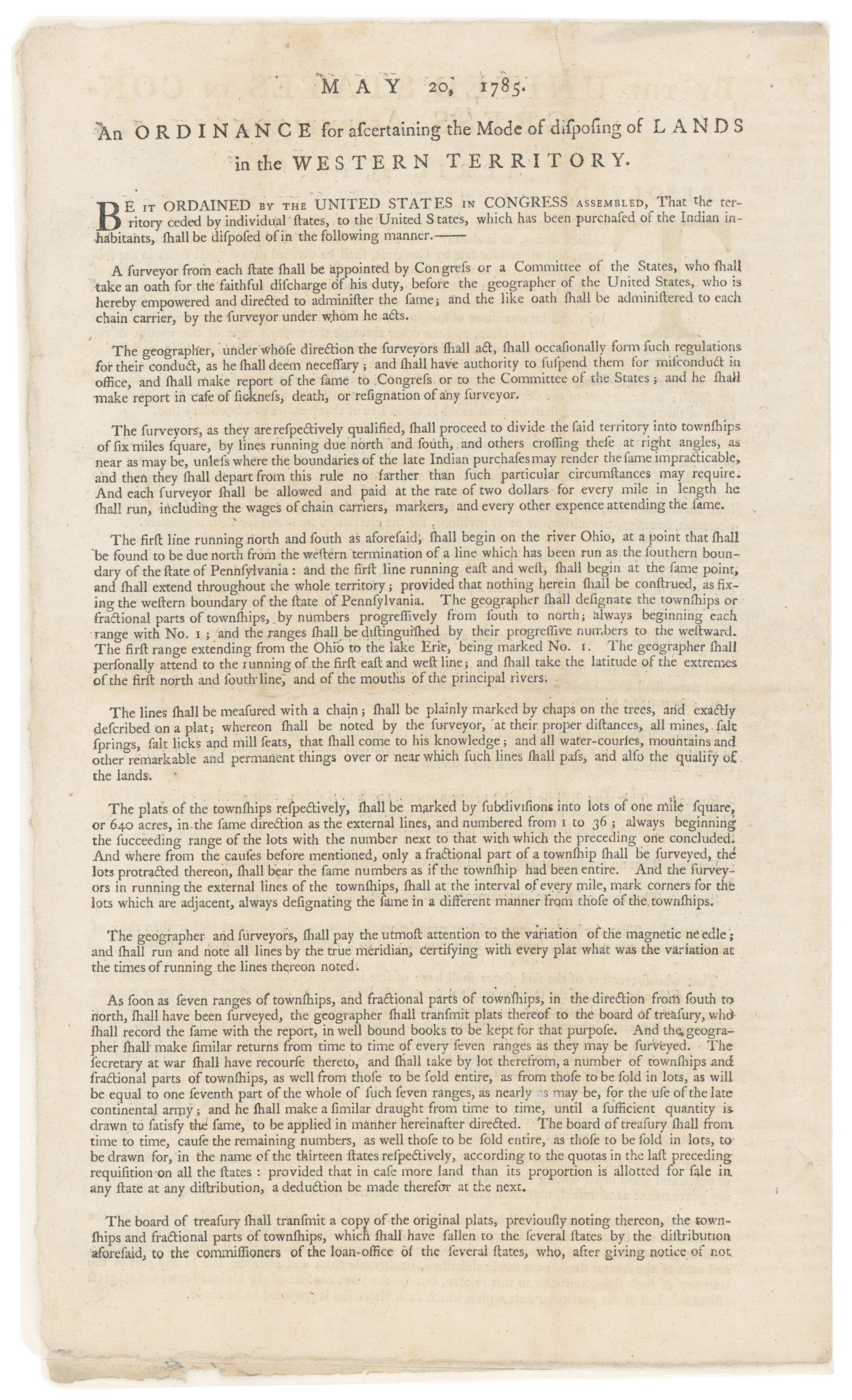
How do you think the Land Ordinance of 1785 relates to the Homestead Act of 1862?
Enter your response
Letter transmitting "An Act making further Provision for the Expense Attending to Intercourse between the United States and Foreign Nations"
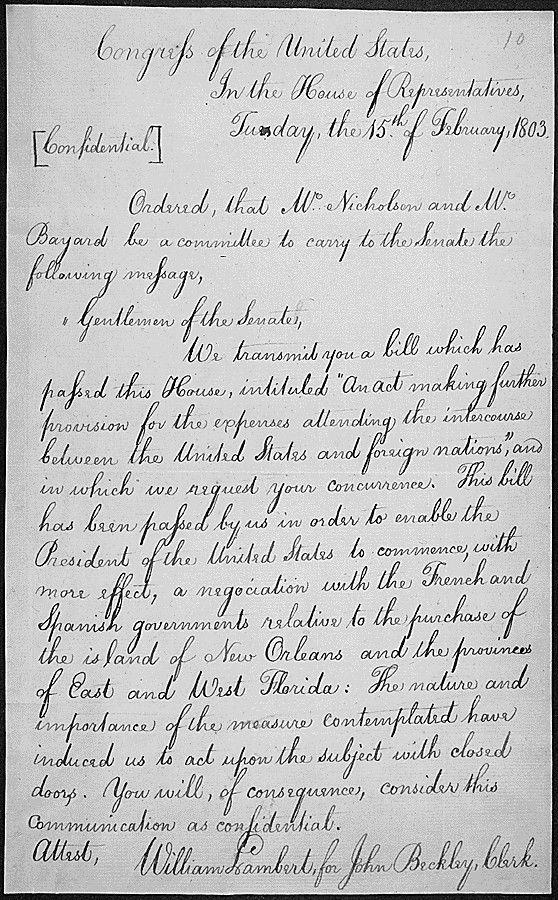
How did this letter affect the authority of the President of the United States?
Enter your response
Agreement to Pay France for the Louisiana Purchase

Oregon Treaty
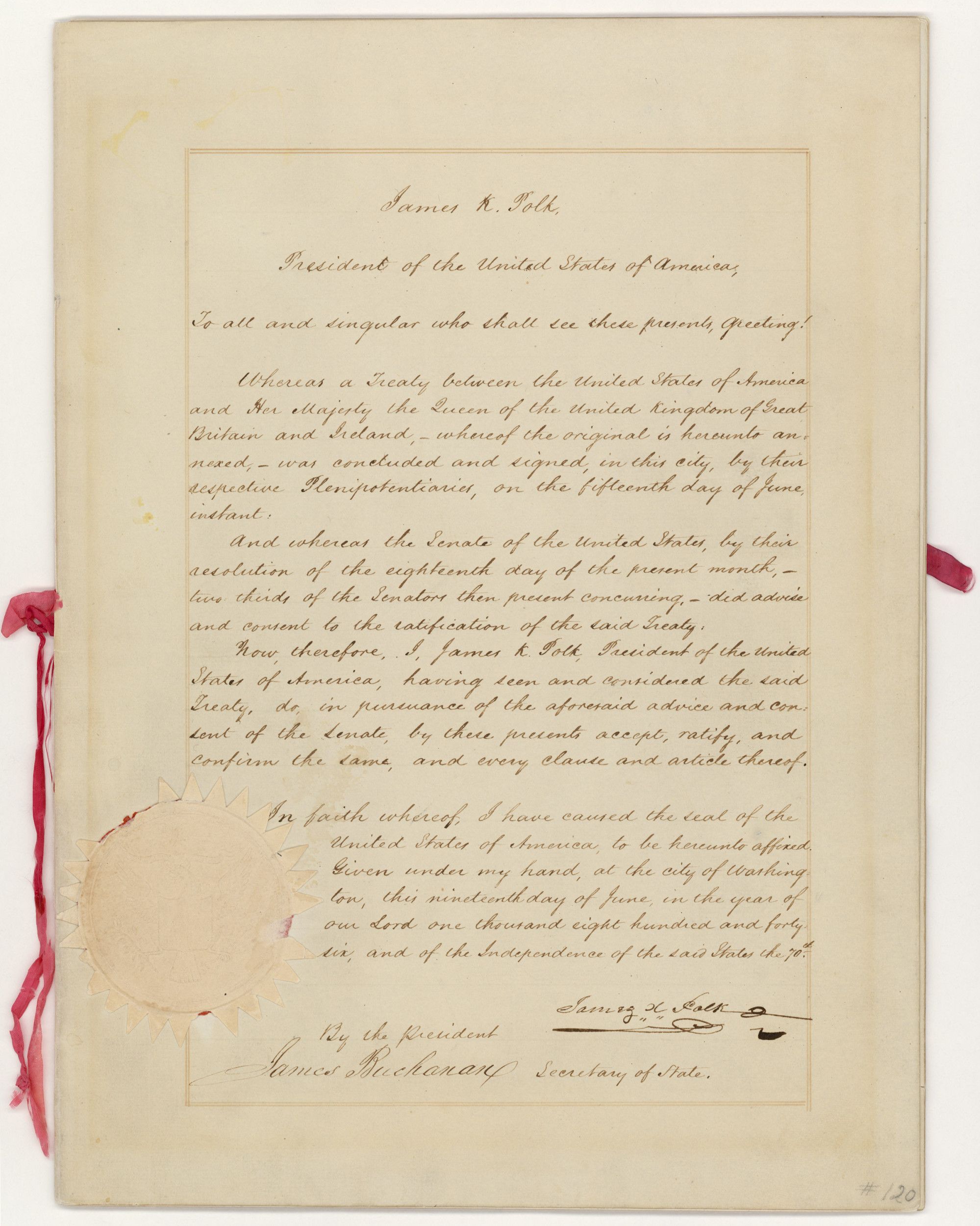
Treaty of Guadalupe-Hidalgo [Exchange copy]
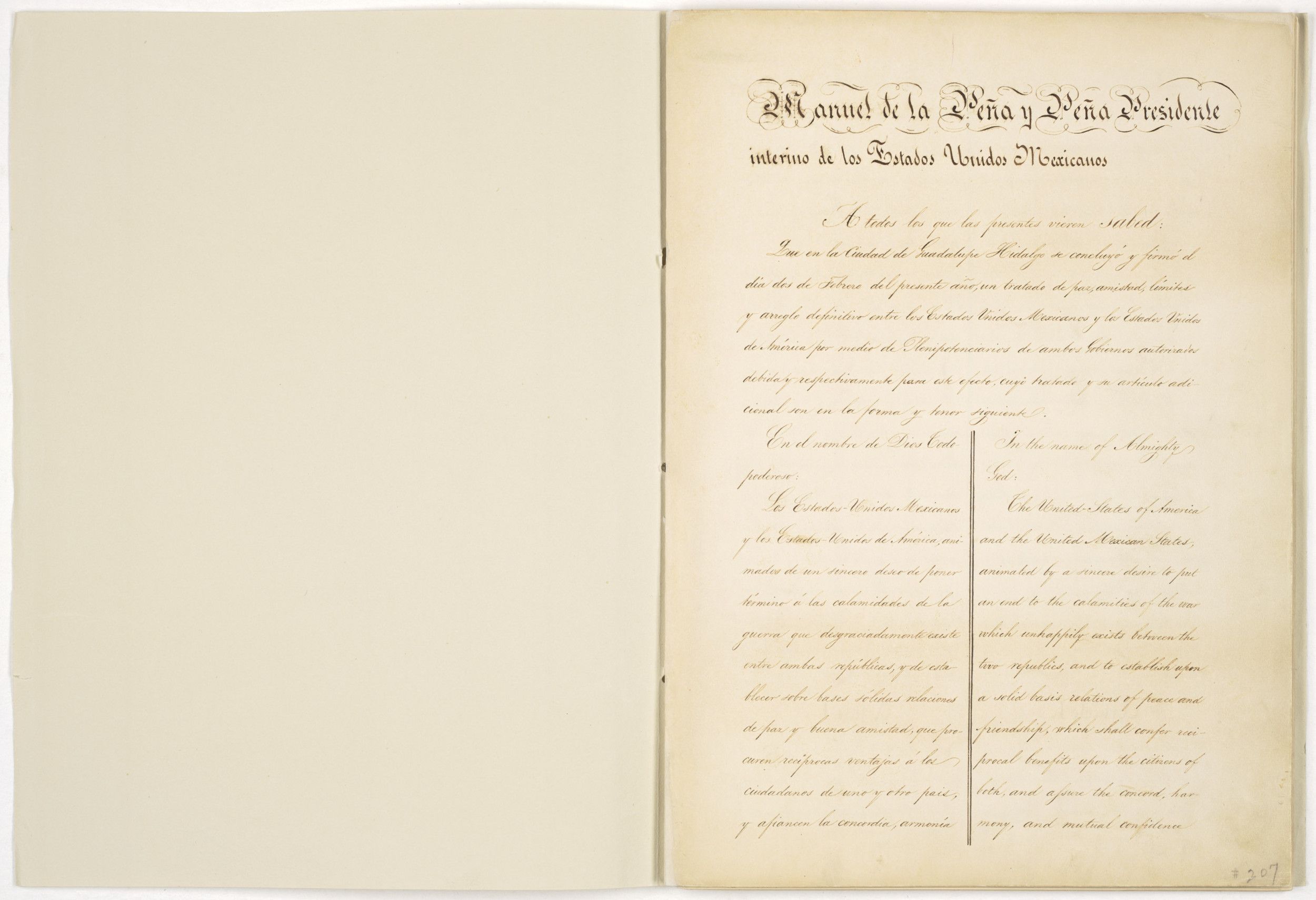
What did the Louisiana Purchase, the Oregon Treaty and the Treaty of Guadalupe-Hidalgo do to the borders of the United States?
Enter your response
Map of the United States Including Western Territories
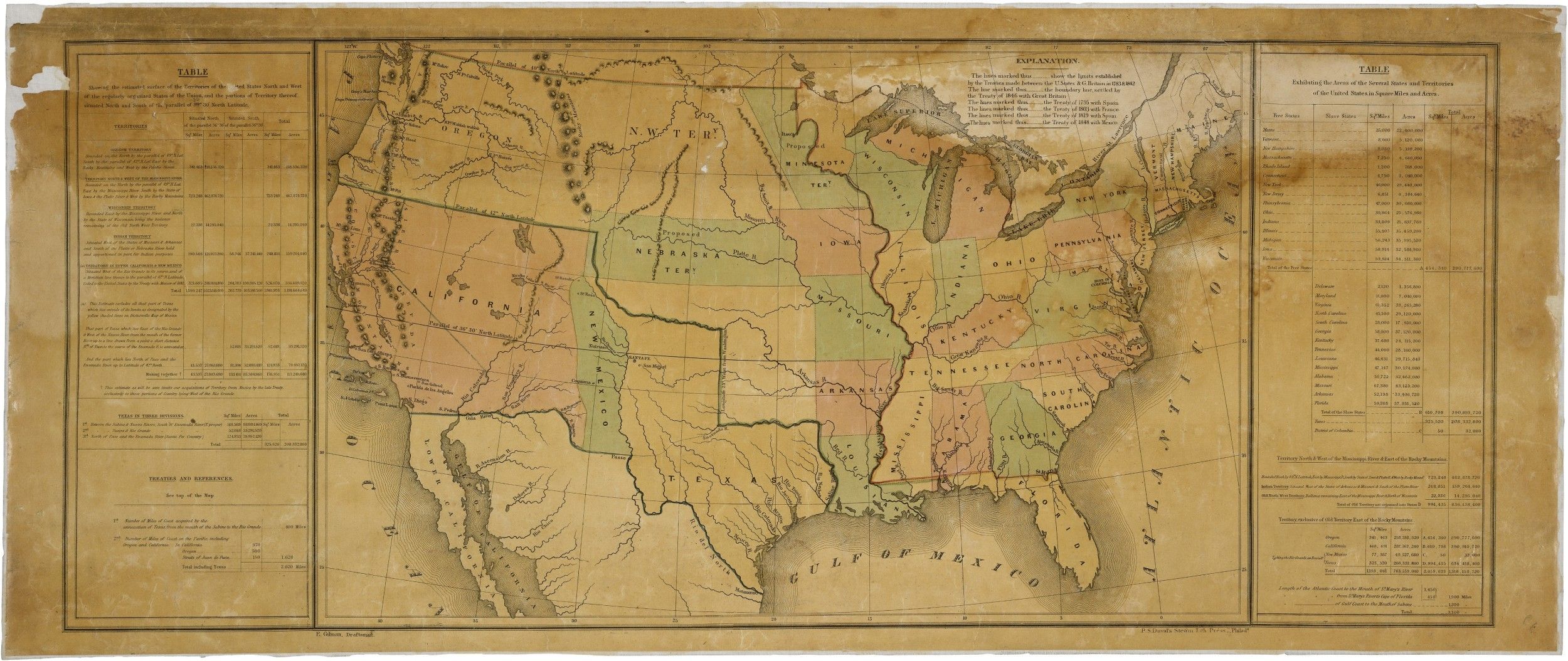
The map of the United States Including Western Territories accompanied President James K. Polk's message to Congress. Why do you think it became the starting point of debates in Congress over slavery and westward expansion?
Enter your response
Constitution of the United States
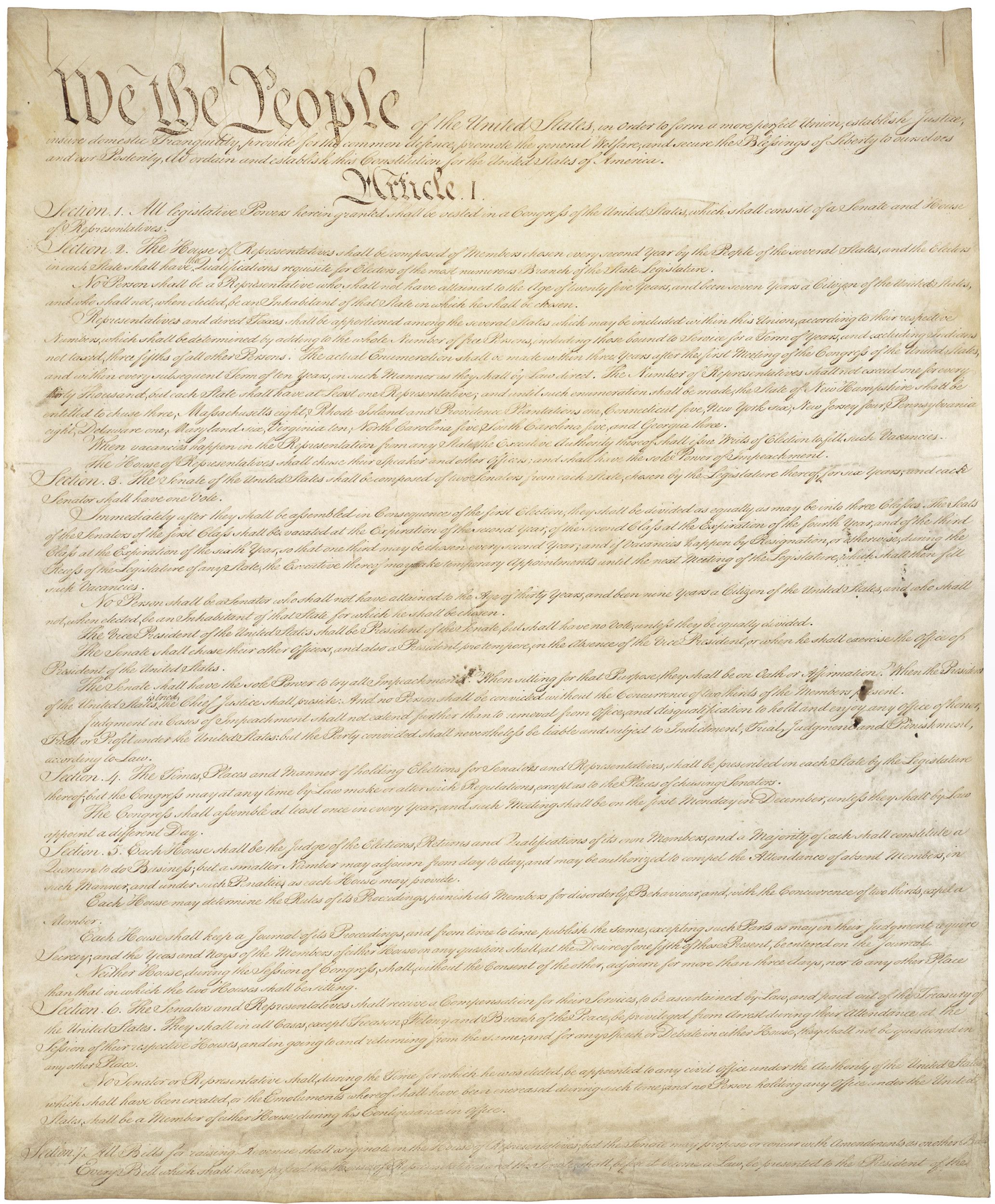
The federal government sought to give away millions of acres of land under various land laws such as the Homestead Act. What Articles in the Constitution gave them this authority?
Enter your response
Act of May 20, 1862 (Homestead Act), Public Law 37-64 (12 STAT 392)
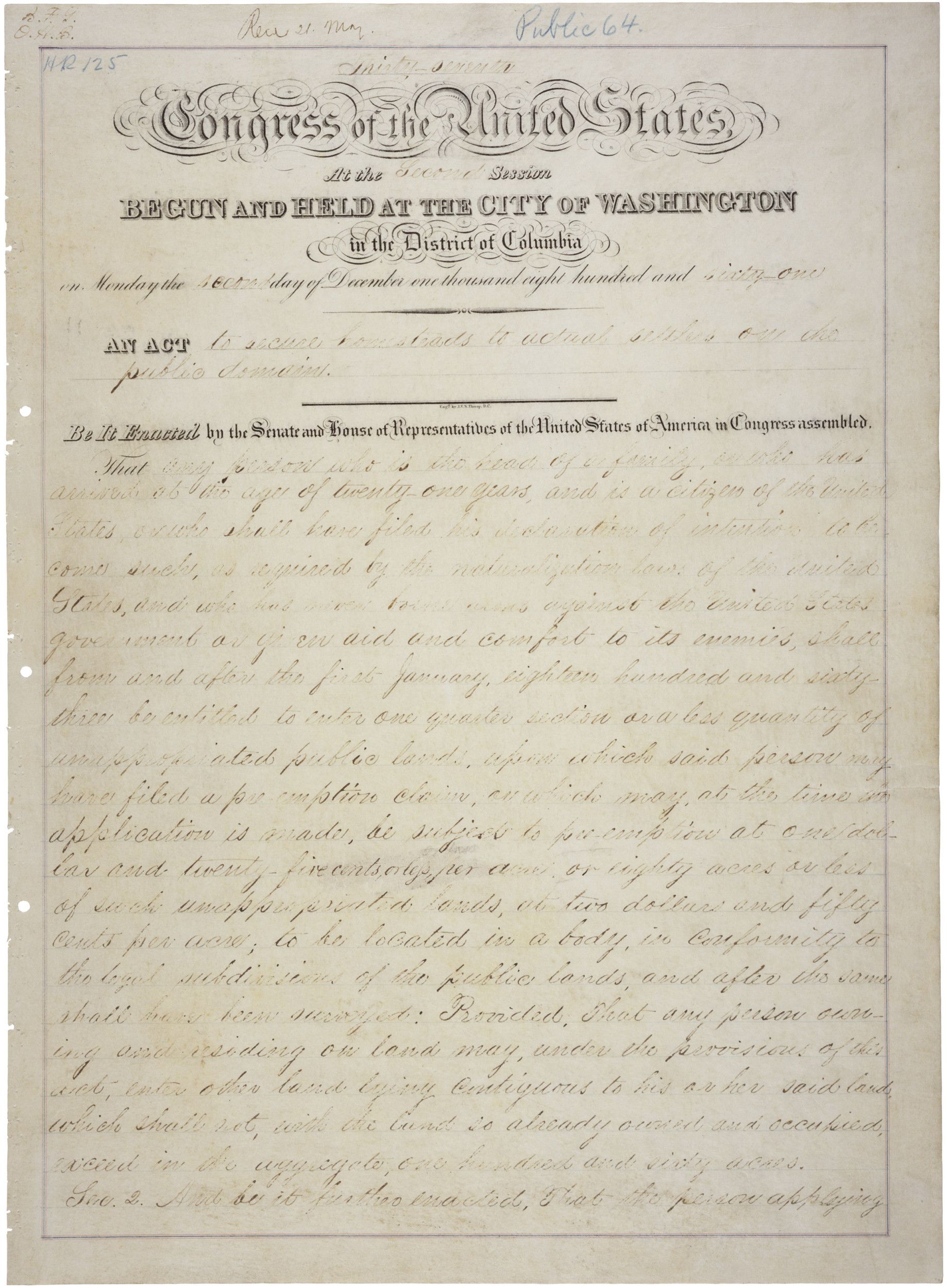
How are the Land Ordinance of 1785, The Constitution of the United States and The Homestead Act of 1862 linked together?
Enter your response
1
Activity Element
Land Ordinance of 1785
Page 1

2
Activity Element
Letter transmitting "An Act making further Provision for the Expense Attending to Intercourse between the United States and Foreign Nations"
Page 1

3
Activity Element
Agreement to Pay France for the Louisiana Purchase
Page 1

4
Activity Element
Oregon Treaty
Page 2

5
Activity Element
Treaty of Guadalupe-Hidalgo [Exchange copy]
Page 1

6
Activity Element
Map of the United States Including Western Territories
Page 2

7
Activity Element
Constitution of the United States
Page 1

8
Activity Element
Act of May 20, 1862 (Homestead Act), Public Law 37-64 (12 STAT 392)
Page 1

Conclusion
Beginning of a Dream, Homestead Act Made Law Part 1
Making Connections
The legacy of the Homestead Act of 1862 is all around us today. The great agricultural fields that grow the world’s food, the industrialization that spurred countless technological innovations and the millions of people throughout the world that were afforded the opportunity to obtain free land was made possible by the Homestead Act. It fulfilled the promise of America’s forefathers, offering land to anyone, despite gender, race, or nationality, the chance to pursue happiness and participate in the American Dream.Your Response
Document
Land Ordinance of 1785
5/20/1785
Early methods for allocating unsettled land outside the original 13 colonies were arbitrary and chaotic. Boundaries were established by stepping off plots from geographical landmarks. As a result, overlapping claims and border disputes were common.
The Land Ordinance of 1785 finally implemented a standardized system of Federal land surveys that eased boundary conflicts. The official Government description of land was by range, township, and section. Using astronomical starting points, territory was divided into a 6-mile square called a township prior to settlement. The township was divided into 36 sections, each measuring 1 square mile or 640 acres each.
The Government instituted direct sales to purchasers by the Government. Sale of public land was a means to generate revenue for the Government; but it also encouraged settlement and helped to propel the nation westward.
The Government instituted direct sales to purchasers by the Government. Sale of public land was a means to generate revenue for the Government; but it also encouraged settlement and helped to propel the nation westward.
This primary source comes from the Records of the U.S. House of Representatives.
National Archives Identifier: 1943531
Full Citation: Land Ordinance of 1785; 5/20/1785; (HR 9A-C3.1); Committee Papers, 1805 - 1948; Records of the U.S. House of Representatives, ; National Archives Building, Washington, DC. [Online Version, https://docsteach.org/documents/document/land-ordinance-of-1785, April 28, 2024]Land Ordinance of 1785
Page 1
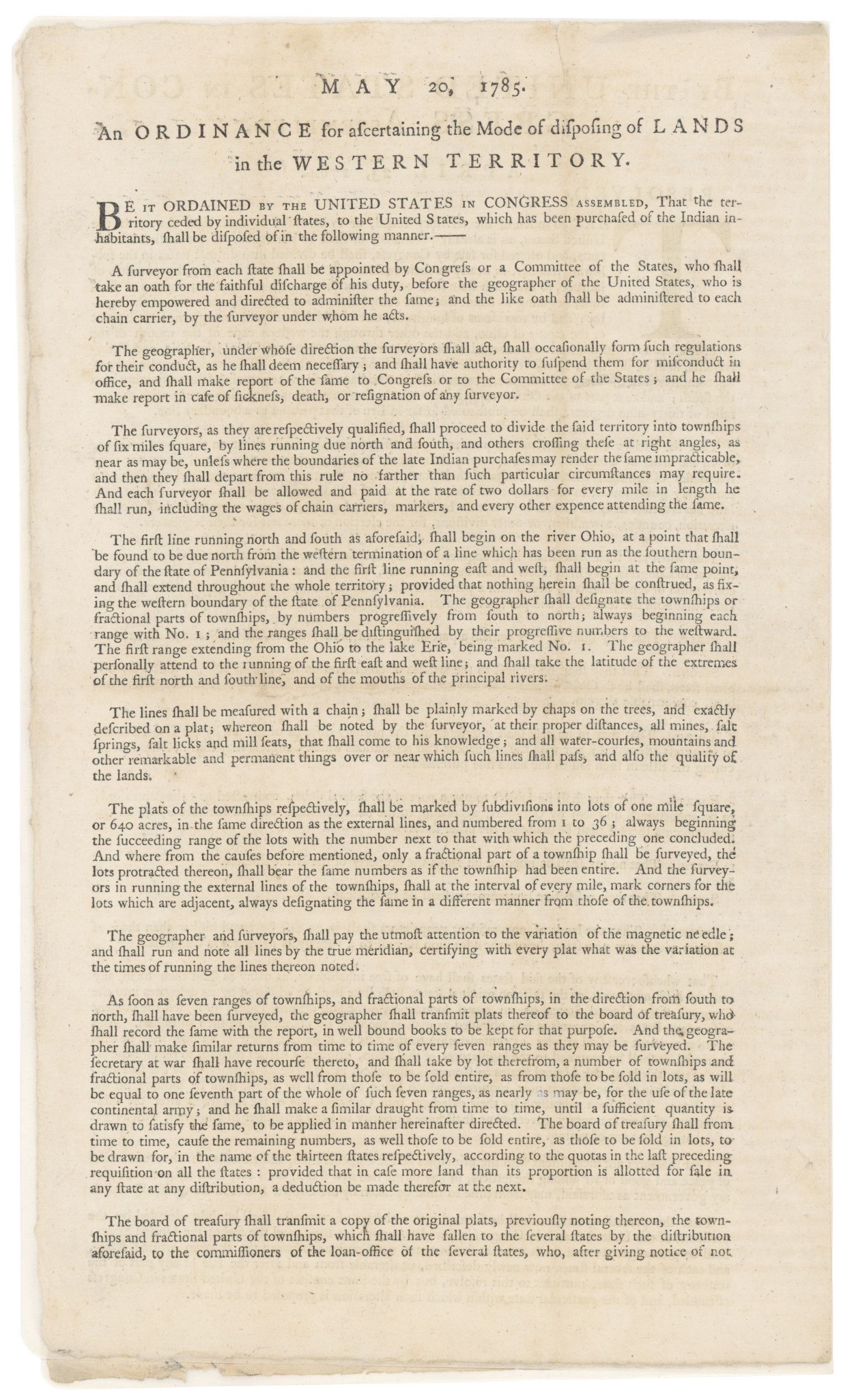
Land Ordinance of 1785
Page 2
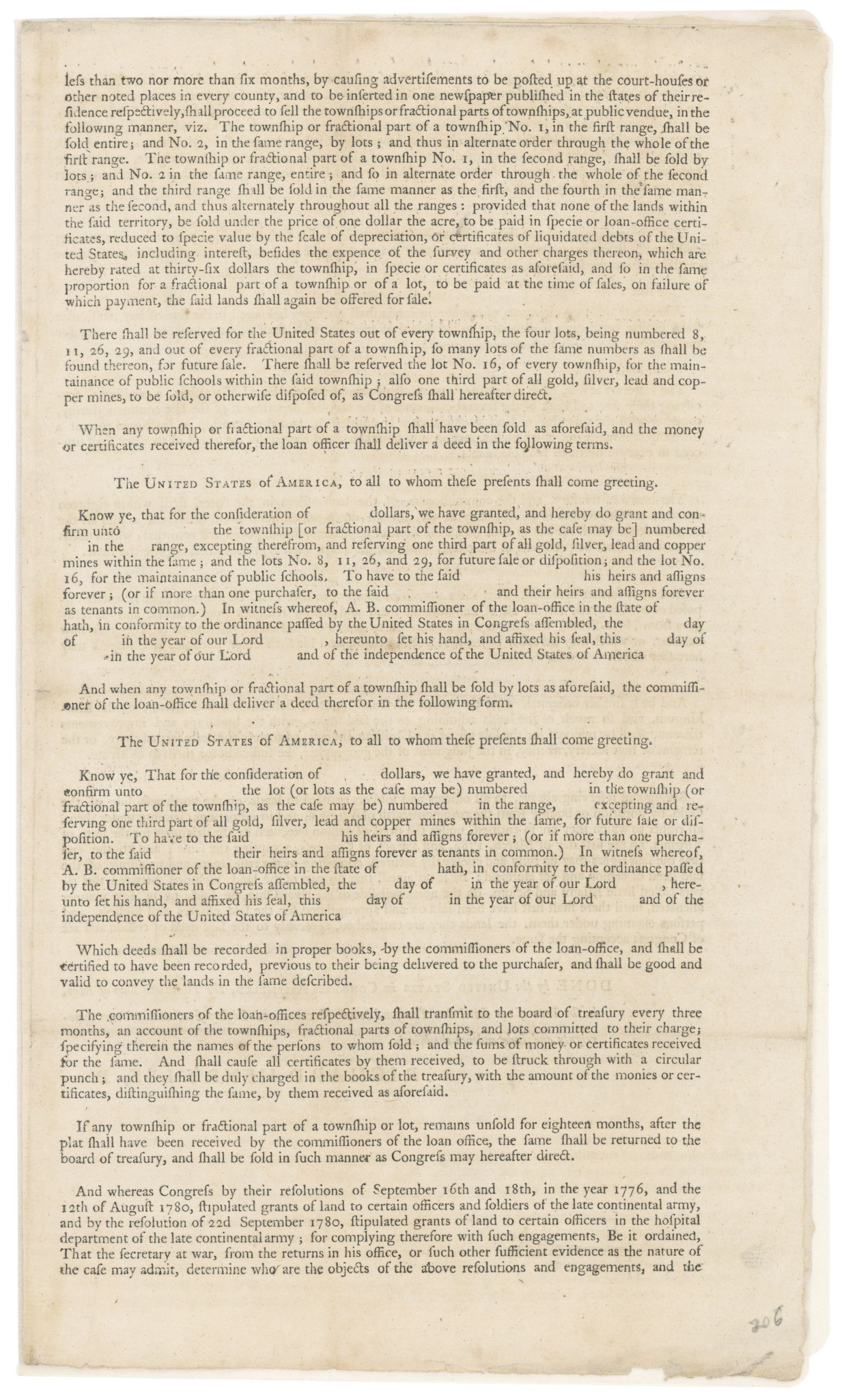
Land Ordinance of 1785
Page 3
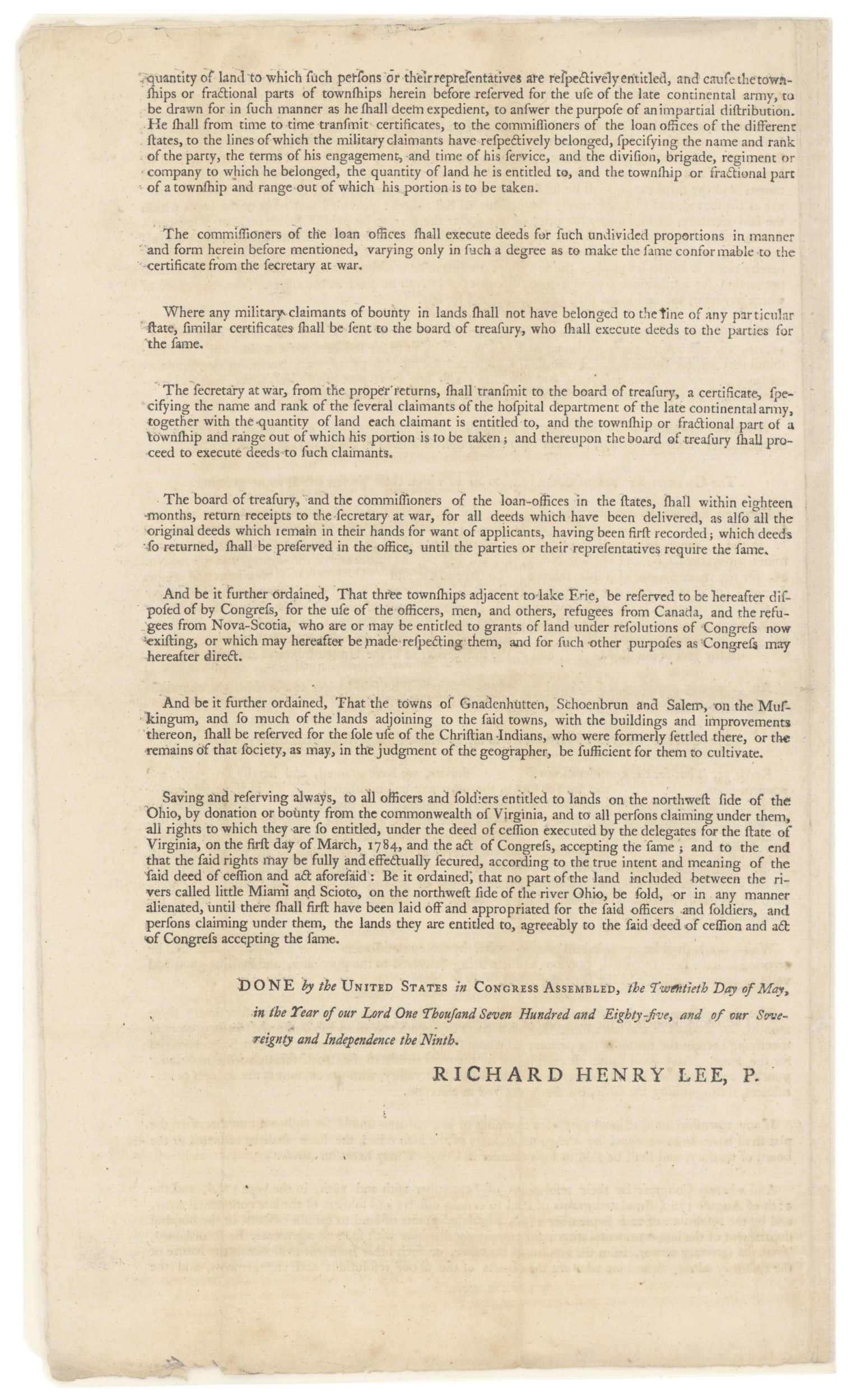
Document
Letter transmitting 'An Act making further Provision for the Expense Attending to Intercourse between the United States and Foreign Nations'
2/15/1803
Transcript
Congress of the United States,In the House of Representatives,
Tuesday, the 15th of February, 1803.
[in brackets] Confidential
Ordered, that Mr. Nicholson and Mr. Bayard be a committee to carry to the Senate the
following message,
[stray mark?] Gentlemen of the Senate,
We transmit you a bill which has passed this House, intituled “An act making further
provision for the expenses attending the intercourse between the United States and foreign
nations,” and in which we request your concurrence. This bill has been passed by us in order to
enable the President of the United States to commence, with more effect, a negociation with the
French and Spanish governments relative to the purchase of the island of New Orleans and the
provinces of East and West Florida: The nature and importance of the measure contemplated
have induced us to act upon the subject with closed doors. You will, of consequence, consider
this communication as confidential.
Attest,
William Lambert, for John Beckley, Clerk.
This primary source comes from the Records of the U.S. Senate.
National Archives Identifier: 306292
Full Citation: Letter transmitting 'An Act making further Provision for the Expense Attending to Intercourse between the United States and Foreign Nations'; 2/15/1803; Records of the U.S. Senate, . [Online Version, https://docsteach.org/documents/document/letter-transmitting-an-act-making-further-provision-for-the-expense-attending-to-intercourse-between-the-united-states-and-foreign-nations, April 28, 2024]Letter transmitting 'An Act making further Provision for the Expense Attending to Intercourse between the United States and Foreign Nations'
Page 1
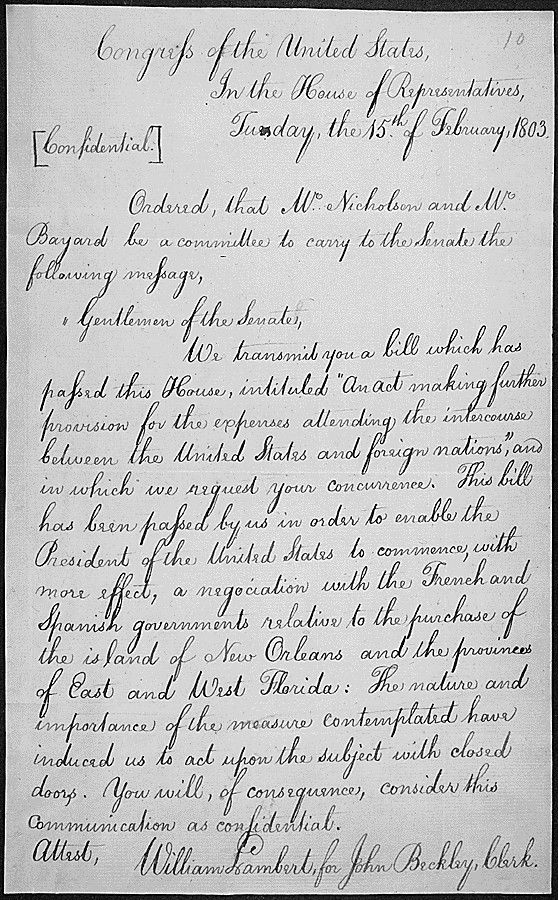
Document
French Exchange Copy of the Agreement to Pay France for the Louisiana Purchase
4/30/1803
The Louisiana Purchase consists of three separate agreements between the United States and France: a treaty of cession and two agreements providing for the exchange of monies in the transaction. This is the French exchange copy of the agreement providing for the payment of 60 million francs by the United States to France. It was signed by the future Emperor Napoleon Bonaparte and his Foreign Minister, Charles Maurice de Talleyrand-Perigord.
Transcript
TREATY BETWEEN THE UNITED STATES OF AMERICA AND THE FRENCH REPUBLICThe President of the United States of America and the First Consul of the French Republic in the name of the French People desiring to remove all Source of misunderstanding relative to objects of discussion mentioned in the Second and fifth articles of the Convention of the 8th Vendémiaire an 9 (30 September 1800) relative to the rights claimed by the United States in virtue of the Treaty concluded at Madrid the 27 of October 1795, between His Catholic Majesty & the Said United States, & willing to Strengthen the union and friendship which at the time of the Said Convention was happily reestablished between the two nations have respectively named their Plenipotentiaries to wit The President of the United States, by and with the advice and consent of the Senate of the Said States; Robert R. Livingston Minister Plenipotentiary of the United States and James Monroe Minister Plenipotentiary and Envoy extraordinary of the Said States near the Government of the French Republic; And the First Consul in the name of the French people, Citizen Francis Barbé Marbois Minister of the public treasury who after having respectively exchanged their full powers have agreed to the following Articles.
Article I
Whereas by the Article the third of the Treaty concluded at St Ildefonso the 9th Vendémiaire an 9 (1st October) 1800 between the First Consul of the French Republic and his Catholic Majesty it was agreed as follows.
"His Catholic Majesty promises and engages on his part to cede to the French Republic six months after the full and entire execution of the conditions and Stipulations herein relative to his Royal Highness the Duke of Parma, the Colony or Province of Louisiana with the Same extent that it now has in the hand of Spain, & that it had when France possessed it; and Such as it Should be after the Treaties subsequently entered into between Spain and other States."
And whereas in pursuance of the Treaty and particularly of the third article the French Republic has an incontestible title to the domain and to the possession of the said Territory--The First Consul of the French Republic desiring to give to the United States a strong proof of his friendship doth hereby cede to the United States in the name of the French Republic for ever and in full Sovereignty the said territory with all its rights and appurtenances as fully and in the Same manner as they have been acquired by the French Republic in virtue of the above mentioned Treaty concluded with his Catholic Majesty.
Art: II
In the cession made by the preceeding article are included the adjacent Islands belonging to Louisiana all public lots and Squares, vacant lands and all public buildings, fortifications, barracks and other edifices which are not private property.--The Archives, papers & documents relative to the domain and Sovereignty of Louisiana and its dependances will be left in the possession of the Commissaries of the United States, and copies will be afterwards given in due form to the Magistrates and Municipal officers of such of the said papers and documents as may be necessary to them.
Art: III
The inhabitants of the ceded territory shall be incorporated in the Union of the United States and admitted as soon as possible according to the principles of the federal Constitution to the enjoyment of all these rights, advantages and immunities of citizens of the United States, and in the mean time they shall be maintained and protected in the free enjoyment of their liberty, property and the Religion which they profess.
Art: IV
There Shall be Sent by the Government of France a Commissary to Louisiana to the end that he do every act necessary as well to receive from the Officers of his Catholic Majesty the Said country and its dependances in the name of the French Republic if it has not been already done as to transmit it in the name of the French Republic to the Commissary or agent of the United States.
Art: V
Immediately after the ratification of the present Treaty by the President of the United States and in case that of the first Consul's shall have been previously obtained, the commissary of the French Republic shall remit all military posts of New Orleans and other parts of the ceded territory to the Commissary or Commissaries named by the President to take possession--the troops whether of France or Spain who may be there shall cease to occupy any military post from the time of taking possession and shall be embarked as soon as possible in the course of three months after the ratification of this treaty.
Art: VI
The United States promise to execute Such treaties and articles as may have been agreed between Spain and the tribes and nations of Indians until by mutual consent of the United States and the said tribes or nations other Suitable articles Shall have been agreed upon.
Art: VII
As it is reciprocally advantageous to the commerce of France and the United States to encourage the communication of both nations for a limited time in the country ceded by the present treaty until general arrangements relative to commerce of both nations may be agreed on; it has been agreed between the contracting parties that the French Ships coming directly from France or any of her colonies loaded only with the produce and manufactures of France or her Said Colonies; and the Ships of Spain coming directly from Spain or any of her colonies loaded only with the produce or manufactures of Spain or her Colonies shall be admitted during the Space of twelve years in the Port of New-Orleans and in all other legal ports-of-entry within the ceded territory in the Same manner as the Ships of the United States coming directly from France or Spain or any of their Colonies without being Subject to any other or greater duty on merchandize or other or greater tonnage than that paid by the citizens of the United States.
During that Space of time above mentioned no other nation Shall have a right to the Same privileges in the Ports of the ceded territory--the twelve years Shall commence three months after the exchange of ratifications if it Shall take place in France or three months after it Shall have been notified at Paris to the French Government if it Shall take place in the United States; It is however well understood that the object of the above article is to favour the manufactures, Commerce, freight and navigation of France and of Spain So far as relates to the importations that the French and Spanish Shall make into the Said Ports of the United States without in any Sort affecting the regulations that the United States may make concerning the exportation of the produce and merchandize of the United States, or any right they may have to make Such regulations.
Art: VIII
In future and for ever after the expiration of the twelve years, the Ships of France shall be treated upon the footing of the most favoured nations in the ports above mentioned.
Art: IX
The particular Convention Signed this day by the respective Ministers, having for its object to provide for the payment of debts due to the Citizens of the United States by the French Republic prior to the 30th Sept. 1800 (8th Vendémiaire an 9) is approved and to have its execution in the Same manner as if it had been inserted in this present treaty, and it Shall be ratified in the same form and in the Same time So that the one Shall not be ratified distinct from the other.
Another particular Convention Signed at the Same date as the present treaty relative to a definitive rule between the contracting parties is in the like manner approved and will be ratified in the Same form, and in the Same time and jointly.
Art: X
The present treaty Shall be ratified in good and due form and the ratifications Shall be exchanged in the Space of Six months after the date of the Signature by the Ministers Plenipotentiary or Sooner if possible.
In faith whereof the respective Plenipotentiaries have Signed these articles in the French and English languages; declaring nevertheless that the present Treaty was originally agreed to in the French language; and have thereunto affixed their Seals.
Done at Paris the tenth day of Floreal in the eleventh year of the French Republic; and the 30th of April 1803.
Robt R Livingston [seal]
Jas. Monroe [seal]
Barbé Marbois [seal]
A CONVENTION BETWEEN
THE UNITED STATES OF AMERICA
AND THE FRENCH REPUBLIC
The President of the United States of America and the First Consul of the French Republic in the name of the French people, in consequence of the treaty of cession of Louisiana which has been Signed this day; wishing to regulate definitively every thing which has relation to the Said cession have authorized to this effect the Plenipotentiaries, that is to say the President of the United States has, by and with the advice and consent of the Senate of the Said States, nominated for their Plenipoten tiaries, Robert R. Livingston, Minister Plenipotentiary of the United States, and James Monroe, Minister Plenipotentiary and Envoy-Extraordinary of the Said United States, near the Government of the French Republic; and the First Consul of the French Republic, in the name of the French people, has named as Pleniopotentiary of the Said Republic the citizen Francis Barbé Marbois: who, in virtue of their full powers, which have been exchanged this day, have agreed to the followings articles:
Art: 1
The Government of the United States engages to pay to the French government in the manner Specified in the following article the sum of Sixty millions of francs independant of the Sum which Shall be fixed by another Convention for the payment of the debts due by France to citizens of the United States.
Art: 2
For the payment of the Sum of Sixty millions of francs mentioned in the preceeding article the United States shall create a Stock of eleven millions, two hundred and fifty thousand Dollars bearing an interest of Six percent per annum payable half yearly in London Amsterdam or Paris amounting by the half year to three hundred and thirty Seven thousand five hundred Dollars, according to the proportions which Shall be determined by the french Govenment to be paid at either place: The principal of the Said Stock to be reimbursed at the treasury of the United States in annual payments of not less than three millions of Dollars each; of which the first payment Shall commence fifteen years after the date of the exchange of ratifications:--this Stock Shall be transferred to the government of France or to Such person or persons as Shall be authorized to receive it in three months at most after the exchange of ratifications of this treaty and after Louisiana Shall be taken possession of the name of the Government of the United States.
It is further agreed that if the french Government Should be desirous of disposing of the Said Stock to receive the capital in Europe at Shorter terms that its measures for that purpose Shall be taken So as to favour in the greatest degree possible the credit of the United States, and to raise to the highest price the Said Stock.
Art 3
It is agreed that the Dollar of the United States Specified in the present Convention shall be fixed at five francs 3333/100000 or five livres eight Sous tournois.
The present Convention Shall be ratified in good and due form, and the ratifications Shall be exchanged the Space of Six months to date from this day or Sooner it possible.
In faith of which the respective Plenipotentiaries have Signed the above articles both in the french and english languages, declaring nevertheless that the present treaty has been originally agreed on and written in the french language; to which they have hereunto affixed their Seals.
Done at Paris the tenth of Floreal eleventh year of the french Republic
30th April 1803 .
Robt R Livingston [seal]
Jas. Monroe [seal]
Barbé Marbois [seal]
This primary source comes from the General Records of the United States Government.
National Archives Identifier: 299807
Full Citation: French Exchange Copy of the Agreement to Pay France for the Louisiana Purchase; 4/30/1803; Perfected Treaties, 1778 - 1945; General Records of the United States Government, ; National Archives Building, Washington, DC. [Online Version, https://docsteach.org/documents/document/agreement-louisiana-purchase, April 28, 2024]French Exchange Copy of the Agreement to Pay France for the Louisiana Purchase
Page 1

French Exchange Copy of the Agreement to Pay France for the Louisiana Purchase
Page 2

Document
Oregon Treaty
08/05/1846
This treaty divided the Oregon country between the United States and Canada at the 49th parallel. It granted to the United States land that would later comprise the entire states of Oregon, Washington, and Idaho, as well as portions of Montana and Wyoming. Pictured is the signature page and President Polk's proclamation announcing the treaty.
Transcript
James K. Polk,
President of the United States of America,
To all and singular who shall see these presents, greeting!
Whereas a Treaty between the United States of America and Her Majesty the Queen of the United Kingdom of Great Britain and Ireland, - whereof the original is hereunto annexed, - was concluded and signed, in this city, by their respective Plenipotentiaries, on the fifteenth day of June, instant.
And whereas the Senate of the United States, by their resolution of the eighteenth day of the present month, - two thirds of the Senators then present concurring, - did advise and consent to the ratification of the said Treaty.
Now, therefore, I, James K. Polk, President of the United States of America, having seen and considered the said Treaty, do, in pursuance of the aforesaid advice and consent of the Senate, by these presents accept, ratify, and confirm the same, and every clause and article thereof.
In faith whereof, I have caused the seal of the United States of America, to be hereunto affixed. Given under my hand, at the city of Washington, this nineteenth day of June, in the year of our Lord one thousand eight hundred and forty-six, and of the Independence of the said States the 70th.
[signed] James K. Polk
By the President
[signed] James Buchanan Secretary of State.
[written in lower right corner of page] #120
[page 2]
By the President of the United States of America.
A Proclamation.
Whereas a treaty between the United States of America and Her Majesty the Queen of the United Kingdom of Great Britain and Ireland was concluded and signed by their Plenipotentiaries at Washington, on the fifteenth day of June last, which treaty is, word for word, as follows:[page 3]
The United States of America and Her Majesty the Queen of the United Kingdom of Great Britain and Ireland, deeming it to be desirable for the future welfare of both countries that the state of doubt and uncertainty which has hitherto prevailed respecting the sovereignty and government of the Territory on the northwest coast of America lying westward of the Rocky or Stony Mountains, should be finally terminated by an amicable compromise of the rights mutually asserted by the two Parties over the said Territory, have respectively
[page 4]
named Plenipotentiaries to treat and agree concerning the terms of such settlement, that is to say, the President of the United States of America, has on his part, furnished with Full powers, James Buchanan, Secretary of State of the United States, and Her Majesty the Queen of the United Kingdom of Great Britain and Ireland, has, on her part, appointed the Right Honorable Richard Pakenham, a Member of Her Majesty’s most honorable Privy Council and Her Majesty’s Envoy Extraordinary and Minister Plenipotentiary to the United States, who after having communicated to each other their respective full powers found in good and due form, have agreed upon and concluded the following articles:
[page 5]
Article I.
From the point on the forty-ninth parallel of north latitude where the boundary laid down in [squiggly line] existing treaties and conventions between the United States and Great Britain terminates the line of boundary between the territories of the United States and those of Her Britannic Majesty shall be continued westward along the said forty-ninth parallel of north latitude to the middle of the channel which separates the continent from Vancouver’s Island; and thence southerly through the middle of the said channel, and of Fuca’s Straits to the Pacific Ocean provided, however, that the navigation of the whole of the said channel and Straits south[page 6]
of the forty-ninth parallel of north latitude remain free and open to both parties.
Article II.
[page 7]
like manner be free and open. In navigating the said River or Rivers, British subjects with their goods and produce, shall be treated on the same footing as citizens of the United States, it being however always understood that nothing in this article shall be construed as preventing, or intended to prevent, the Government of the United States from making any regulations respecting the navigation of the said river or rivers, not inconsistent with the present treaty.
Article III.
In the future appropriation of the territory, south of the forty-ninth parallel of north latitude, as provided in the first article of this Treaty, the possessory rights of the Hudson’s[page 9]
[red ribbon attached to left side of page]
Bay Company and of all British subjects who may be already in the occupation of land or other property, lawfully acquired within the said Territory, shall be respected.
Article IV.
thereof, the property so required shall be transferred to the said Government, at a proper valuation, to be agreed upon between the parties.
Article V.
In witness whereof, the respective Plenipotentiaries have signed the same, and have affixed thereto the seals of their arms.
[page 10]
[red ribbon and wax seals of both signers affixed to left side of page]
Done at Washington the fifteenth day of June, in the year of our Lord one thousand eight hundred and forty-six.
[signed] James Buchanan
[signed] Richard Pakenham
[page 11]
And whereas the said treaty has been duly ratified on both parts and the respective ratifications of the same were exchanged at London on the seventeenth ultimo, by Louis McLane, Envoy Extraordinary and Minister Plenipotentiary of the United States and Viscount Palmerston, Her Britannic Majesty’s Principal Secretary of State for Foreign Affairs, on the part of their respective Governments:
Now, therefore, be it known that I, James K. Polk, President of the United States of America, have caused the said treaty to be made public, to the end that the same and every clause and article
[page 12]
[seal and red ribbon affixed to left side of page]
thereof, may be observed and fulfilled with good faith by the United States and the citizens thereof.
In witness whereof, I have hereunto set my [hand?] and caused the seal of the [United States to be?] affixed.
Done at the city of [Washington], this fifth day of August, in the year of our Lord one thousand eight hundred and forty-six, and of the Independence of the United States, the seventy-first.
[signed] James K Polk
By the President:
[signed] James Buchanan
Secretary of State.
This primary source comes from the General Records of the United States Government.
National Archives Identifier: 299808
Full Citation: Oregon Treaty; 08/05/1846; General Records of the United States Government, . [Online Version, https://docsteach.org/documents/document/oregon-treaty, April 28, 2024]Oregon Treaty
Page 2
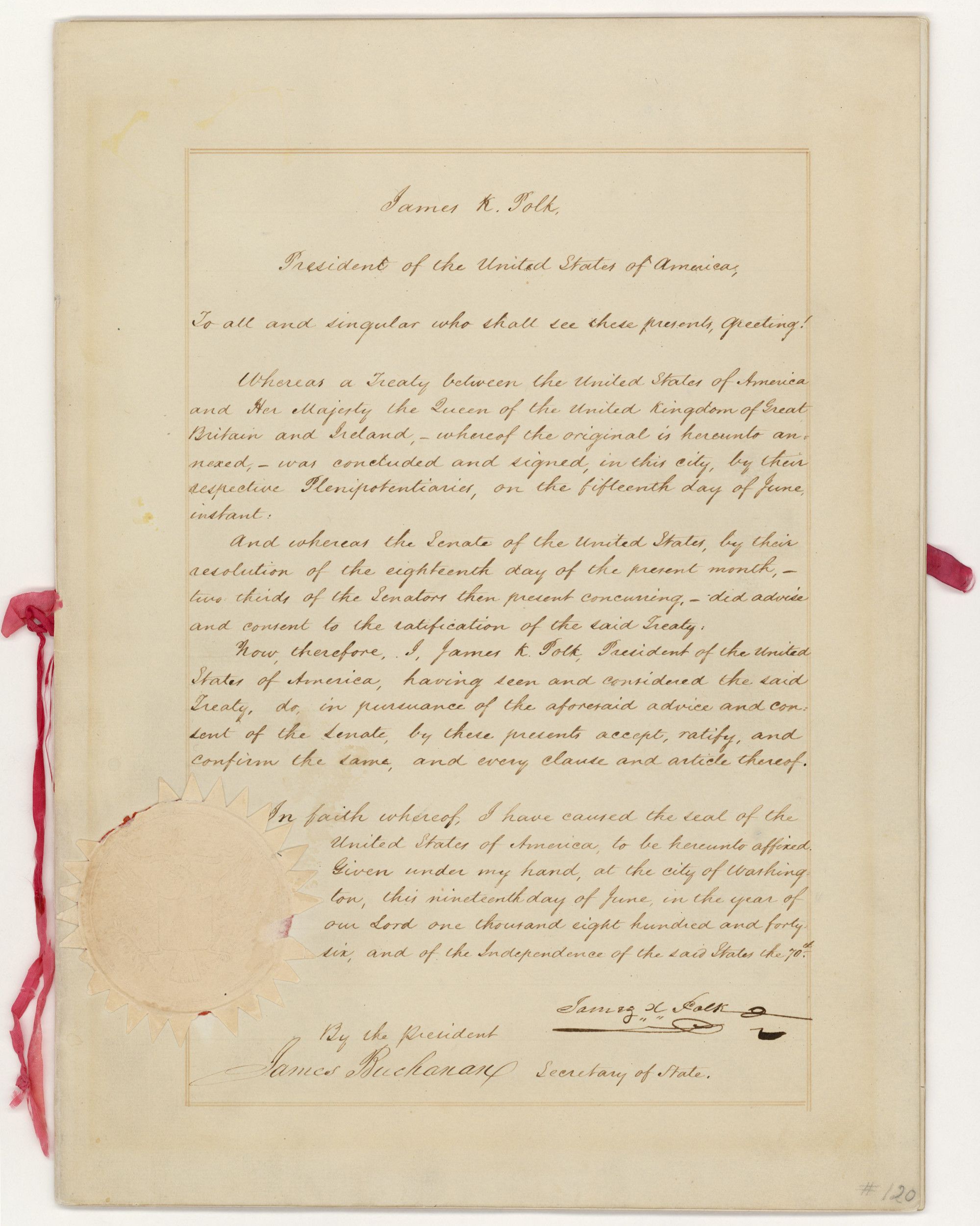
Oregon Treaty
Page 2
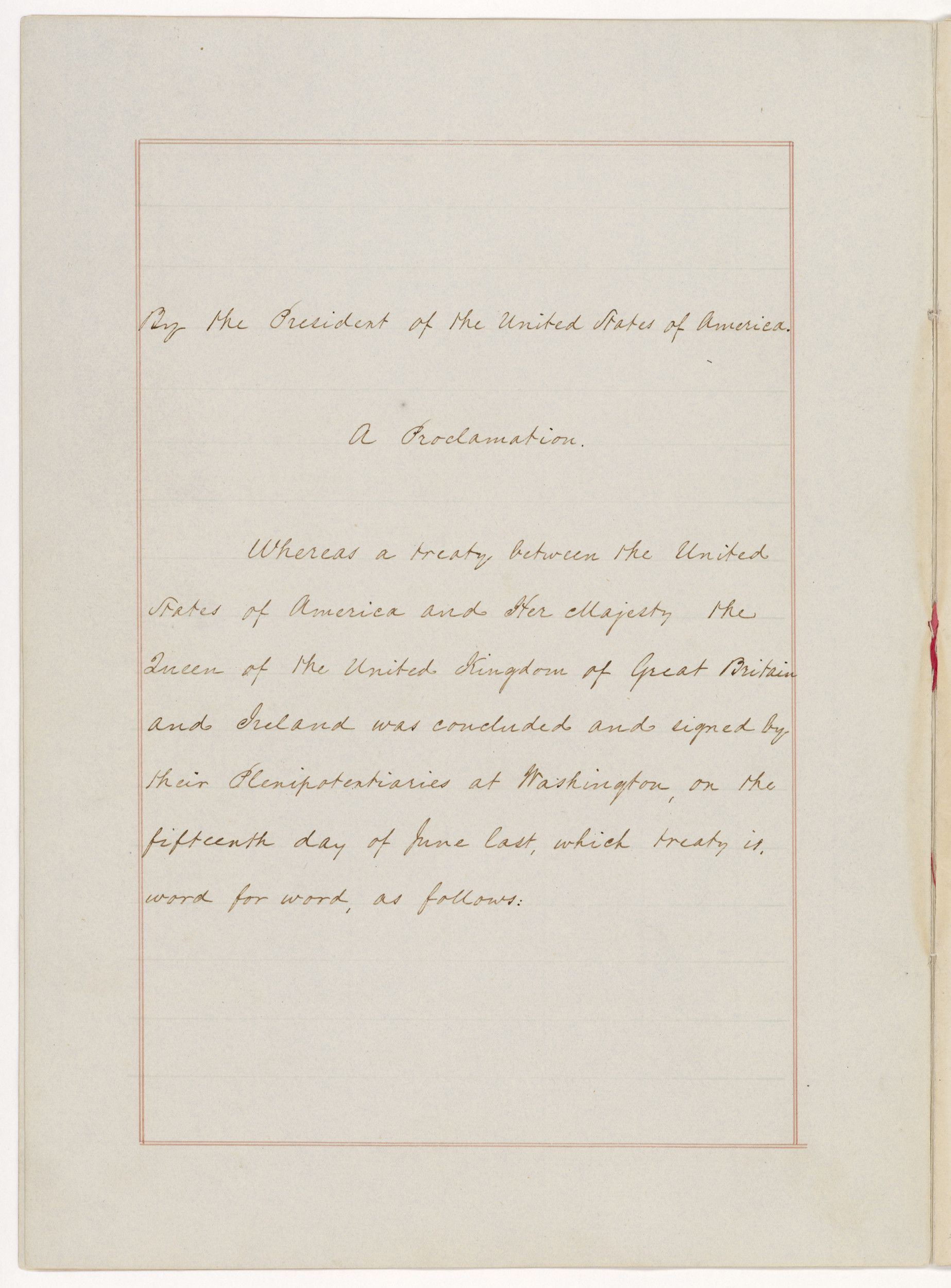
Oregon Treaty
Page 3
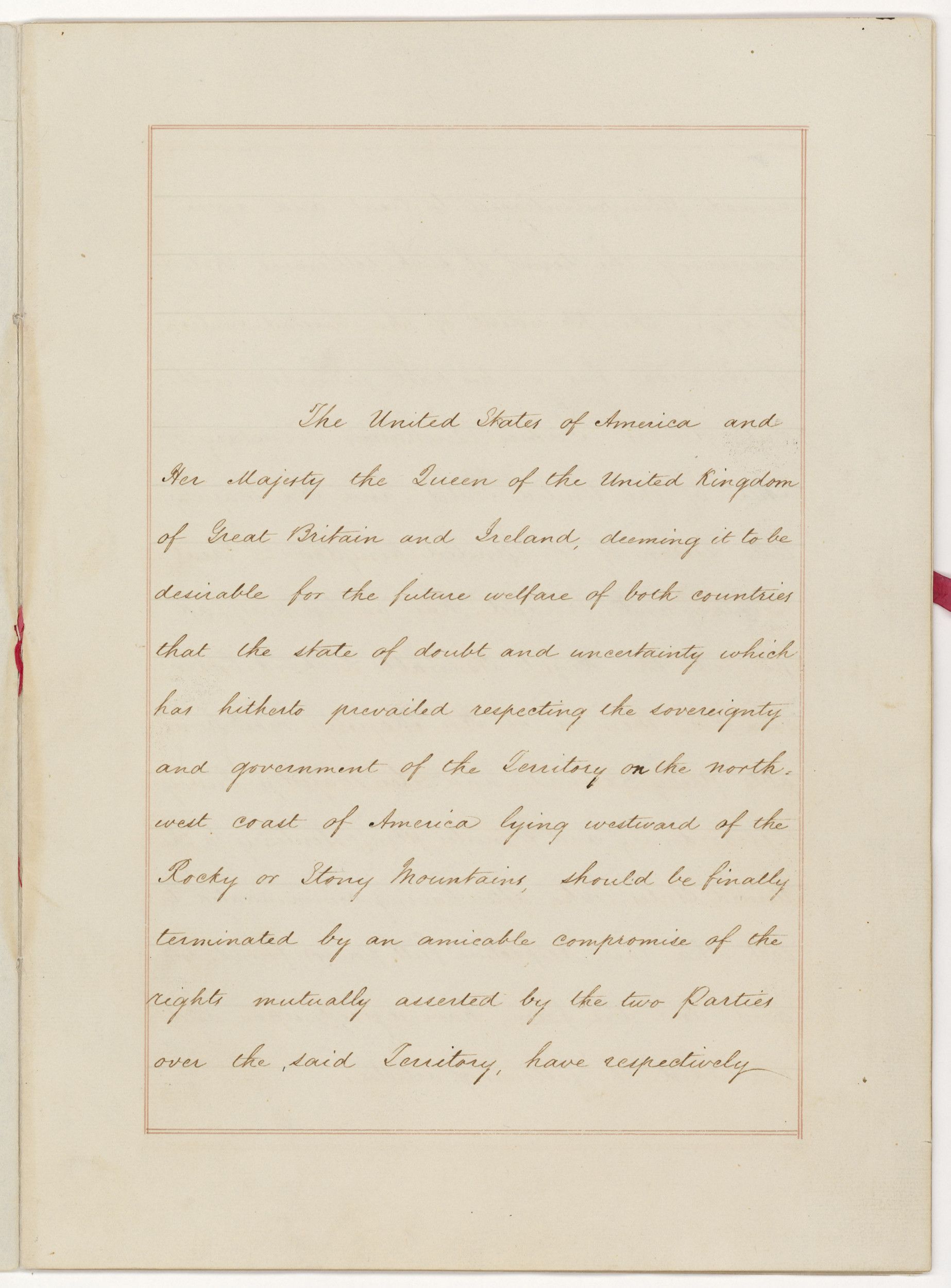
Oregon Treaty
Page 4
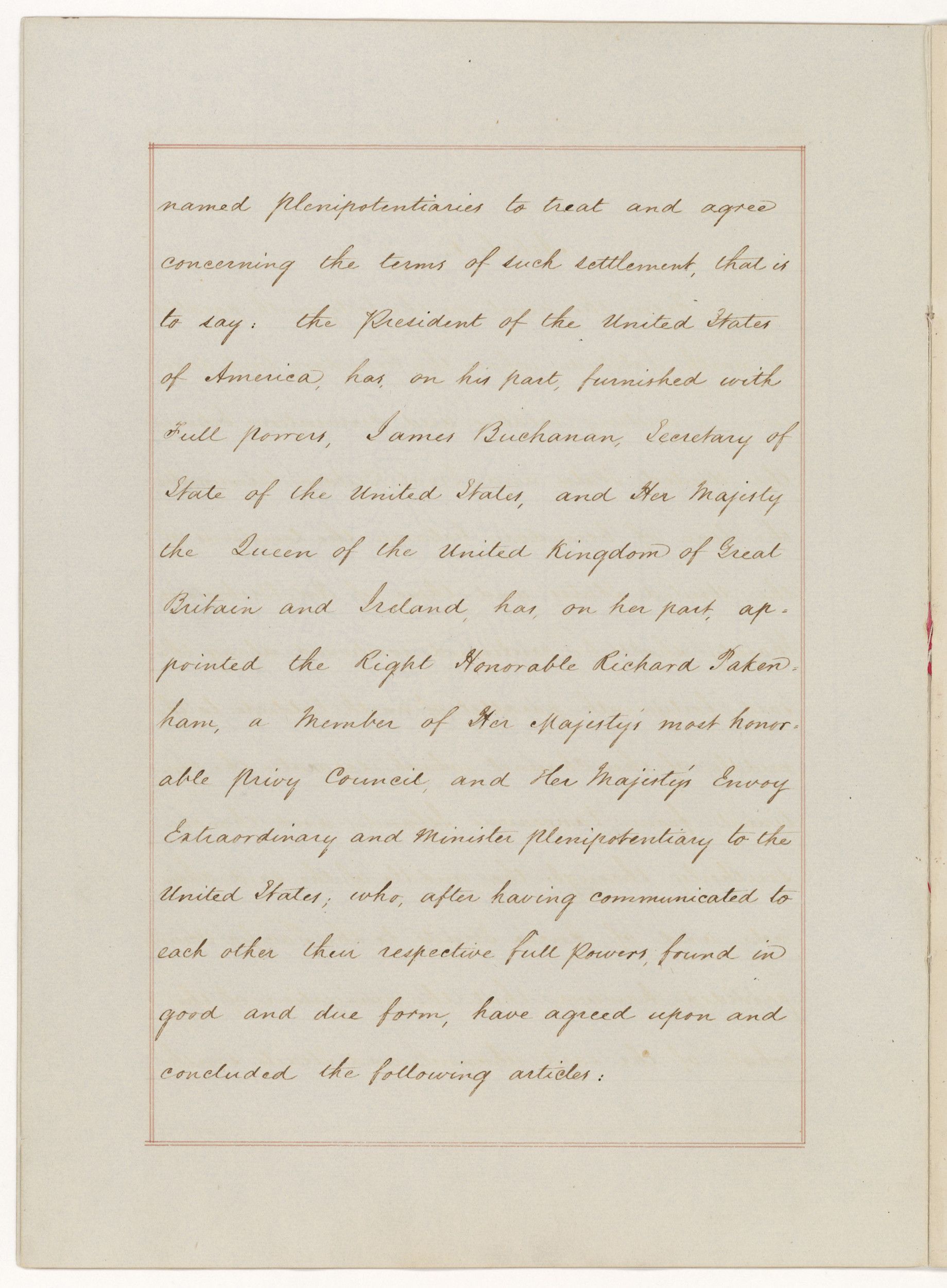
Oregon Treaty
Page 5
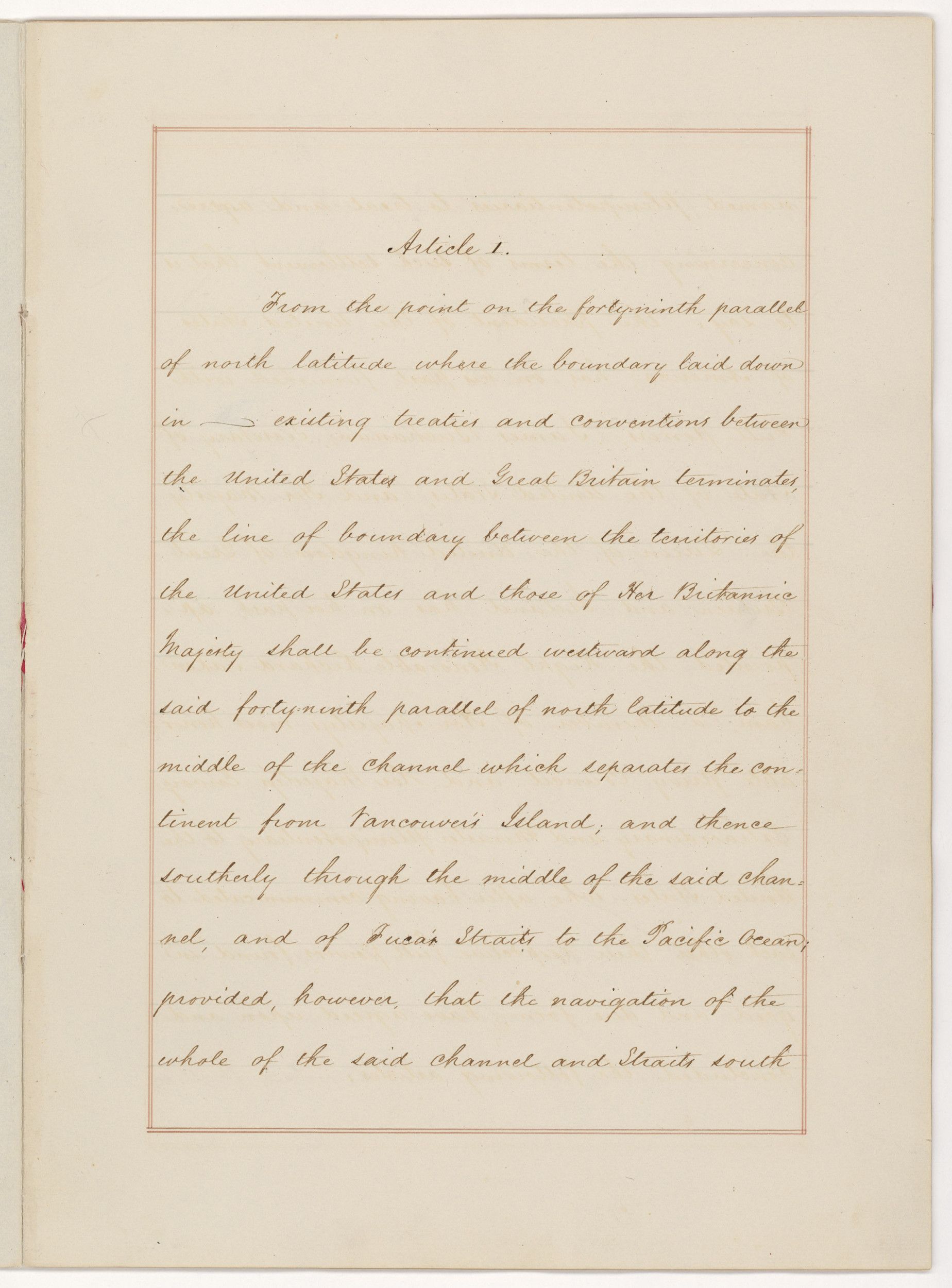
Oregon Treaty
Page 6
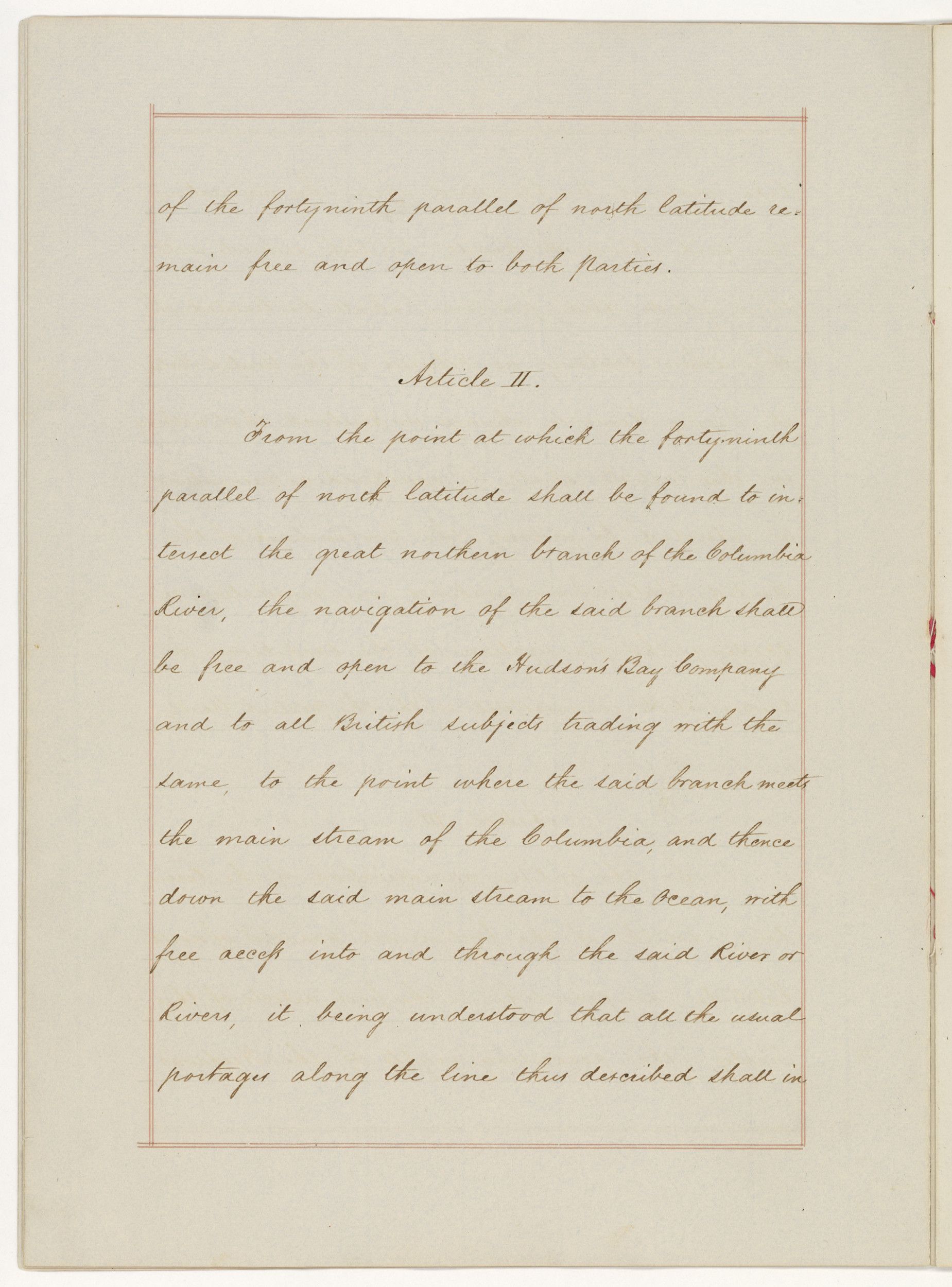
Oregon Treaty
Page 7
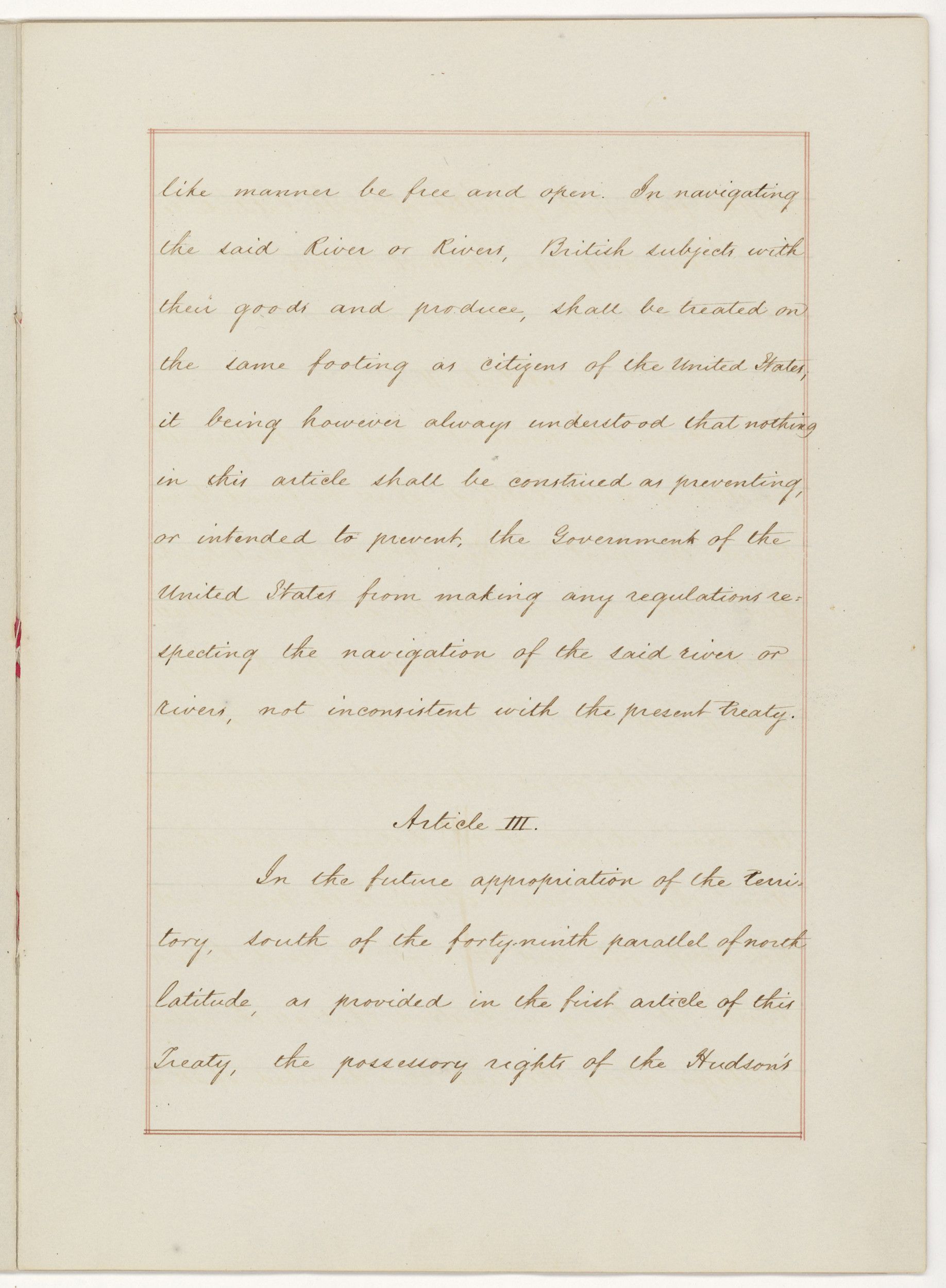
Oregon Treaty
Page 8
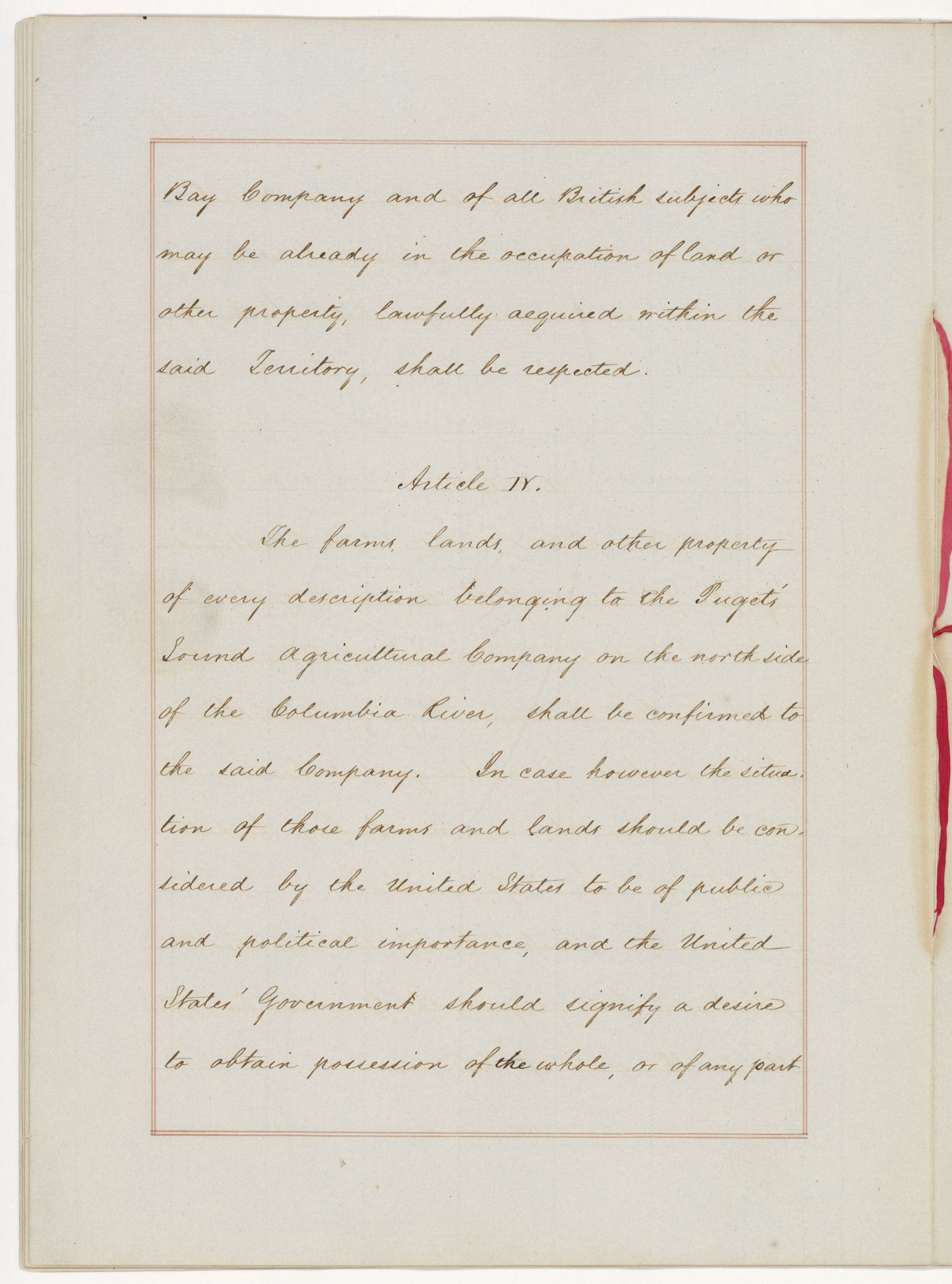
Oregon Treaty
Page 9
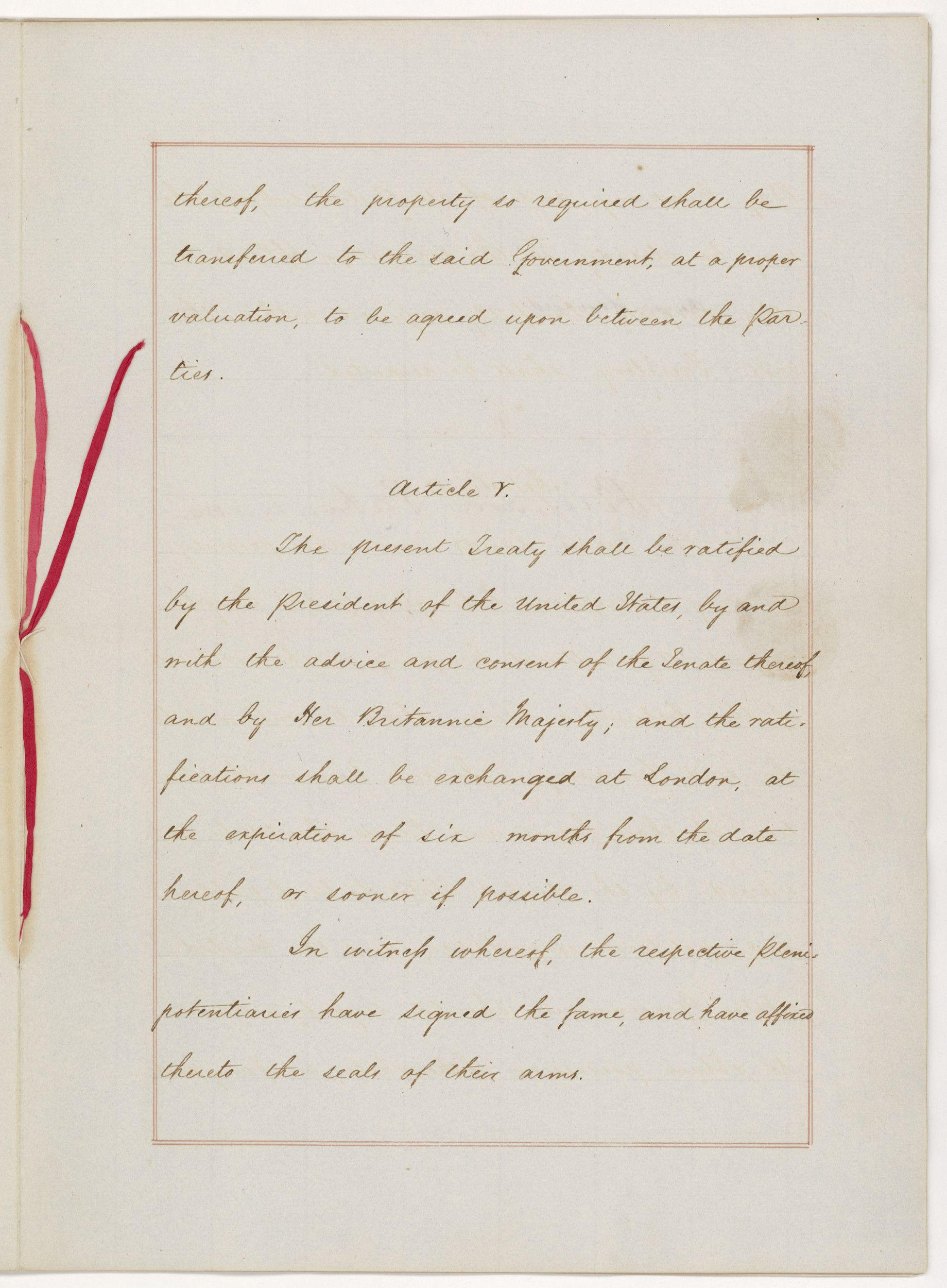
Oregon Treaty
Page 10
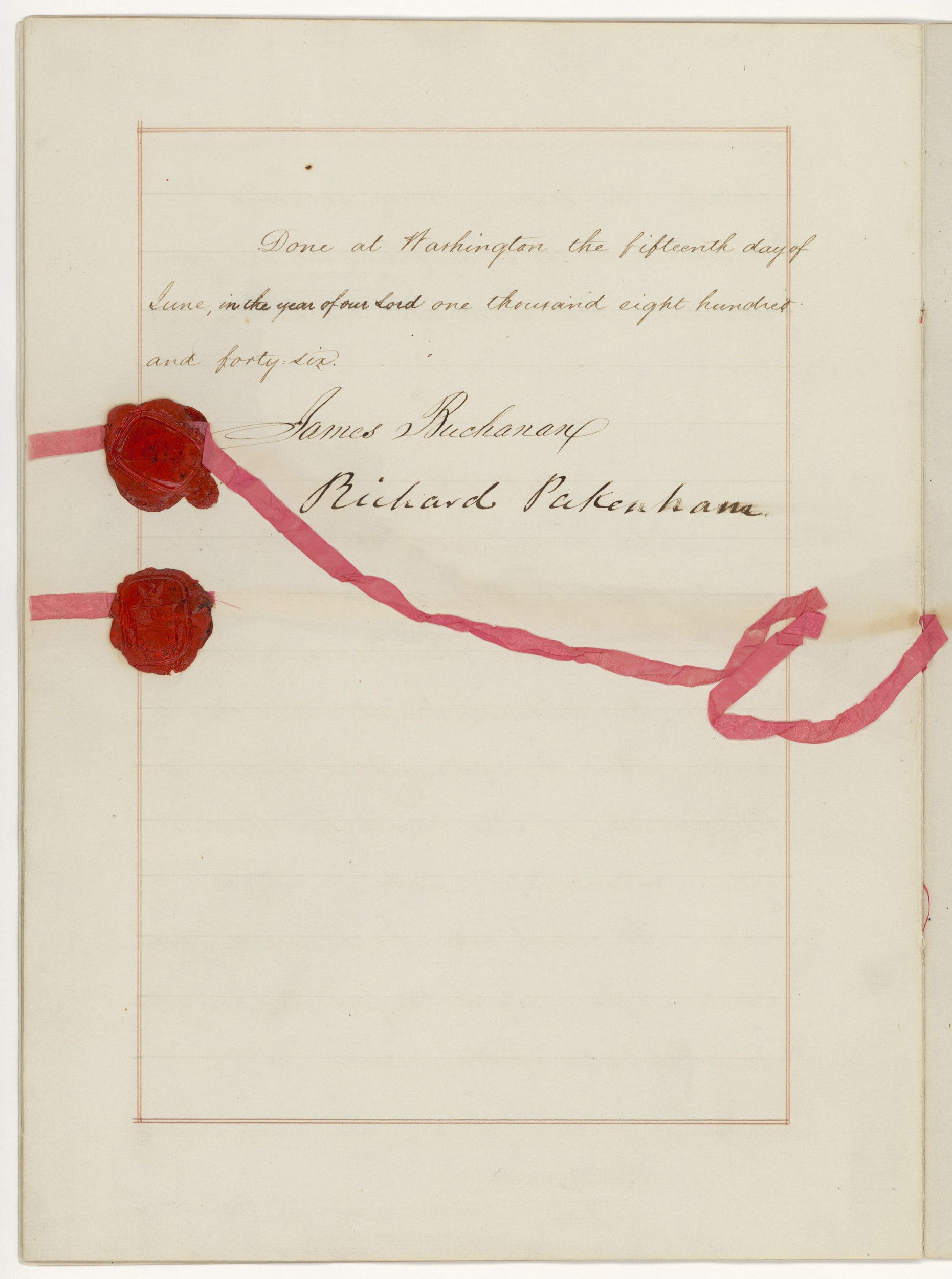
Oregon Treaty
Page 11
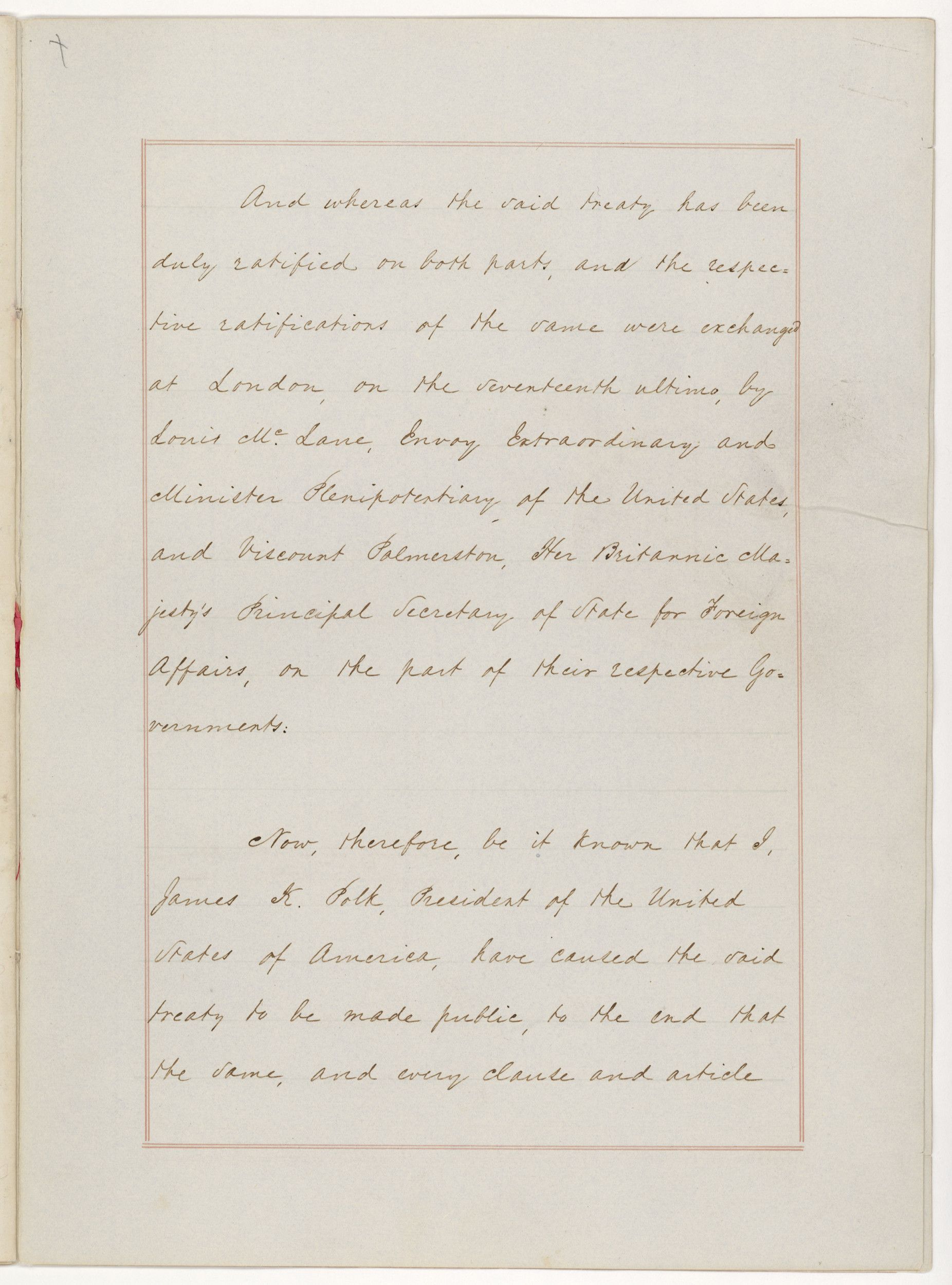
Oregon Treaty
Page 12
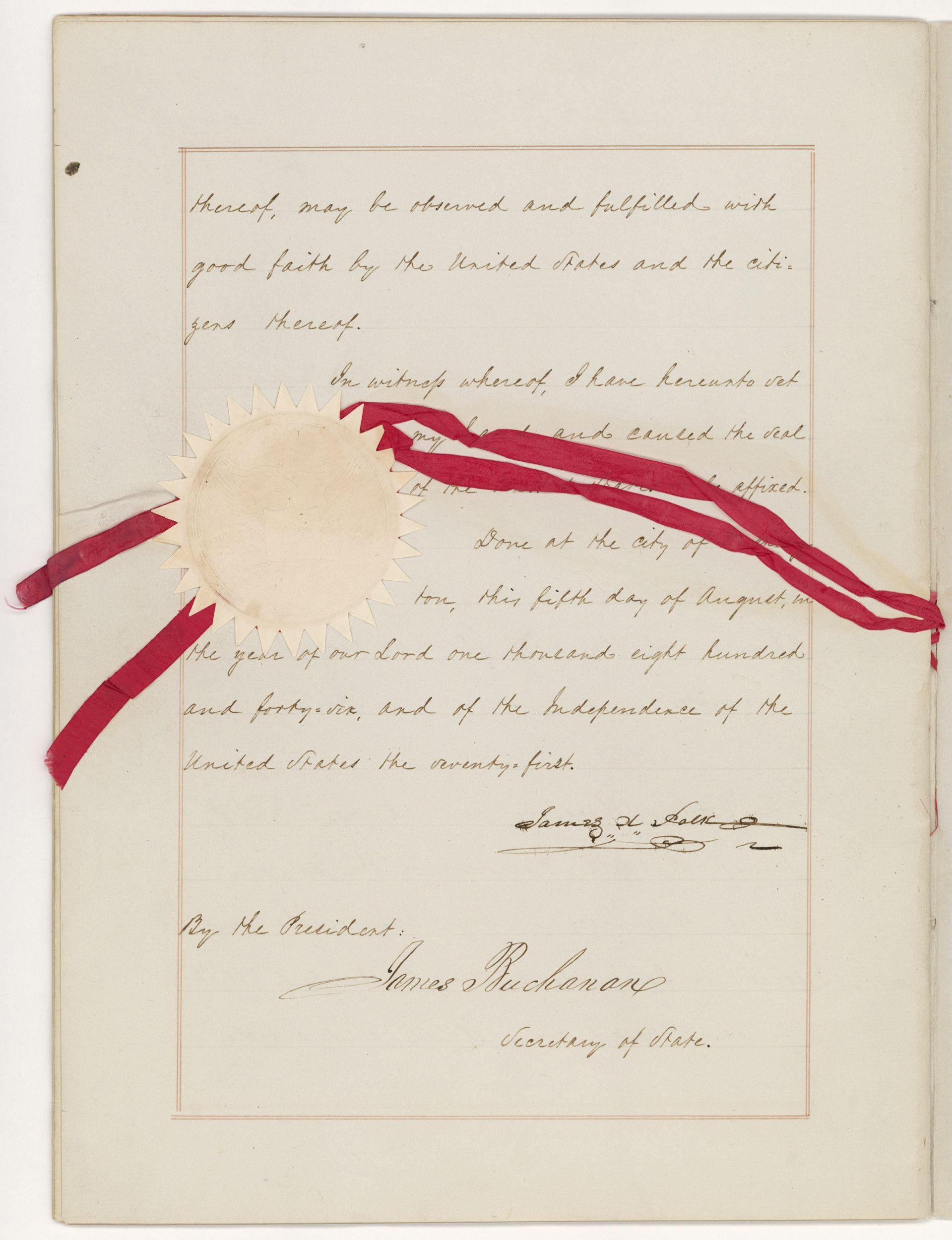
Document
Treaty of Guadalupe Hidalgo [Exchange copy]
2/2/1848
This treaty ended the Mexican-American War (1846–48). By its terms, Mexico ceded 55 percent of its territory, including the present-day states California, Nevada, Utah, New Mexico, most of Arizona and Colorado, and parts of Oklahoma, Kansas, and Wyoming. Mexico relinquished all claims to Texas, and recognized the Rio Grande as the southern boundary with the United States.
The treaty was signed on February 2, 1848, at Guadalupe Hidalgo, a city to which the Mexican government had fled with the advance of U.S. forces. This is the exchange copy of the treaty, written in both Spanish and English. This copy, given to the United States by Mexico, provides proof that the treaty was ratified by the Mexican government.
The Mexican government had surrendered to the United States and entered into negotiations to end the war after the defeat of its army and the fall of the capital, Mexico City, in September 1847. The peace talks were negotiated by Nicholas Trist, chief clerk of the State Department, who had accompanied General Winfield Scott as a diplomat and President Polk's representative. Trist and General Scott, after two previous unsuccessful attempts to negotiate a treaty with President Santa Anna, determined that the only way to deal with Mexico was as a conquered enemy. Nicholas Trist negotiated with a special commission representing the collapsed government led by Don Bernardo Couto, Don Miguel Atristain, and Don Luis Gonzaga Cuevas.
President Polk had recalled Trist in October 1847 under the belief that negotiations would be carried out with a Mexican delegation in Washington. In the six weeks it took to deliver Polk's message, Trist received word that the Mexican government had named its special commission to negotiate. Trist determined that Washington did not understand the situation in Mexico and negotiated the peace treaty in defiance of the president.
In a December 4, 1847, letter to his wife, Trist wrote, "Knowing it to be the very last chance and impressed with the dreadful consequences to our country which cannot fail to attend the loss of that chance, I decided today at noon to attempt to make a treaty; the decision is altogether my own."
Trist sent a copy to Washington, and President Polk forwarded the treaty to the Senate for their advice and consent. When the Senate reluctantly ratified the treaty (by a vote of 34 to 14) on March 10, 1848, it removed Article X guaranteeing the protection of Mexican land grants. Following the ratification, the United States withdrew its troops from the Mexican capital.
With the annexation of more than 525,000 square miles of land, the Treaty of Guadalupe Hidalgo extended the boundaries of the United States west to the Pacific Ocean. This agreement, along with the 1853 Gadsen Purchase, created the southern border of the present-day United States.
The U.S. government paid Mexico $15 million "in consideration of the extension acquired by the boundaries of the United States" and agreed to pay American citizens debts owed to them by the Mexican government. Other provisions included protection of property and civil rights of Mexican nationals living within the new boundaries of the United States, the promise of the United States to police its boundaries, and compulsory arbitration of future disputes between the two countries.
The treaty was signed on February 2, 1848, at Guadalupe Hidalgo, a city to which the Mexican government had fled with the advance of U.S. forces. This is the exchange copy of the treaty, written in both Spanish and English. This copy, given to the United States by Mexico, provides proof that the treaty was ratified by the Mexican government.
The Mexican government had surrendered to the United States and entered into negotiations to end the war after the defeat of its army and the fall of the capital, Mexico City, in September 1847. The peace talks were negotiated by Nicholas Trist, chief clerk of the State Department, who had accompanied General Winfield Scott as a diplomat and President Polk's representative. Trist and General Scott, after two previous unsuccessful attempts to negotiate a treaty with President Santa Anna, determined that the only way to deal with Mexico was as a conquered enemy. Nicholas Trist negotiated with a special commission representing the collapsed government led by Don Bernardo Couto, Don Miguel Atristain, and Don Luis Gonzaga Cuevas.
President Polk had recalled Trist in October 1847 under the belief that negotiations would be carried out with a Mexican delegation in Washington. In the six weeks it took to deliver Polk's message, Trist received word that the Mexican government had named its special commission to negotiate. Trist determined that Washington did not understand the situation in Mexico and negotiated the peace treaty in defiance of the president.
In a December 4, 1847, letter to his wife, Trist wrote, "Knowing it to be the very last chance and impressed with the dreadful consequences to our country which cannot fail to attend the loss of that chance, I decided today at noon to attempt to make a treaty; the decision is altogether my own."
Trist sent a copy to Washington, and President Polk forwarded the treaty to the Senate for their advice and consent. When the Senate reluctantly ratified the treaty (by a vote of 34 to 14) on March 10, 1848, it removed Article X guaranteeing the protection of Mexican land grants. Following the ratification, the United States withdrew its troops from the Mexican capital.
With the annexation of more than 525,000 square miles of land, the Treaty of Guadalupe Hidalgo extended the boundaries of the United States west to the Pacific Ocean. This agreement, along with the 1853 Gadsen Purchase, created the southern border of the present-day United States.
The U.S. government paid Mexico $15 million "in consideration of the extension acquired by the boundaries of the United States" and agreed to pay American citizens debts owed to them by the Mexican government. Other provisions included protection of property and civil rights of Mexican nationals living within the new boundaries of the United States, the promise of the United States to police its boundaries, and compulsory arbitration of future disputes between the two countries.
Transcript
Manuel de la Peña y Peña. Presidente interino de los Estados Unidos MexicanosA todos los que las presentes vieren sabed: Que en la ciudad de Guadalupe Hidalgo se concluyó y firmó el día dos de febrero del presente año, un Tratado de paz, amistad, límites y arreglo definitivo entre los Estados Unidos Mexicanos y los Estados Unidos de América por medio de Plenipotenciarios de ambos Gobiernos autorizados debida y respectivamente para este efecto, cuyo Tratado y su artículo adicional son en la forma y tenor siguiente.
[left side in Spanish:]
En el nombre de Dios Todopoderoso: Los Estados Unidos Mexicanos y los Estados Unidos de América, animados de un sincero deseo de poner término a las calamidades de la guerra que desgraciadamente existe entre ambas Repúblicas, y de establecer sobre bases sólidas relaciones de paz y buena amistad, que procuren recíprocas ventajas a los ciudadanos de uno y otro país, y afiancen la concordia, armonía
[right side in English:]
In the name of Almighty God:
The United States of America and the United Mexican States, animated by a sincere desire to put an end to the calamities of the war which unhappily exists between the two republics, and to establish upon a solid basis relations of peace and friendship, which shall confer reciprocal benefits upon the citizens of both, and assure the concord, harmony, and mutual confidence
[left page, left side in Spanish:]
y mutua seguridad en que deben vivir, como buenos vecinos, los dos pueblos; han nombrado a este efecto sus respectivos plenipotenciarios, a saber: el Presidente de la República mexicana a don Bernardo Couto, don Miguel Atristain, y don Luis Gonzaga Cuevas, ciudadanos de la misma República; y el Presidente de los Estados Unidos de América a don Nicolás P. Trist, ciudadano de dichos Estados; quienes después de haberse comunicado sus plenos poderes, bajo la protección del Señor Dios Todopoderoso, Autor de la paz, han ajustado, convenido y firmado el siguiente
Tratado de paz, amistad, límites y arreglo definitivo entre la República mexicana y los Estados Unidos de América.
Artículo I
Habrá paz firme y universal entre la Republica Mexicana y los Estados Unidos de América, y
[left page, right side in English:]
wherein the two people should live, as good neighbors have for that purpose appointed their respective plenipotentiaries, that is to say: The President of the United States has appointed Nicholas P. Trist, a citizen of the United States, and the President of the Mexican Republic has appointed Don Luis Gonzaga Cuevas, Don Bernardo Couto, and Don Miguel Atristain, citizens of the said Republic; Who, after a reciprocal communication of their respective full powers, have, under the protection of Almighty God, the author of peace, arranged, agreed upon, and signed the following:
Treaty of peace, friendship, limits, and settlement between the United States of America and the Mexican Republic.
Article I
There shall be firm and universal peace between the United States of America and the Mexican Republic,
[right page, left side in Spanish:]
entre sus respectivos países, territorios, ciudades, villas, y pueblos sin excepción de lugares o personas.
Artículo II
Luego que se firme el presente Tratado, habrá un convenio entre el comisionado o comisionados del Gobierno mexicano, y el o los que nombre el general en jefe de las fuerzas de los Estados Unidos, para que cesen provisionalmente las hostilidades, y se restablezca en los lugares ocupados por las mismas fuerzas el orden constitucional en lo político, administrativo y judicial, en cuanto lo permitan las circunstancias de ocupación militar.
[right page, right side in English:]
and between their respective countries, territories, cities, towns, and people, without exception of places or persons.
Article II
Immediately upon the signature of this treaty, a convention shall be entered into between a commissioner or commissioners appointed by the General-in-chief of the forces of the United States, and such as may be appointed by the Mexican Government, to the end that a provisional suspension of hostilities shall take place, and that, in the places occupied by the said forces, constitutional order may be re-established, as regards the political, administrative, and judicial branches, so far as this shall be permitted by the circumstances of military occupation.
[left page, left side in Spanish:]
Artículo III
Luego que este Tratado sea ratificado por el Gobierno de los Estados Unidos, se expedirán órdenes a sus comandantes de tierra y mar, previniendo a estos segundos (siempre que el Tratado haya sido ya ratificado por el Gobierno de la República mexicana) que inmediatamente alcen el bloqueo de todos los puertos mexicanos; y mandando a los primeros (bajo la misma condición) que a la mayor posible brevedad comiencen a retirar todas las tropas de los Estados Unidos que se hallaren entonces en el interior de la República mexicana, a puntos que se elegirán de común acuerdo, y que no distarán de los puertos más de treinta leguas: esta evacuación del interior de la República se consumará con la
[left page, right side in English:]
Article III
Immediately upon the ratification of the present treaty by the Government of the United States, orders shall be transmitted to the commanders of their land and naval forces, requiring the latter (provided this treaty shall then have been ratified by the Government of the Mexican Republic, and the ratifications exchanged) immediately to desist from blockading any Mexican ports and requiring the former (under the same condition) to commence, at the earliest moment practicable, withdrawing all troops of the United States then in the interior of the Mexican Republic, to points that shall be selected by common agreement, at a distance from the seaports not exceeding thirty leagues; and such evacuation of the interior of the Republic shall be completed with
[right page, left side in Spanish:]
menor dilación posible, comprometiéndose a la vez el gobierno mexicano a facilitar, cuanto quepa en su arbitrio, la evacuación de las tropas americanas, a hacer cómoda su marcha y su permanencia en los nuevos puntos que se elijan; y a promover una buena inteligencia entre ellas y los habitantes. Igualmente se librarán órdenes a las personas encargadas de las aduanas marítimas en todos los puertos ocupados por las fuerzas de los Estados Unidos, previniéndoles (bajo la misma condición) que pongan inmediatamente en posesión de dichas aduanas a las personas autorizadas por el Gobierno mexicano para recibirlas, entregándoles al mismo tiempo todas las obligaciones y constancias de deudas pendientes por dere-
[right page, right side in English:]
the least possible delay; the Mexican Government hereby binding itself to afford every facility in its power for rendering the same convenient to the troops, on their march and in their new positions, and for promoting a good understanding between them and the inhabitants. In like manner orders shall be despatched to the persons in charge of the custom houses at all ports occupied by the forces of the United States, requiring them (under the same condition) immediately to deliver possession of the same to the persons authorized by the Mexican Government to receive it, together with all bonds and evidences of debt for duties on importations and on exportations, not yet fallen due. Moreover, a faithful and exact
[left page, left side in Spanish:]
chos de importación y exportación, cuyos plazos no estén vencidos.
Además se formará una cuenta fiel y exacta que manifieste el total monto de los derechos de importación y exportación recaudados en las mismas aduanas marítimas o en cualquiera otro lugar de México, por autoridad de los Estados Unidos, desde el día de la ratificación de este Tratado por el Gobierno de la República mexicana, y también una cuenta de los gastos de recaudación; y la total suma de los derechos cobrados, deducidos solamente los gastos de recaudación, se entregará al Gobierno mexicano en la ciudad de México a los tres meses del canje de las ratificaciones.
La evacuación de la capital de la República mexicana
[left page, right side in English:]
account shall be made out, showing the entire amount of all duties on imports and on exports, collected at such custom-houses, or elsewhere in Mexico, by authority of the United States, from and after the day of ratification of this treaty by the Government of the Mexican Republic; and also an account of the cost of collection; and such entire amount, deducting only the cost of collection, shall be delivered to the Mexican Government, at the city of Mexico, within three months after the exchange of ratifications.
The evacuation of the capital of the Mexican Republic by
[right page, left side in Spanish:]
por las tropas de los Estados Unidos, en consecuencia de lo que queda estipulado, se completará al mes de recibirse por el comandante de dichas tropas las órdenes convenidas en el presente artículo, o antes si fuere posible.
Artículo IV
Luego que se verifique el canje de las ratificaciones del presente Tratado, todos los castillos, fortalezas, territorios, lugares y posesiones que hayan tomado u ocupado las fuerzas de los Estados Unidos en la presente guerra, dentro de los límites que por el siguiente artículo van a fijarse a la República mexicana, se devolverán definitivamente a la misma República con toda la artillería, armas, aparejos
[right page, right side in English:]
the troops of the United States, in virtue of the above stipulation, shall be completed in one month after the orders there stipulated for shall have been received by the commander of said troops, or sooner if possible.
Article IV
Immediately after the exchange of ratifications of the present treaty all castles, forts, territories, places, and possessions, which have been taken or occupied by the forces of the United States during the present war, within the limits of the Mexican Republic, as about to be established by the following article, shall be definitely restored to the said Republic, together with all the artillery, arms, apparatus
[left page, left side in Spanish:]
de guerra, municiones, y cualquiera otra propiedad pública existente en dichos castillos y fortalezas cuando fueron tomados, y que se conserve en ellos al tiempo de ratificarse por el Gobierno de la República mexicana el presente Tratado. A este efecto, inmediatamente después que se firme, se expedirán órdenes a los oficiales americanos que mandan dichos castillos y fortalezas, para asegurar toda la artillería, armas, aparejos de guerra, municiones, y cualquiera otra propiedad pública, la cual no podrá en adelante removerse de donde se halla, ni destruirse. La ciudad de México, dentro de la línea interior de atrincheramientos que la circundan, queda comprendida en la
[left page, right side in English:]
of war, munitions, and other public property, which were in the said castles and forts when captured, and which shall remain there at the time when this treaty shall be duly ratified by the Government of the Mexican Republic. To this end, immediately upon the signature of this treaty, orders shall be despatched to the American officers commanding such castles and forts, securing against the removal or destruction of any such artillery, arms, apparatus of war, munitions, or other public property. The city of Mexico, within the inner line of intrenchments surrounding the said city, is comprehended in the above stipulation, as regards the restoration
[right page, left side in Spanish:]
precedente estipulación, en lo que toca a la devolución de artillería, aparejos de guerra, etc.
La final evacuación del territorio de la República mexicana por las fuerzas de los Estados Unidos, quedará consumada a los tres meses del canje de las ratificaciones, o antes si fuere posible; comprometiéndose a la vez el Gobierno mexicano, como en el artículo anterior, a usar de todos los medios que estén en su poder para facilitar la total evacuación, hacerla cómoda a las tropas americanas, y promover entre ellas y los habitantes una buena inteligencia.
Sin embargo, si la ratificación del presente Tratado por ambas partes no tuviere efecto en tiempo que permita que el embarque de las
[right page, right side in English:]
of artillery, apparatus of war, etc.
The final evacuation of the territory of the Mexican Republic, by the forces of the United States, shall be completed in three months from the said exchange of ratifications, or sooner if possible; the Mexican Government hereby engaging, as in the foregoing article to use all means in its power for facilitating such evacuation, and rendering it convenient to the troops, and for promoting a good understanding between them and the inhabitants.
If, however, the ratification of this treaty by both parties should not take place in time to allow the embarcation of the troops of the United
[left page, left side in Spanish:]
tropas de los Estados Unidos se complete antes de que comience la estación mal sana en los puertos mexicanos del golfo de México; en tal caso se hará un arreglo amistoso entre el Gobierno mexicano y el general en jefe de dichas tropas, y por medio de este arreglo se señalarán lugares salubres y convenientes (que no disten de los puertos más de treinta leguas) para que residan en ellos hasta la vuelta de la estación sana, las tropas que aún no se hayan embarcado. Y queda entendido que el espacio de tiempo de que aquí se habla, como comprensivo de la estación mal sana, se extiende desde el día primero de mayo hasta el día primero de noviembre.
Todos los prisioneros de
[left page, right side in English:]
States to be completed before the commencement of the sickly season, at the Mexican ports on the Gulf of Mexico, in such case a friendly arrangement shall be entered into between the General-in-Chief of the said troops and the Mexican Government, whereby healthy and otherwise suitable places, at a distance from the ports not exceeding thirty leagues, shall be designated for the residence of such troops as may not yet have embarked, until the return of the healthy season. And the space of time here referred to as, comprehending the sickly season shall be understood to extend from the first day of May to the first day of November.
All prisoners of war
[right page, left side in Spanish:]
guerra tomados en mar o tierra por ambas partes, se restituirán a la mayor brevedad posible después del canje de las ratificaciones del presente Tratado. Queda también convenido que si algunos mexicanos estuvieren ahora cautivos en poder de alguna tribu salvaje dentro de los límites que por el siguiente artículo van a fijarse a los Estados Unidos, el Gobierno de los mismos Estados Unidos exigirá su libertad, y los hará restituir a su país.
Artículo V
La línea divisoria entre las dos Repúblicas comenzará en el golfo de México, tres leguas fuera de tierra frente a la desembocadura del río Grande, llamado por otro nombre río Bravo del Norte,
[right page, right side in English:]
taken on either side, on land or on sea, shall be restored as soon as practicable after the exchange of ratifications of this treaty. It is also agreed that if any Mexicans should now be held as captives by any savage tribe within the limits of the United States, as about to be established by the following article, the Government of the said United States will exact the release of such captives and cause them to be restored to their country.
Article V
The boundary line between the two Republics shall commence in the Gulf of Mexico, three leagues from land, opposite the mouth of the Rio Grande, otherwise called Rio Bravo del Norte, or opposite
[left page, left side in Spanish:]
o del más profundo de sus brazos, si en la desembocadura tuviere varios brazos: correrá por mitad de dicho río, siguiendo el canal más profundo donde tenga más de un canal, hasta el punto en que dicho río corta el lindero meridional de Nuevo México: continuará luego hacia Occidente, por todo este lindero meridional (que corre al norte del pueblo llamado Paso) hasta su término por el lado de Occidente: desde allí subirá la línea divisoria hacia el Norte, por el lindero occidental de Nuevo México, hasta donde este lindero esté cortado por el primer brazo del río Gila (y si eso no está cortado por ningún brazo del río Gila, entonces hasta el punto del mismo lindero occidental más cercano al tal brazo, y de allí en una línea recta al
[left page, right side in English:]
the mouth of its deepest branch, if it should have more than one branch emptying directly into the sea; from thence up the middle of that river, following the deepest channel, where it has more than one, to the point where it strikes the southern boundary of New Mexico; thence, westwardly, along the whole southern boundary of New Mexico (which runs north of the town called Paso) to its western termination; thence, northward, along the western line of New Mexico, until it intersects the first branch of the river Gila; (or if it should not intersect any branch of that river, then to the point on the said line nearest to such branch, and thence in a direct line to the same); thence down the middle of the said branch
[right page, left side in Spanish:]
mismo brazo); continuará después por mitad de este brazo y del río Gila hasta su confluencia con el río Colorado; y desde la confluencia de ambos ríos la línea divisoria, cortando el Colorado, seguirá el límite que separa la Alta de la Baja California hasta el mar Pacífico.
Los linderos meridional y occidental de Nuevo México de que habla este artículo, son los que se marcan en la carta titulada: "Mapa de los Estados Unidos de México, según lo organizado y definido por las varias actas del Congreso de dicha República, y construido por las mejores autoridades: edición revisada que publicó en Nueva York en 1847, J. Disturnell," de la cual se agrega un ejemplar al presente Tratado, firmado y sellado por los plenipotenciarios infraos. Y para evitar toda dificultad al
[right page, right side in English:]
and of the said river, until it empties into the Rio Colorado; thence across the Rio Colorado, following the division line between Upper and Lower California, to the Pacific Ocean.
The southern and western limits of New Mexico, mentioned in the article, are those laid down in the map entitled "Map of the United Mexican States, as organized and defined by various acts of the Congress of said republic, and constructed according to the best authorities. Revised edition. Published at New York, in 1847, by J. Disturnell," of which map a copy is added to this treaty, bearing the signatures and seals of the undersigned plenipotentiaries. And, in order to preclude all
[left page, left side in Spanish:]
trazar sobre la tierra el límite ue separa la Alta de la Baja California, queda convenido que dicho límite consistirá en una línea recta, tirada desde la mitad del río Gila en el punto donde se une con el Colorado, hasta un punto en la costa del mar Pacífico, distante una legua marina al Sur del punto más meridional del puerto de San Diego, según este puerto está dibujado en el plano que levantó el año de 1782 el segundo piloto de la armada española don Juan Pantoja, y se publicó en Madrid el de 1802 en el Atlas para el viaje de las goletas Sutil y Mexicana , del cual plano se agarra copia firmada y sellada por los plenipotenciarios respectivos.
Para consignar la línea divisoria con la precisión debida, en
[left page, right side in Engish:]
difficulty in tracing upon the ground the limit separating Upper from Lower California, it is agreed that the said limit shall consist of a straight line drawn from the middle of the Rio Gila, where it unites with the Colorado, to a point on the coast of the Pacific Ocean, distant one marine league due south of the southernmost point of the port of San Diego, according to the plan of said port made in the year 1782 by Don Juan Pantoja, second sailing-master of the Spanish fleet, and published at Madrid in the year 1802, in the atlas to the voyage of the schooners Sutil and Mexicana; of which plan a copy is hereunto added, signed and sealed by the respective plenipotentiaries.
In order to designate the boundary line with due precision,
[right page, left side in Spanish:]
mapas fehacientes, y para establecer sobre la tierra mojones que pongan a la vista los límites de ambas Repúblicas, según quedan descritos en el presente artículo, nombrará cada uno de los dos Gobiernos un comisario y un agrimensor que se juntarán antes del término de un año, contado desde la fecha del canje de las ratificaciones de este Tratado, en el puerto de San Diego, y procederán a señalar y demarcar la expresada línea divisoria en todo su curso, hasta la desembocadura del río Bravo del Norte. Llevarán diarios, y levantarán planos de sus operaciones; y el resultado convenido por ellos se tendrá por parte de este Tratado, y tendrá la misma fuerza que si estuviese inserto en él; debiendo
[right page, right side in English:]
upon authoritative maps, and to establish upon the ground land-marks which shall show the limits of both republics, as described in the present article, the two Governments shall each appoint a commissioner and a surveyor, who, before the expiration of one year from the date of the exchange of ratifications of this treaty, shall meet at the port of San Diego, and proceed to run and mark the said boundary in its whole course to the mouth of the Rio Bravo del Norte. They shall keep journals and make out plans of their operations; and the result agreed upon by them shall be deemed a part of this treaty, and shall have the same force as if it were inserted therein. The two Governments will amicably
[left page, left side in Spanish:]
convenir amistosamente los dos Gobiernos en el arreglo de cuanto necesiten estos individuos, y en la escolta respectiva que deban llevar, siempre que se crea necesario.
La línea divisoria que se establece por este artículo, será religiosamente respetada por cada una de las dos Repúblicas; y ninguna variación se hará jamás en ella, sino de expreso y libre consentimiento de ambas naciones, otorgado legalmente por el Gobierno general de cada una de ellas, con arreglo a su propia constitución.
Artículo VI
Los buques y ciudadanos de los Estados Unidos tendrán en todo tiempo un libre y no interrumpido tránsito por el golfo de California y por el río
[left page, right side in English:]
agree regarding what may be necessary to these persons, and also as to their respective escorts, should such be necessary.
The boundary line established by this article shall be religiously respected by each of the two republics, and no change shall ever be made therein, except by the express and free consent of both nations, lawfully given by the General Government of each, in conformity with its own constitution.
Article VI
The vessels and citizens of the United States shall, in all time, have a free and uninterrupted passage by the Gulf of California, and by the
[right page, left side in Spanish:]
Colorado desde su confluencia con el Gila, para sus posesiones, y desde sus posesiones sitas al Norte de la línea divisoria que queda marcada en el artículo precedente; entendiéndose que este tránsito se ha de hacer navegando por el golfo de California y por el río Colorado, y no por tierra, sin expreso consentimiento del Gobierno mexicano.
Si por reconocimientos que se practiquen, se comprobare la posibilidad y conveniencia de construir un camino, canal o ferrocarril, que en todo o en parte sobre el río Gila o sobre alguna de sus márgenes derecha o izquierda, en la latitud de una legua marina de uno o de otro lado del río, los Gobiernos de ambas Repúblicas se pondrán
[right page, right side in English:]
river Colorado below its confluence with the Gila, to and from their possessions situated north of the boundary line defined in the preceding article; it being understood that this passage is to be by navigating the Gulf of California and the river Colorado, and not by land, without the express consent of the Mexican Government.
If, by the examinations which may be made, it should be ascertained to be practicable and advantageous to construct a road, canal, or railway, which should in whole or in part run upon the river Gila, or upon its right or its left bank, within the space of one marine league from either margin of the river, the Governments of both republics will form an agreement regarding
[left page, left side in Spanish:]
de acuerdo sobre su construcción, a fin de que sirva igualmente para el uso y provecho de ambos países.
Artículo VII
Como el río Gila y la parte del río Bravo del Norte que corre bajo el lindero meridional de Nuevo México, se dividen por mitad entre las dos Repúblicas, según lo establecido en el artículo quinto; la navegación en el Gila y en la parte que queda indicada del Bravo, será libre y común a los buques y ciudadanos de ambos países, sin que por alguno de ellos pueda hacerse (sin consentimiento del otro) ninguna obra que impida o interrumpa en todo o en parte el ejercicio de este derecho, ni aun con motivo de favorecer nuevos métodos de
[left page, right side in English:]
its construction, in order that it may serve equally for the use and advantage of both countries.
Article VII
The river Gila, and the part of the Rio Bravo del Norte lying below the southern boundary of New Mexico, being, agreeably to the fifth article, divided in the middle between the two republics, the navigation of the Gila and of the Bravo below said boundary shall be free and common to the vessels and citizens of both countries; and neither shall, without the consent of the other, construct any work that may impede or interrupt, in whole or in part, the exercise of this right; not even for the purpose of favoring new methods of navigation. Nor shall
[right page, left side in Spanish:]
navegación. Tampoco se podrá cobrar (sino en el caso de desembarco en alguna de sus riberas) ningún impuesto o contribución, bajo ninguna denominación o título, a los buques, efectos, mercancías o personas que naveguen en dichos ríos. Si para hacerlos o mantenerlos navegables, fuere necesario o conveniente establecer alguna contribución o impuesto, no podrá esto hacerse sin el consentimiento de los dos Gobiernos.
Las estipulaciones contenidas en el presente artículo, dejan ilesos los derechos territoriales de una y otra República dentro de los límites que les quedan marcados.
[right page, right side in English:]
any tax or contribution, under any denomination or title, be levied upon vessels or persons navigating the same or upon merchandise or effects transported thereon, except in the case of landing upon one of their shores. If, for the purpose of making the said rivers navigable, or for maintaining them in such state, it should be necessary or advantageous to establish any tax or contribution, this shall not be done without the consent of both Governments.
The stipulations contained in the present article shall not impair the territorial rights of either republic within its established limits.
[left page, left side in Spanish:]
Artículo VIII
Los mexicanos establecidos hoy en territorios pertenecientes antes a México y que quedan para lo futuro dentro de los límites señalados por el presente Tratado a los Estados Unidos, podrán permanecer en donde ahora habitan; o trasladarse en cualquier tiempo a la República mexicana, conservando en los indicados territorios los bienes que poseen, o enajenándolos y pasando su valor a donde les convenga, sin que por esto pueda exigírseles ningún género de contribución, gravamen o impuesto.
Los que prefieran permanecer en los indicados territorios podrán conservar el título y derechos de ciudadanos de los Estados Unidos.
[left page, right side in English:]
Article VIII
Mexicans now established in territories previously belonging to Mexico, and which remain for the future within the limits of the United States, as defined by the present treaty, shall be free to continue where they now reside, or to remove at any time to the Mexican Republic, retaining the property which they possess in the said territories, or disposing thereof, and removing the proceeds wherever they please, without their being subjected, on this account, to any contribution, tax, or charge whatever.
Those who shall prefer to remain in the said territories may either retain the title and rights of Mexican citizens, or acquire those of citizens of the
[right page, left side in Spanish:]
Mas la elección entre una y otra ciudadanía, deberán hacerla dentro de un año contado desde la fecha del canje de las ratificaciones de este Tratado. Y los que permanecieren en los indicados territorios después de transcurrido el año, sin haber declarado su intención de retener el carácter de mexicanos, se considerará que han elegido ser ciudadanos de los Estados Unidos.
Las propiedades de todo género existentes en los expresados territorios, y que pertenecen ahora a mexicanos no establecidos en ellas, serán respetadas inviolablemente. Sus actuales dueños, los herederos de éstos, y los mexicanos que en lo venidero puedan adquirir
[right page, right side in English:]
United States. But they shall be under the obligation to make their election within one year from the date of the exchange of ratifications of this treaty; and those who shall remain in the said territories after the expiration of that year, without having declared their intention to retain the character of Mexicans, shall be considered to have elected to become citizens of the United States.
In the said territories, property of every kind, now belonging to Mexicans not established there, shall be inviolably respected. The present owners, the heirs of these, and all Mexicans who may hereafter acquire said property by contract, shall enjoy with respect to it guarantees
[left page, left side in Spanish:]
por contrato las indicadas propiedades, disfrutarán respecto de ellas tan amplia garantía, como si perteneciesen a ciudadanos de los Estados Unidos.
Artículo IX
Los mexicanos que en los territorios antedichos no conserven el carácter de ciudadanos de la República mexicana, según lo estipulado en el precedente artículo, serán incorporados en la Unión de los Estados Unidos, y se admitirán lo más pronto posible, conforme a los principios de su constitución federal, al goce de la plenitud de derechos de ciudadanos de dichos Estados Unidos. En el entretanto serán mantenidos y protegidos en el goce de su libertad, de su propiedad
[left page, right side in English:]
equally ample as if the same belonged to citizens of the United States.
Article IX
The Mexicans who, in the territories aforesaid, shall not preserve the character of citizens of the Mexican Republic, conformably with what is stipulated in the preceding article, shall be incorporated into the Union of the United States. and be admitted at the proper time (to be judged of by the Congress of the United States) to the enjoyment of all the rights of citizens of the United States, according to the principles of the Constitution; and in the mean time, shall be maintained and protected in the enjoyment of their liberty and property, and the civil rights now vested
[right page, left side in Spanish:]
y de los derechos civiles que hoy tienen según las leyes mexicanas. En lo respectivo a derechos políticos, su condición será igual a la de los habitantes de los otros territorios de los Estados Unidos, y tan buena a lo menos como la de los habitantes de la Luisiana y las Floridas, cuando estas provincias por las cesiones que de ellas hicieron la República francesa y la Corona de España, pasaron a ser territorios de la Unión Norteamericana.
Disfrutarán igualmente la más amplia garantía, todos los eclesiásticos, corporaciones y comunidades religiosas, tanto en el desempeño de las funciones de su ministerio, como en el goce de su propiedad de
[right page, right side in English:]
in them according to the Mexican laws. With respect to political rights, their condition shall be on an equality with that of the inhabitants of the other territories of the United States, and at least equally good as that of the inhabitants of Louisiana and the Foridas, when these povinces, by tranfer from the French republic and the crown of Spain, became territories of the United States.
The same most ample garanty shall be enjoyed by all ecclesiastics and religious corporations or communities, as well in the discharge of the offices of their ministry, as in the enjoyment of their property
[left page, left side in Spanish:]
todo género, bien pertenezca ésta a las personas en particular, bien a las corporaciones. La dicha garantía se extenderá a todos los templos, casas y edificios dedicados al culto católico-romano, así como a los bienes destinados a su mantenimiento y al de las escuelas, hospitales y demás fundaciones de caridad y beneficencia. Ninguna propiedad de esta clase se considerará que ha pasado a ser propiedad del Gobierno americano, o que puede éste disponer de ella, o destinarla a otros usos.
Finalmente las relaciones y comunicaciones de los católicos existentes en los predichos territorios, con sus respectivas autoridades eclesiás-
[left page, right side in English:]
of every kind, whether individual or corporate. This guaranty shall embrace all temples, houses and edifices dedicated to the Roman Catholic worship; as well as all property destined to it's support, or to that of schools, hospitals and other foundations for charitable or beneficent purposes. No property of this nature shall be considered as having become the property of the American Government, or as subject to be, by it, disposed of or diverted to other uses.
Finally, the relations and communication between the Catholics living in the territories aforesaid, and their respective ecclesiastical authorities, shall
[right page, left side in Spanish:]
ticas, serán francas, libres y sin embarazo alguno, aun cuando las dichas autoridades tengan su residencia dentro de los límites que quedan señalados por el presente Tratado a la República mexicana, mientras no se haga una nueva demarcación de distritos eclesiásticos, con arreglo a las leyes de la Iglesia católica romana.
Artículo X
Todas las concesiones de tierra, hechas por el Gobierno mexicano o por las autoridades competentes, en territorios que pertenecieron antes a México, y quedan lo futuro dentro de los límites de los Estados Unidos, serán respetadas como válidas, con la misma extensión con que lo
[right page, right side in English:]
be open, free and exempt from all hindrance whatever, even although such authorities should reside within the limits of the Mexican Republic, as defined by this treaty; and this freedom shall continue, so long as a new demarcation of ecclesiastical districts shall not have been made, conformably with the laws of the Roman Catholic Church.
Article X
All grants of land made by the Mexican government or by the competent authorities, in territories previously appertaining to Mexico, and remaining for the future within the limits of the United States, shall be respected as valid, to the same extent that the same grants would
[left page, left side in Spanish:]
serían si los indicados territorios permanecieran dentro de los límites de México. Pero los concesionarios de tierras en Texas que hubieren tomado posesión de ellas, y que por razón de las circunstancias del país desde que comenzaron las desavenencias entre el Gobierno mexicano y Texas, hayan estado impedidos de llenar todas las condiciones de sus concesiones, tendrán la obligación de cumplir las mismas condiciones dentro de los plazos señalados en aquéllas respectivamente, pero contados ahora desde la fecha del canje de las ratificaciones de este Tratado; por falta de lo cual las mismas concesiones no serán obligatorias para el estado de Texas, en virtud
[left page, right side in English:]
be valid if the said territories had remained within the limits of Mexico. But the grantees of lands in Texas, put in possession thereof, who, by reason of the circumstances of the country since the beginning of the troubles between Texas and the Mexican Government, may have been prevented from fulfilling all the conditions of their grants, shall be under the obligation to fulfill the said conditions within the periods limited in the same respectively; such periods to be now counted from the date of the exchange of ratifications of this Treaty: in default of which the said grants shall not be obligatory upon the State of Texas, in virtue of the
[right page, left side in Spanish:]
de las estipulaciones contenidas en este contrato.
La anterior estipulación respecto de los concesionarios de tierras en Texas se extiende a todos los concesionarios de tierras en los indicados territorios fuera de Texas, que hubieren tomado posesión de dichas concesiones; y por falta de cumplimiento de las condiciones de alguna de aquellas, dentro del nuevo plazo que empieza a correr el día del canje de las ratificaciones del presente Tratado, según lo estipulado arriba, serán las mismas concesiones nulas y de ningún valor.
El Gobierno mexicano declara que no se ha hecho ninguna concesión de tierras
[right page, right side in English:]
stipulations contained in this Article.
The foregoing stipulation in regard to grantees of land in Texas, is extended to all grantees of land in the territories aforesaid, elsewhere than in Texas, put in possession under such grants; and, in default of the fulfillment of the conditions of any such grant, within the new period, which, as is above stipulated, begins with the day of the exchange of ratifications of this treaty, the same shall be null and void.
The Mexican government declares that no grant whatever of lands in Texas has
[left page, left side in Spanish:]
en Texas desde el día dos de marzo de mil ochocientos treinta y seis; y que tampoco se ha hecho ninguna en los otros territorios mencionados después del trece de mayo de mil ochocientos cuarenta y seis.
Artículo XI
En atención de que en una gran parte de los territorios que por el presente Tratado van a quedar para lo futuro dentro de los límites de los Estados Unidos, se haya actualmente ocupada por tribus salvajes que han de estar en adelante bajo la exclusiva autoridad del gobierno de los de los Estados Unidos, y cuyas incursiones sobre los distritos mexicanos serían en extremos
[left page, right side in English:]
been made since the second day of March, one thousand eight hundred and thirty-six; and that no grant whatever of land, in any of the territories aforesaid has been made since the thirteenth day of May, one thousand eight hundred and forty six.
Article XI
Considering that a great part of the territories, which, by the present treaty, are to be comprehended for the future within the limits of the United States, is now occupied by savage tribes, who will hereafter be under the exclusive control of the Government of the United States, and whose incursions within the territory of Mexico would be prejudicial in the extreme, it is solemnly agreed
[right page, left side in Spanish:]
perjudiciales; está solemnemente convenido que el mismo Gobierno contendrá las indicadas incursiones por medio de la fuerza, siempre que así sea necesario; y cuando no pudiere prevenirlas castigará y escarmentará a los invasores, exigiéndoles además la debida reparación: todo del mismo modo y con la misma diligencia y energía con que obraría, si las incursiones se hubiesen meditado o ejecutado sobre territorios suyos o contra sus propios ciudadanos.
A ningún habitante de los Estados Unidos será lícito, bajo ningún pretexto, comprar o adquirir cautivo alguno, mexicano o
[right page, right side in English:]
that all such incursions shall be forcibly restrained by the Government of the United States whensoever this may be necessary; and that when they cannot be prevented, they shall be punished by the said Government, and satisfaction for the same shall be exacted all in the same way, and with equal diligence and energy, as if the same incursions were meditated or committed within its own territory, against its own citizens.
It shall not be lawful, under any pretext whatever, for any inhabitant of the United States to purchase or acquire any Mexican,
[left page, left side in Spanish:]
extranjero, residente en México, apresado por los indios habitantes en territorios de cualquiera de las dos Repúblicas, ni los caballos, mulas, ganados, o cualquier otro género de cosas que hayan robado dentro del territorio mexicano (ni en fin venderles o ministrarles bajo cualquier título armas de fuego o municiones).
Y en caso de cualquier persona o personas cautivadas por los Indios dentro del territorio mexicano sean llevadas al territorio de los Estados Unidos, el Gobierno de dichos Estados Unidos se compromete y liga de la manera más solemne, en cuanto le sea posible, a rescatarlas, y a restituirlas
[left page, right side in English:]
or any foreigner residing in Mexico, who may have been captured by Indians inhabiting the territory of either of the two republics; nor to purchase or acquire horses, mules, cattle, or property of any kind, stolen within Mexican territory by such Indians; (nor to provide such Indians with firearms, or ammunition, by sale or otherwise.)
And in the event of any person or persons, captured within Mexican territory by Indians, being carried into the territory of the United States, the Government of the latter engages and binds itself, in the most solemn manner, so soon as it shall know of such captives being within its territory, and shall
[right page, left side in Spanish:]
a su país, o entregarlas al agente o representantes del Gobierno mexicano, haciendo todo esto tan luego como sepa que los dichos cautivos se hallan dentro de su territorio, y empleando al efecto el leal ejercicio de su influencia y poder. Las autoridades mexicanas darán a las de los Estados Unidos, según sea practicable, una noticia de tales cautivos; y el agente mexicano pagará los gastos erogados en el mantenimiento y remisión de los que se rescaten, los cuales entretanto serán tratados con la mayor hospitalidad por las autoridades Americanas del lugar en que se encuentren. Mas si el Gobierno de los Estados Unidos antes de recibir
[right page, right side in English:]
be able so to do, through the faithful exercise of its influence and power, to rescue them and return them to their country, or deliver them to the agent or representative of the Mexican Government. The Mexican authorities will, as far as practicable, give to the Government of the United States notice of such captures; and its agents shall pay the expenses incurred in the maintenance and transmission of the rescued captives; who, in the mean time, shall be treated with the utmost hospitality by the American authorities at the place where they may be. But if the Government of the United States, before receiving
[left page, left side in Spanish:]
aviso de México, tuviere noticia por cualquier otro conducto de existir en su territorio cautivos mexicanos, procederá desde luego a verificar su rescate y entrega al agente mexicano, según queda convenido.
Con el objeto de dar a estas estipulaciones la mayor fuerza posible, y afianzar al mismo tiempo la seguridad y las reparaciones que exige el verdadero espíritu e intención con que se han ejecutado, el Gobierno de los Estados Unidos dictará sin inútiles dilaciones, ahora en lo de adelante, las leyes que requiera la naturaleza del asunto y vigilará siempre sobre su ejecución. Finalmente el Gobierno de los mismos Estados Unidos
[left page, right side in English:]
such notice from Mexico, should obtain intelligence, through any other channel, of the existence of Mexican captives within its territory, it will proceed forthwith to effect their release and delivery to the Mexican agent, as above stipulated.
For the purpose of giving to these stipulations the fullest possible efficacy, thereby affording the security and redress demanded by their true spirit and intent, the Government of the United States will now and hereafter pass, without unnecessary delay, and always vigilantly enforce, such laws as the nature of the subject may require. And, finally, the sacredness of this obligation shall never be lost sight of by the said government
[right page, left side in Spanish:]
tendrá muy presente la santidad de esta obligación, siempre que tenga que desalojar a los indios de cualquier punto de los indicados territorios, o que establecer en él a ciudadanos suyos; y cuidará muy especialmente de que no se ponga a los Indios que ocupaban antes aquel punto, en necesidad de buscar nuevos hogares por medio de las incursiones sobre los distritos mexicanos, que el Gobierno de los Estados Unidos se ha comprometido solemnemente a reprimir.
Artículo XII
En consideración a la extensión que adquieren los límites de los Estados Unidos, según quedan descritos en el artículo quinto del presente tratado
[right page, right side in English:]
when providing for the removal of the Indians from any portion of the said territories, or for its being settled by citizens of the United States; but, on the contrary, special care shall then be taken not to place its Indian occupants under the necessity of seeking new homes, by committing those invasions which the United States have solemnly obliged themselves to restrain.
Article XII
In consideration of the extension acquired by the boundaries of the United States, as defined in the fifth article of the present treaty, the
[left page, left side in Spanish:]
el Gobierno de los mismos Estados Unidos se compromete a pagar al de la República mexicana, la suma de quince millones de pesos de una de las dos maneras que van a explicarse. El Gobierno mexicano, al tiempo de ratificar este Tratado, declarará cuál de las dos maneras de pago prefiere; y a la que así elija, se arreglará el Gobierno de los Estados Unidos al verificar el pago.
Primera manera de pago: Inmediatamente después de que este Tratado haya sido ratificado por el Gobierno de la República mexicana, se entregará al mismo Gobierno por el de los Estados Unidos en la ciudad de México, y en moneda de plata u oro del cuño mexicano, la suma de tres millones
[left page, right side in English:]
government of the United States engages to pay to that of the Mexican Republic the sum of fifteen millions of dollars, in the one or the other of the two modes below specified.
The Mexican government shall at the time of ratifying this treaty, declare which of these two modes of payment it prefers; and the mode so elected by it shall be conformed to by that of the United States.
First mode of payment:
Immediately after this treaty shall have been duly ratified by the Government of the Mexican Republic, the sum of three millions of dollars shall be paid to the said Government by that of the United States, at the city of Mexico, in the gold or silver coin of
[right page, left side in Spanish:]
de pesos. Por los doce millones restantes, los Estados Unidos crearán un fondo público, que gozará rédito de seis pesos por ciento al año, el cual rédito ha de comenzar a correr el día que se ratifique el presente Tratado por el Gobierno de la República mexicana, y se pagará anualmente en la ciudad de Washington. El capital de dicho fondo público será redimible en la misma ciudad de Washington en cualquiera época que lo disponga el Gobierno de los Estados Unidos, con tal que hayan pasado dos años contados desde el canje de las ratificaciones del presente Tratado, y dándose aviso al público con anticipación de seis meses. Al Gobierno mexicano se entregarán por el
[right page, right side in English:]
Mexico. The remaining twelve millions of dollars, the United States shall create a stok, bearing and interest of six per centum per annum, commencing on the day of the ratification of this treaty by the government of the Mexican republic, and payable annually at the city of Washington; the principal of said stok to be redemable there, at the pleasure of the government of the United States, at any time after two years from the exchange of the ratifications of this treaty; six months public notice of the intention to redeem the same being previously given. Certificates of such stok, in proper form, for such sums as shall be
[left page, left side in Spanish:]
de los Estados Unidos los bonos correspondientes a dicho fondo, extendidos en debida forma, divididos en las cantidades que señale el expresado Gobierno mexicano y enajenables por éste.
Segunda manera de pago: Inmediatamente después que este Tratado haya sido ratificado por el Gobierno de la República mexicana, se entregará al mismo Gobierno por el de los Estados Unidos, en la ciudad de México, y en moneda de plata u oro del cuño mexicano la suma de tres millones de pesos. Los doce millones de pesos restantes se pagarán en México, en moneda de plata u oro del cuño mexicano en abonos de tres millones de pesos cada año con un rédito de seis por ciento
[left page, right side in English:]
specified by the Mexican government, and transferable by the said government shall be delivered to the same by that of the United States.
Second mode of payment:
Immediately after this Treaty shall have been duly ratified by the Government of the Mexican Republic, the sum of three millions of dollars shall be paid to the said Government by that of the United States at the City of Mexico in the gold or silver coin of Mexico The remaining twelve millions of dollars shall be paid at the same place, and in the same coin, in annual instalments of three millions of dollars each, together with interest on the same at the
[right page, left side in Spanish:]
anual: este rédito comenzará a correr para toda la suma de los doce millones el día de la ratificación del presente Tratado por el Gobierno mexicano, y con cada abono anual de capital se pagará el rédito que corresponda a la suma abonada. Los plazos para los abonos de capital corren desde el mismo día que empiezan a causarse los réditos. El Gobierno de los Estados Unidos entregará al de la República mexicana pagarés extendidos en debida forma, correspondientes a cada abono anual, divididos en las cantidades que señale el dicho Gobierno mexicano, y enajenables por éste.
Artículo XIII
Se obliga además el Gobierno
[right page, right side in English:]
rate of six per centum per annum. This interest shall begin to run upon the whole sum of twelve millions from the day of the ratification of the present Treaty by the Mexican Government, and the first of the instalments shall be paid at the expiration of one year from the same day Together with each annual instalment, as it falls due, the whole interest accruing on such instalment from the beginning shall also be paid. Certificates in the proper form, for the said instalments, respectively, in sums as shall be desired by the Mexican Government, and transferrable by it, shall be delivered to the said Government by that of the United States.
Article XIII
The United States engage,
moreover, to assume and pay to the claimants all the amounts now due them, and those hereafter to become due, by reason of the claims already liquidated and decided against the Mexican Republic, under the conventions between the two republics severally concluded on the eleventh day of April, eighteen hundred and thirty-nine, and on the thirtieth day of January, eighteen hundred and forty-three; so that the Mexican Republic shall be absolutely exempt, for the future, from all expense whatever on account of the said claims.
ARTICLE XIV
The United States do furthermore discharge the Mexican Republic from all claims of citizens of the United States, not heretofore decided against the Mexican Government, which may have arisen previously to the date of the signature of this treaty; which discharge shall be final and perpetual, whether the said claims be rejected or be allowed by the board of commissioners provided for in the following article, and whatever shall be the total amount of those allowed.
ARTICLE XV
The United States, exonerating Mexico from all demands on account of the claims of their citizens mentioned in the preceding article, and considering them entirely and forever canceled, whatever their amount may be, undertake to make satisfaction for the same, to an amount not exceeding three and one-quarter millions of dollars. To ascertain the validity and amount of those claims, a board of commissioners shall be established by the Government of the United States, whose awards shall be final and conclusive; provided that, in deciding upon the validity of each claim, the boa shall be guided and governed by the principles and rules of decision prescribed by the first and fifth articles of the unratified convention, concluded at the city of Mexico on the twentieth day of November, one thousand eight hundred and forty-three; and in no case shall an award be made in favour of any claim not embraced by these principles and rules.
If, in the opinion of the said board of commissioners or of the claimants, any books, records, or documents, in the possession or power of the Government of the Mexican Republic, shall be deemed necessary to the just decision of any claim, the commissioners, or the claimants through them, shall, within such period as Congress may designate, make an application in writing for the same, addressed to the Mexican Minister of Foreign Affairs, to be transmitted by the Secretary of State of the United States; and the Mexican Government engages, at the earliest possible moment after the receipt of such demand, to cause any of the books, records, or documents so specified, which shall be in their possession or power (or authenticated copies or extracts of the same), to be transmitted to the said Secretary of State, who shall immediately deliver them over to the said board of commissioners; provided that no such application shall be made by or at the instance of any claimant, until the facts which it is expected to prove by such books, records, or documents, shall have been stated under oath or affirmation.
ARTICLE XVI
Each of the contracting parties reserves to itself the entire right to fortify whatever point within its territory it may judge proper so to fortify for its security.
ARTICLE XVII
The treaty of amity, commerce, and navigation, concluded at the city of Mexico, on the fifth day of April, A. D. 1831, between the United States of America and the United Mexican States, except the additional article, and except so far as the stipulations of the said treaty may be incompatible with any stipulation contained in the present treaty, is hereby revived for the period of eight years from the day of the exchange of ratifications of this treaty, with the same force and virtue as if incorporated therein; it being understood that each of the contracting parties reserves to itself the right, at any time after the said period of eight years shall have expired, to terminate the same by giving one year's notice of such intention to the other party.
ARTICLE XVIII
All supplies whatever for troops of the United States in Mexico, arriving at ports in the occupation of such troops previous to the final evacuation thereof, although subsequently to the restoration of the custom-houses at such ports, shall be entirely exempt from duties and charges of any kind; the Government of the United States hereby engaging and pledging its faith to establish and vigilantly to enforce, all possible guards for securing the revenue of Mexico, by preventing the importation, under cover of this stipulation, of any articles other than such, both in kind and in quantity, as shall really be wanted for the use and consumption of the forces of the United States during the time they may remain in Mexico. To this end it shall be the duty of all officers and agents of the United States to denounce to the Mexican authorities at the respective ports any attempts at a fraudulent abuse of this stipulation, which they may know of, or may have reason to suspect, and to give to such authorities all the aid in their power with regard thereto; and every such attempt, when duly proved and established by sentence of a competent tribunal, They shall be punished by the confiscation of the property so attempted to be fraudulently introduced.
ARTICLE XIX
With respect to all merchandise, effects, and property whatsoever, imported into ports of Mexico, whilst in the occupation of the forces of the United States, whether by citizens of either republic, or by citizens or subjects of any neutral nation, the following rules shall be observed:
(1) All such merchandise, effects, and property, if imported previously to the restoration of the custom-houses to the Mexican authorities, as stipulated for in the third article of this treaty, shall be exempt from confiscation, although the importation of the same be prohibited by the Mexican tariff.
(2) The same perfect exemption shall be enjoyed by all such merchandise, effects, and property, imported subsequently to the restoration of the custom-houses, and previously to the sixty days fixed in the following article for the coming into force of the Mexican tariff at such ports respectively; the said merchandise, effects, and property being, however, at the time of their importation, subject to the payment of duties, as provided for in the said following article.
(3) All merchandise, effects, and property described in the two rules foregoing shall, during their continuance at the place of importation, and upon their leaving such place for the interior, be exempt from all duty, tax, or imposts of every kind, under whatsoever title or denomination. Nor shall they be there subject to any charge whatsoever upon the sale thereof.
(4) All merchandise, effects, and property, described in the first and second rules, which shall have been removed to any place in the interior, whilst such place was in the occupation of the forces of the United States, shall, during their continuance therein, be exempt from all tax upon the sale or consumption thereof, and from every kind of impost or contribution, under whatsoever title or denomination.
(5) But if any merchandise, effects, or property, described in the first and second rules, shall be removed to any place not occupied at the time by the forces of the United States, they shall, upon their introduction into such place, or upon their sale or consumption there, be subject to the same duties which, under the Mexican laws, they would be required to pay in such cases if they had been imported in time of peace, through the maritime custom-houses, and had there paid the duties conformably with the Mexican tariff.
(6) The owners of all merchandise, effects, or property, described in the first and second rules, and existing in any port of Mexico, shall have the right to reship the same, exempt from all tax, impost, or contribution whatever.
With respect to the metals, or other property, exported from any Mexican port whilst in the occupation of the forces of the United States, and previously to the restoration of the custom-house at such port, no person shall be required by the Mexican authorities, whether general or state, to pay any tax, duty, or contribution upon any such exportation, or in any manner to account for the same to the said authorities.
ARTICLE XX
Through consideration for the interests of commerce generally, it is agreed, that if less than sixty days should elapse between the date of the signature of this treaty and the restoration of the custom houses, conformably with the stipulation in the third article, in such case all merchandise, effects and property whatsoever, arriving at the Mexican ports after the restoration of the said custom-houses, and previously to the expiration of sixty days after the day of signature of this treaty, shall be admitted to entry; and no other duties shall be levied thereon than the duties established by the tariff found in force at such custom-houses at the time of the restoration of the same. And to all such merchandise, effects, and property, the rules established by the preceding article shall apply.
ARTICLE XXI
If unhappily any disagreement should hereafter arise between the Governments of the two republics, whether with respect to the interpretation of any stipulation in this treaty, or with respect to any other particular concerning the political or commercial relations of the two nations, the said Governments, in the name of those nations, do promise to each other that they will endeavour, in the most sincere and earnest manner, to settle the differences so arising, and to preserve the state of peace and friendship in which the two countries are now placing themselves, using, for this end, mutual representations and pacific negotiations. And if, by these means, they should not be enabled to come to an agreement, a resort shall not, on this account, be had to reprisals, aggression, or hostility of any kind, by the one republic against the other, until the Government of that which deems itself aggrieved shall have maturely considered, in the spirit of peace and good neighbourship, whether it would not be better that such difference should be settled by the arbitration of commissioners appointed on each side, or by that of a friendly nation. And should such course be proposed by either party, it shall be acceded to by the other, unless deemed by it altogether incompatible with the nature of the difference, or the circumstances of the case.
ARTICLE XXII
If (which is not to be expected, and which God forbid) war should unhappily break out between the two republics, they do now, with a view to such calamity, solemnly pledge themselves to each other and to the world to observe the following rules; absolutely where the nature of the subject permits, and as closely as possible in all cases where such absolute observance shall be impossible:
(1) The merchants of either republic then residing in the other shall be allowed to remain twelve months (for those dwelling in the interior), and six months (for those dwelling at the seaports) to collect their debts and settle their affairs; during which periods they shall enjoy the same protection, and be on the same footing, in all respects, as the citizens or subjects of the most friendly nations; and, at the expiration thereof, or at any time before, they shall have full liberty to depart, carrying off all their effects without molestation or hindrance, conforming therein to the same laws which the citizens or subjects of the most friendly nations are required to conform to. Upon the entrance of the armies of either nation into the territories of the other, women and children, ecclesiastics, scholars of every faculty, cultivators of the earth, merchants, artisans, manufacturers, and fishermen, unarmed and inhabiting unfortified towns, villages, or places, and in general all persons whose occupations are for the common subsistence and benefit of mankind, shall be allowed to continue their respective employments, unmolested in their persons. Nor shall their houses or goods be burnt or otherwise destroyed, nor their cattle taken, nor their fields wasted, by the armed force into whose power, by the events of war, they may happen to fall; but if the necessity arise to take anything from them for the use of such armed force, the same shall be paid for at an equitable price. All churches, hospitals, schools, colleges, libraries, and other establishments for charitable and beneficent purposes, shall be respected, and all persons connected with the same protected in the discharge of their duties, and the pursuit of their vocations.
(2). In order that the fate of prisoners of war may be alleviated all such practices as those of sending them into distant, inclement or unwholesome districts, or crowding them into close and noxious places, shall be studiously avoided. They shall not be confined in dungeons, prison ships, or prisons; nor be put in irons, or bound or otherwise restrained in the use of their limbs. The officers shall enjoy liberty on their paroles, within convenient districts, and have comfortable quarters; and the common soldiers shall be dispose( in cantonments, open and extensive enough for air and exercise and lodged in barracks as roomy and good as are provided by the party in whose power they are for its own troops. But if any office shall break his parole by leaving the district so assigned him, or any other prisoner shall escape from the limits of his cantonment after they shall have been designated to him, such individual, officer, or other prisoner, shall forfeit so much of the benefit of this article as provides for his liberty on parole or in cantonment. And if any officer so breaking his parole or any common soldier so escaping from the limits assigned him, shall afterwards be found in arms previously to his being regularly exchanged, the person so offending shall be dealt with according to the established laws of war. The officers shall be daily furnished, by the party in whose power they are, with as many rations, and of the same articles, as are allowed either in kind or by commutation, to officers of equal rank in its own army; and all others shall be daily furnished with such ration as is allowed to a common soldier in its own service; the value of all which supplies shall, at the close of the war, or at periods to be agreed upon between the respective commanders, be paid by the other party, on a mutual adjustment of accounts for the subsistence of prisoners; and such accounts shall not be mingled with or set off against any others, nor the balance due on them withheld, as a compensation or reprisal for any cause whatever, real or pretended Each party shall be allowed to keep a commissary of prisoners, appointed by itself, with every cantonment of prisoners, in possession of the other; which commissary shall see the prisoners as often as he pleases; shall be allowed to receive, exempt from all duties a taxes, and to distribute, whatever comforts may be sent to them by their friends; and shall be free to transmit his reports in open letters to the party by whom he is employed. And it is declared that neither the pretense that war dissolves all treaties, nor any other whatever, shall be considered as annulling or suspending the solemn covenant contained in this article. On the contrary, the state of war is precisely that for which it is provided; and, during which, its stipulations are to be as sacredly observed as the most acknowledged obligations under the law of nature or nations.
ARTICLE XXIII
This treaty shall be ratified by the President of the United States of America, by and with the advice and consent of the Senate thereof; and by the President of the Mexican Republic, with the previous approbation of its general Congress; and the ratifications shall be exchanged in the City of Washington, or at the seat of Government of Mexico, in four months from the date of the signature hereof, or sooner if practicable. In faith whereof we, the respective Plenipotentiaries, have signed this treaty of peace, friendship, limits, and settlement, and have hereunto affixed our seals respectively. Done in quintuplicate, at the city of Guadalupe Hidalgo, on the second day of February, in the year of our Lord one thousand eight hundred and forty-eight.
N. P. TRIST
LUIS P. CUEVAS
BERNARDO COUTO
MIGL. ATRISTAIN
This primary source comes from the General Records of the United States Government.
National Archives Identifier: 299809
Full Citation: Treaty of Guadalupe Hidalgo [Exchange copy]; 2/2/1848; Perfected Treaties, 1778 - 1945; General Records of the United States Government, ; National Archives Building, Washington, DC. [Online Version, https://docsteach.org/documents/document/treaty-guadalupe-hidalgo, April 28, 2024]Treaty of Guadalupe Hidalgo [Exchange copy]
Page 1
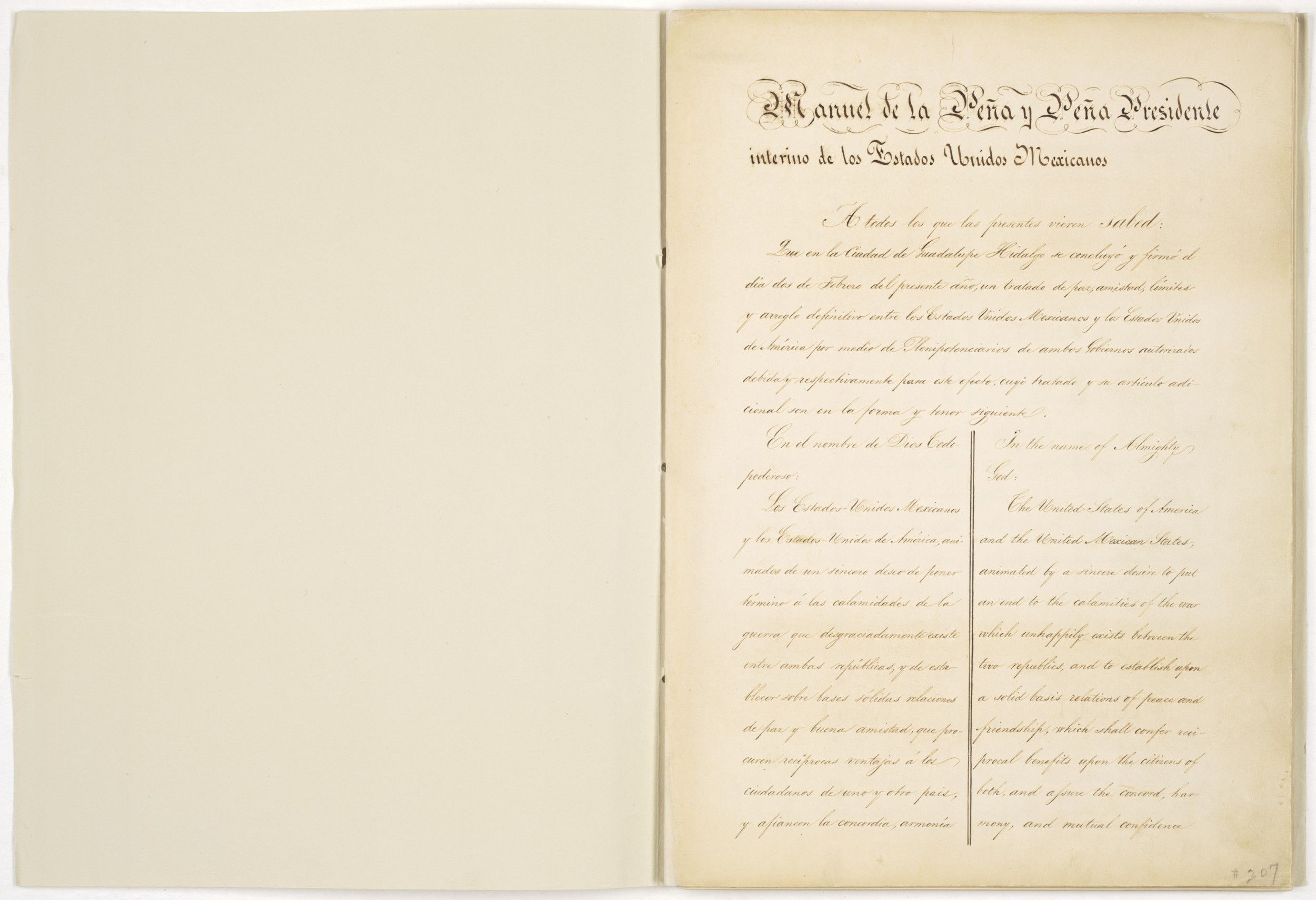
Treaty of Guadalupe Hidalgo [Exchange copy]
Page 2
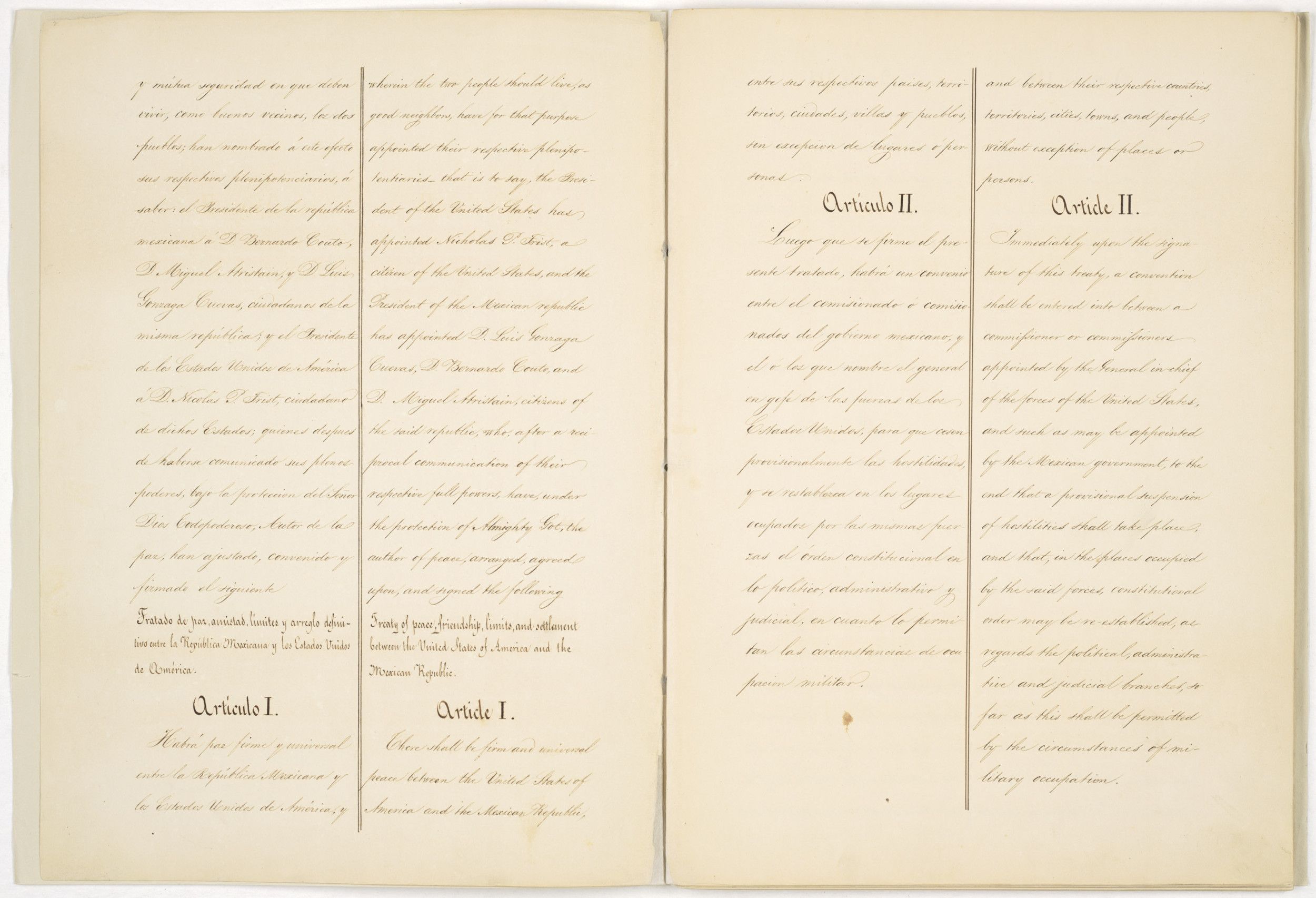
Treaty of Guadalupe Hidalgo [Exchange copy]
Page 3
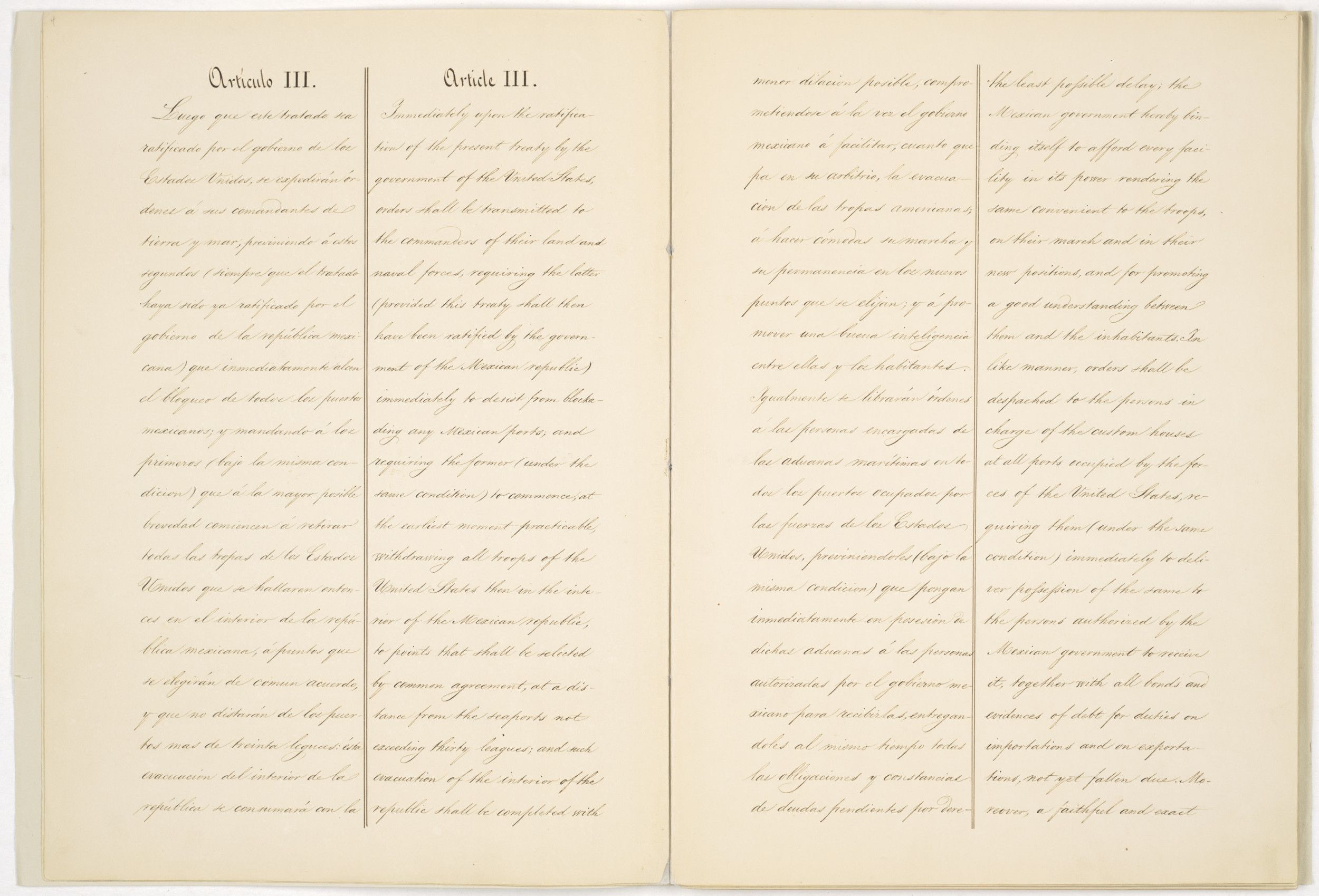
Treaty of Guadalupe Hidalgo [Exchange copy]
Page 4
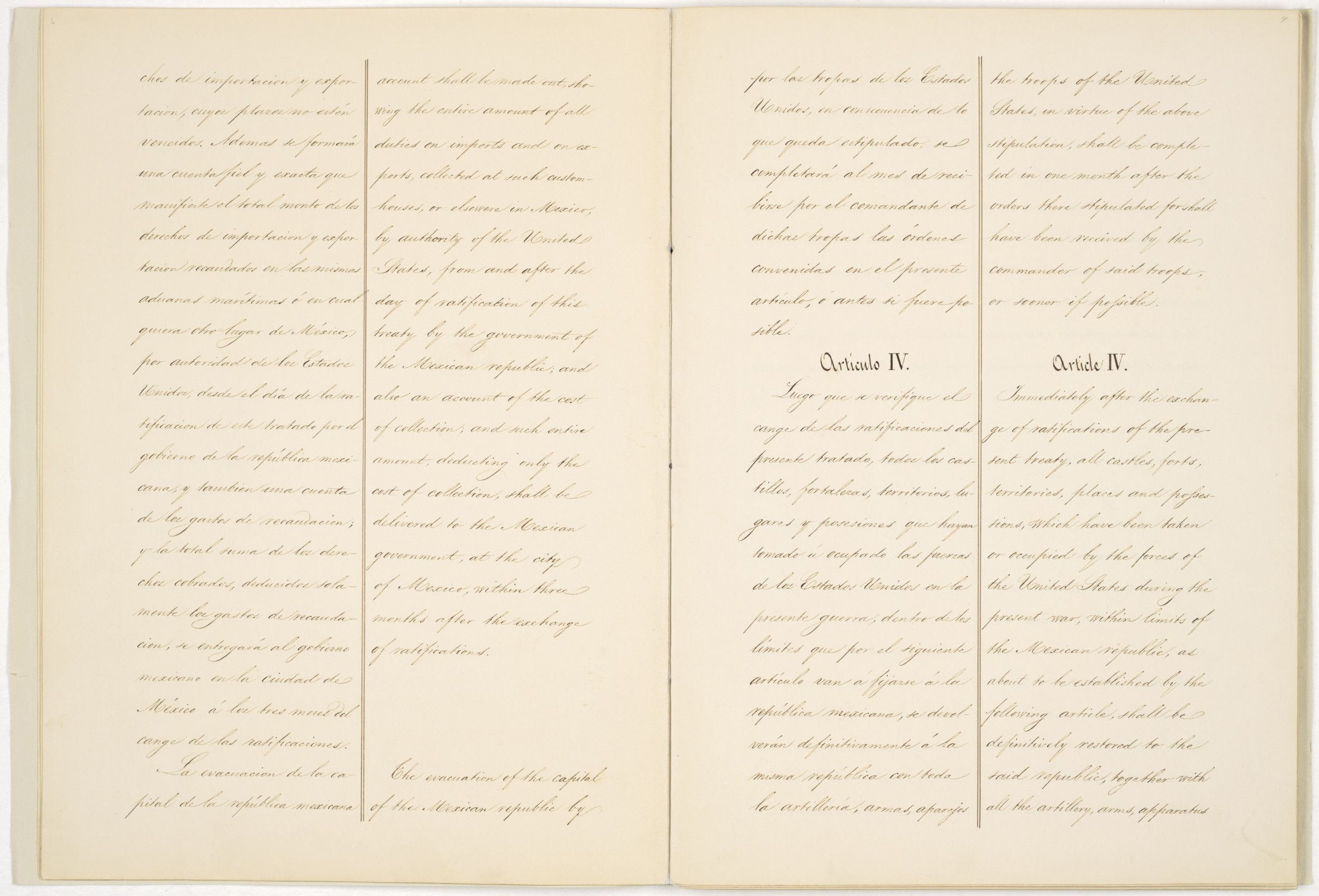
Treaty of Guadalupe Hidalgo [Exchange copy]
Page 5
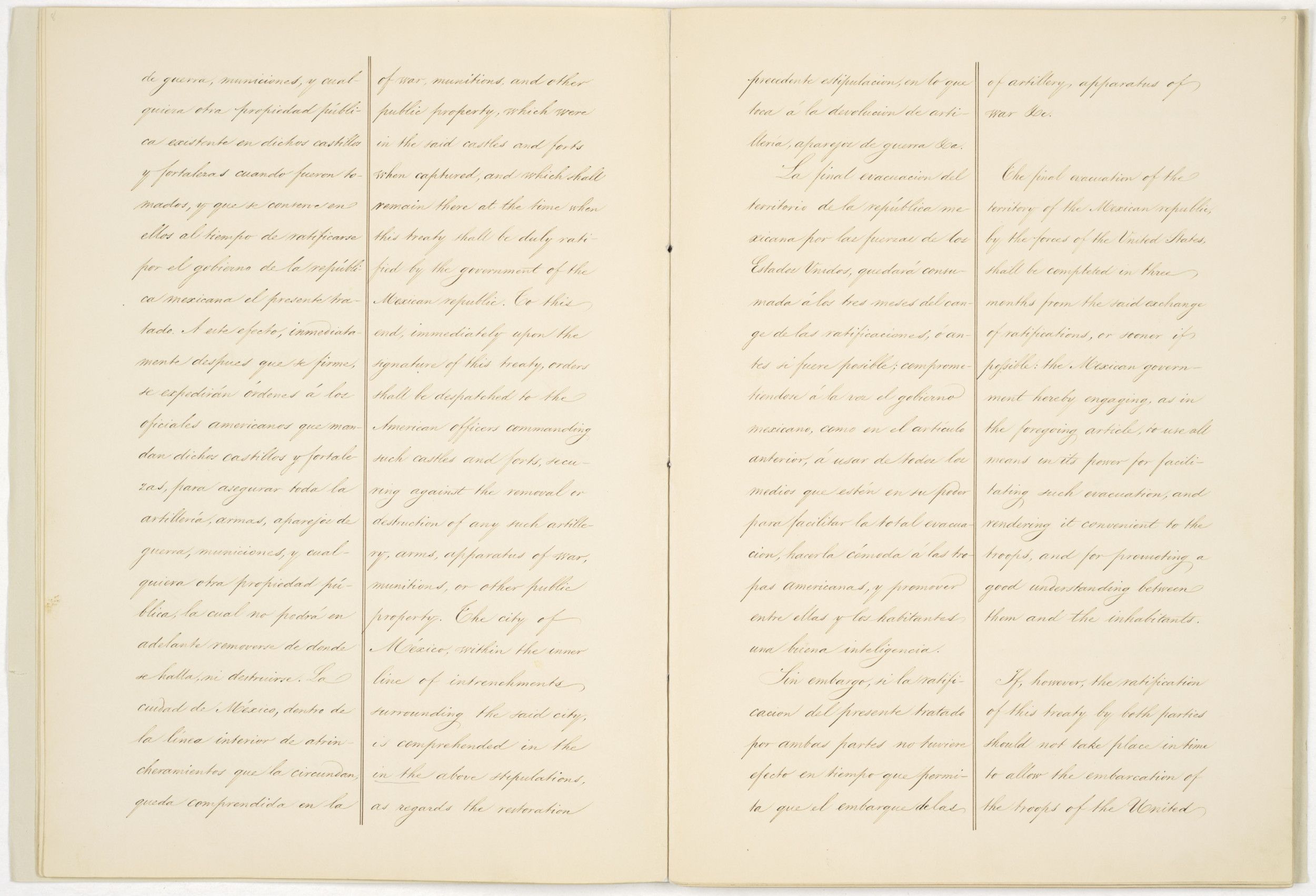
Treaty of Guadalupe Hidalgo [Exchange copy]
Page 6
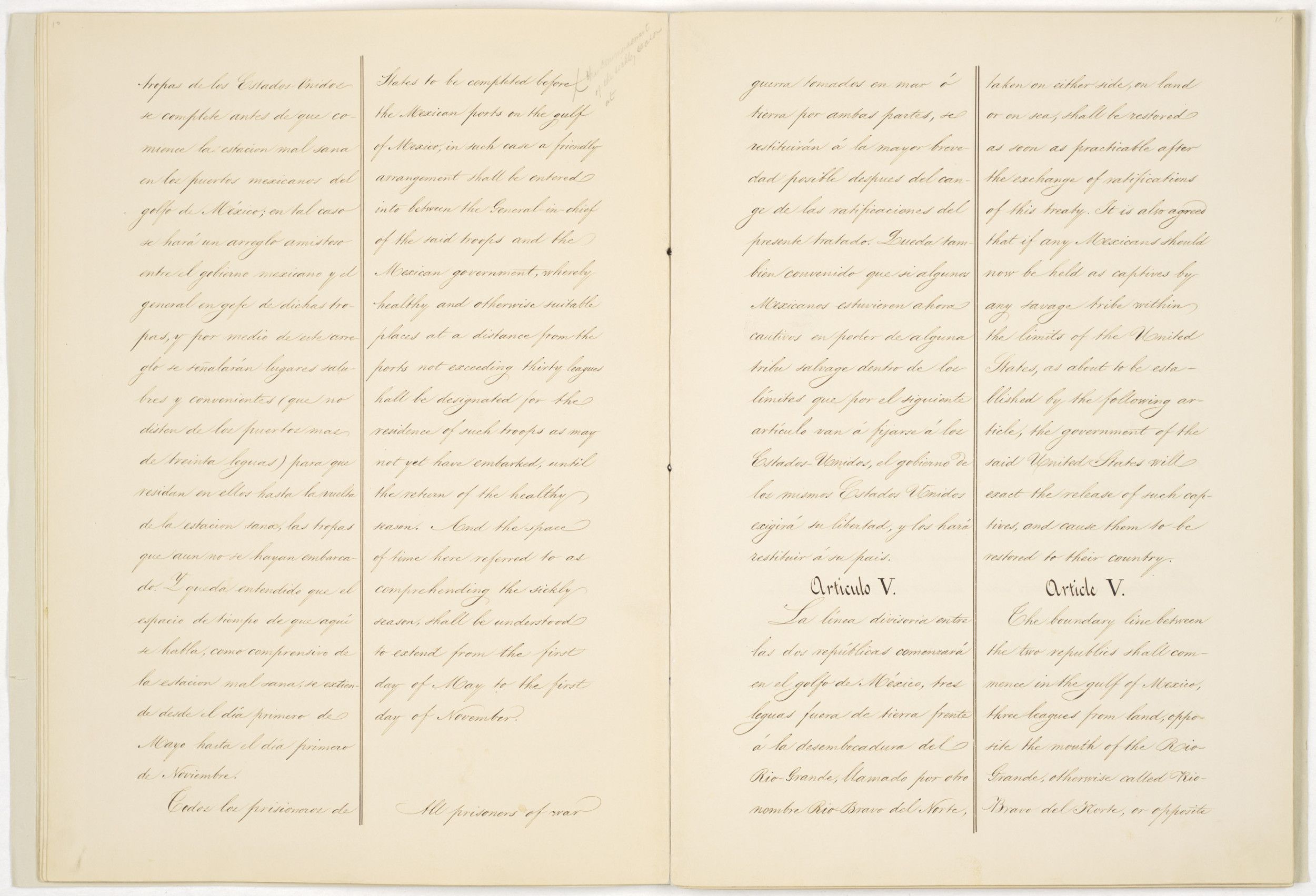
Treaty of Guadalupe Hidalgo [Exchange copy]
Page 7
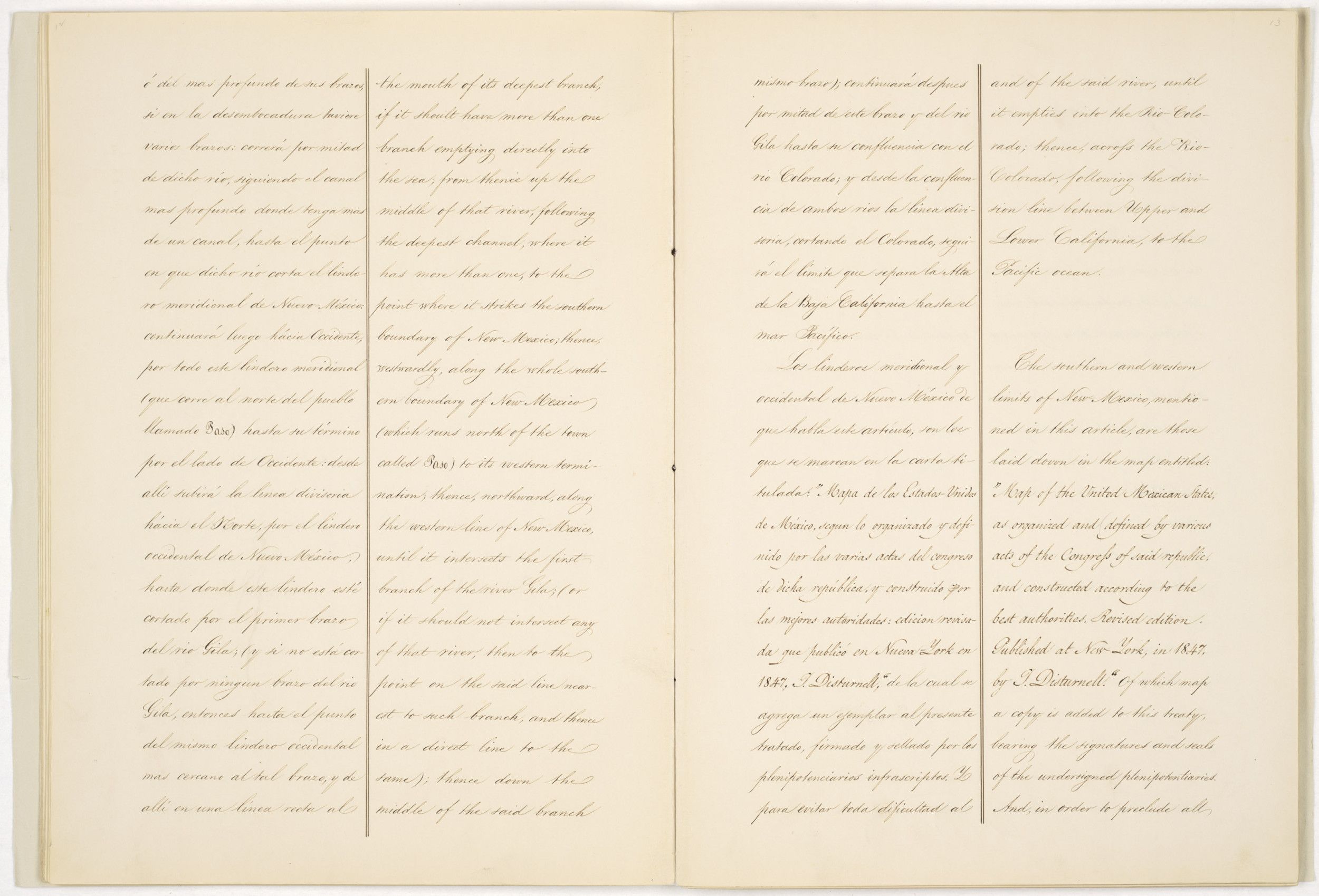
Treaty of Guadalupe Hidalgo [Exchange copy]
Page 8
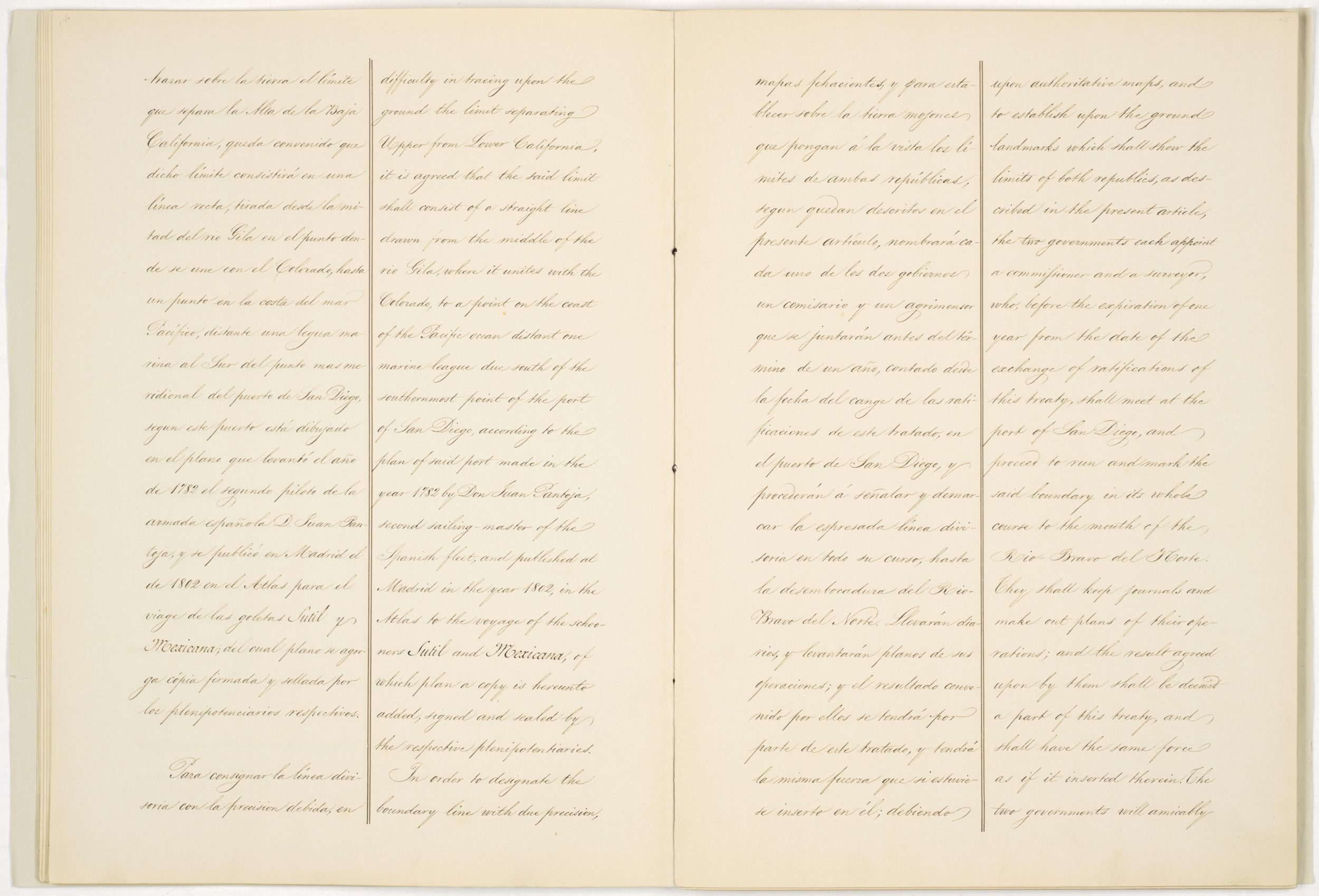
Treaty of Guadalupe Hidalgo [Exchange copy]
Page 9
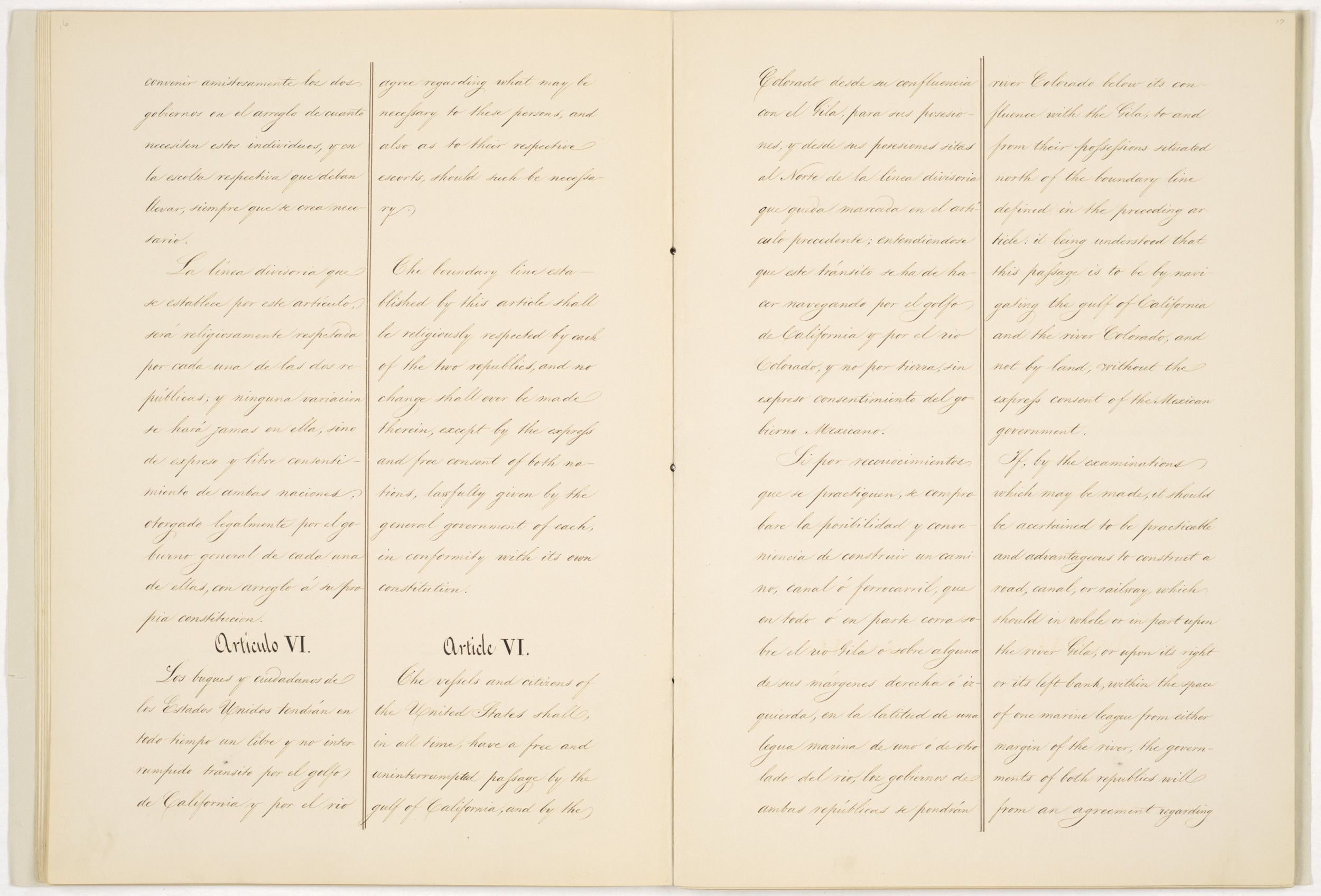
Treaty of Guadalupe Hidalgo [Exchange copy]
Page 10
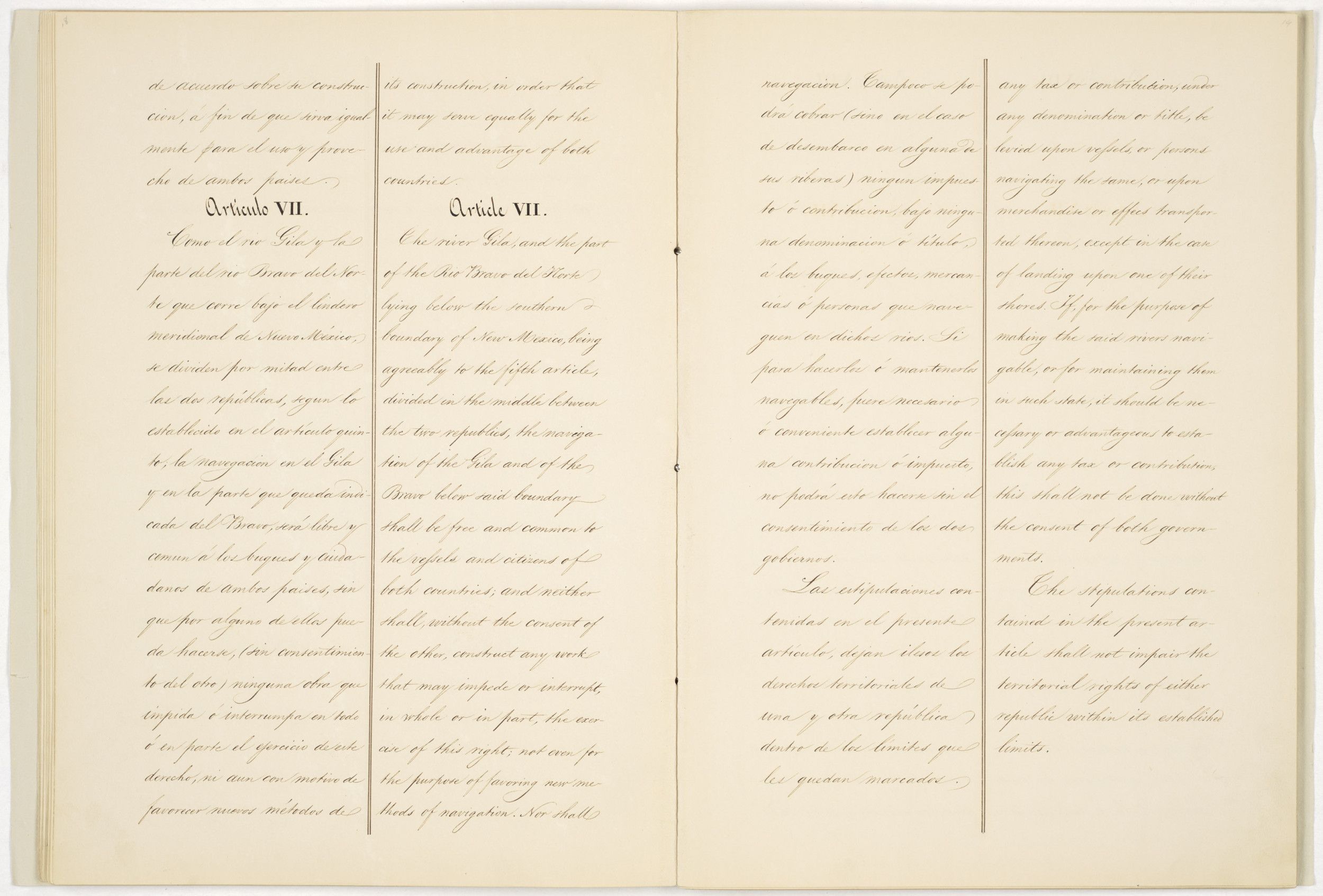
Treaty of Guadalupe Hidalgo [Exchange copy]
Page 11
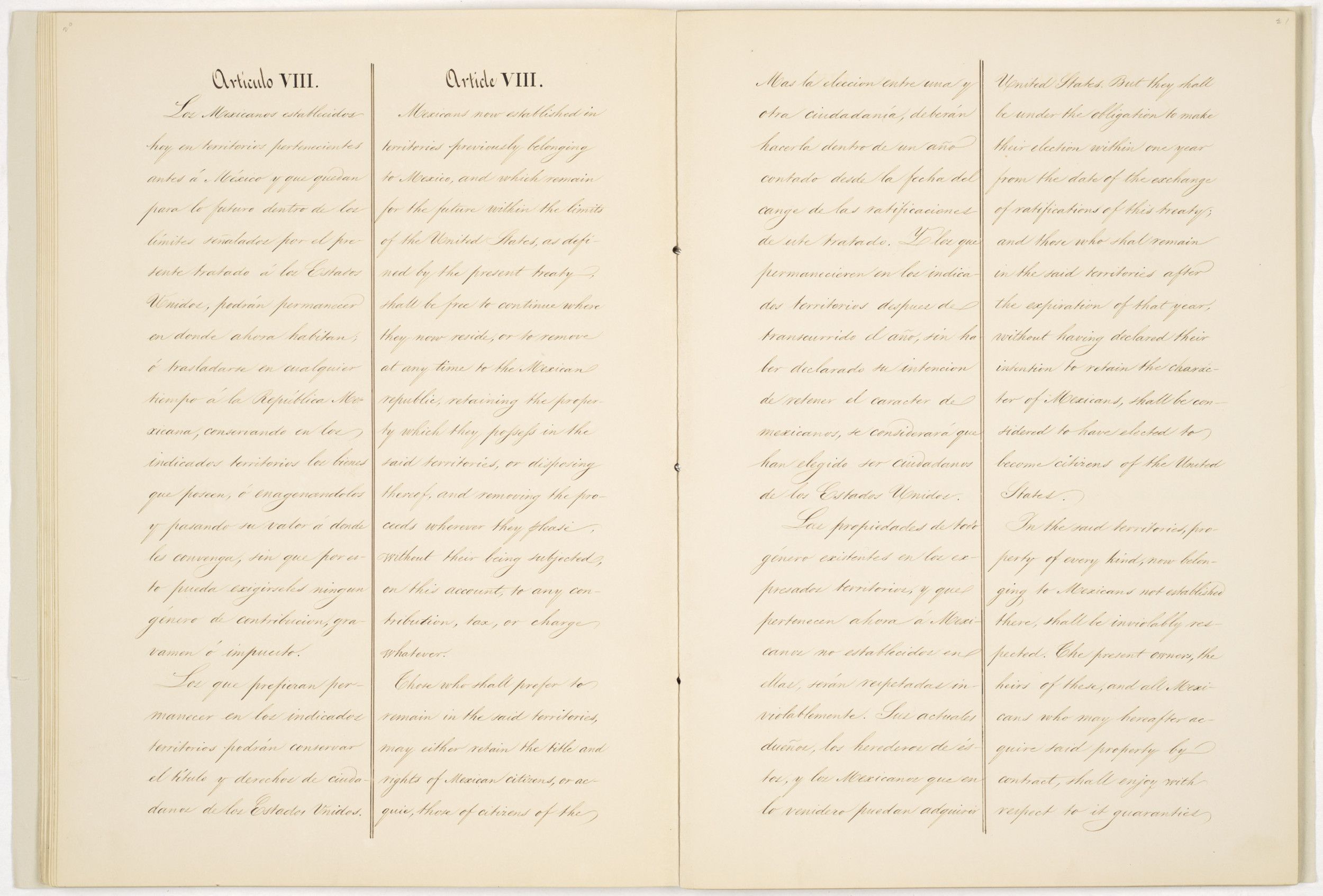
Treaty of Guadalupe Hidalgo [Exchange copy]
Page 12
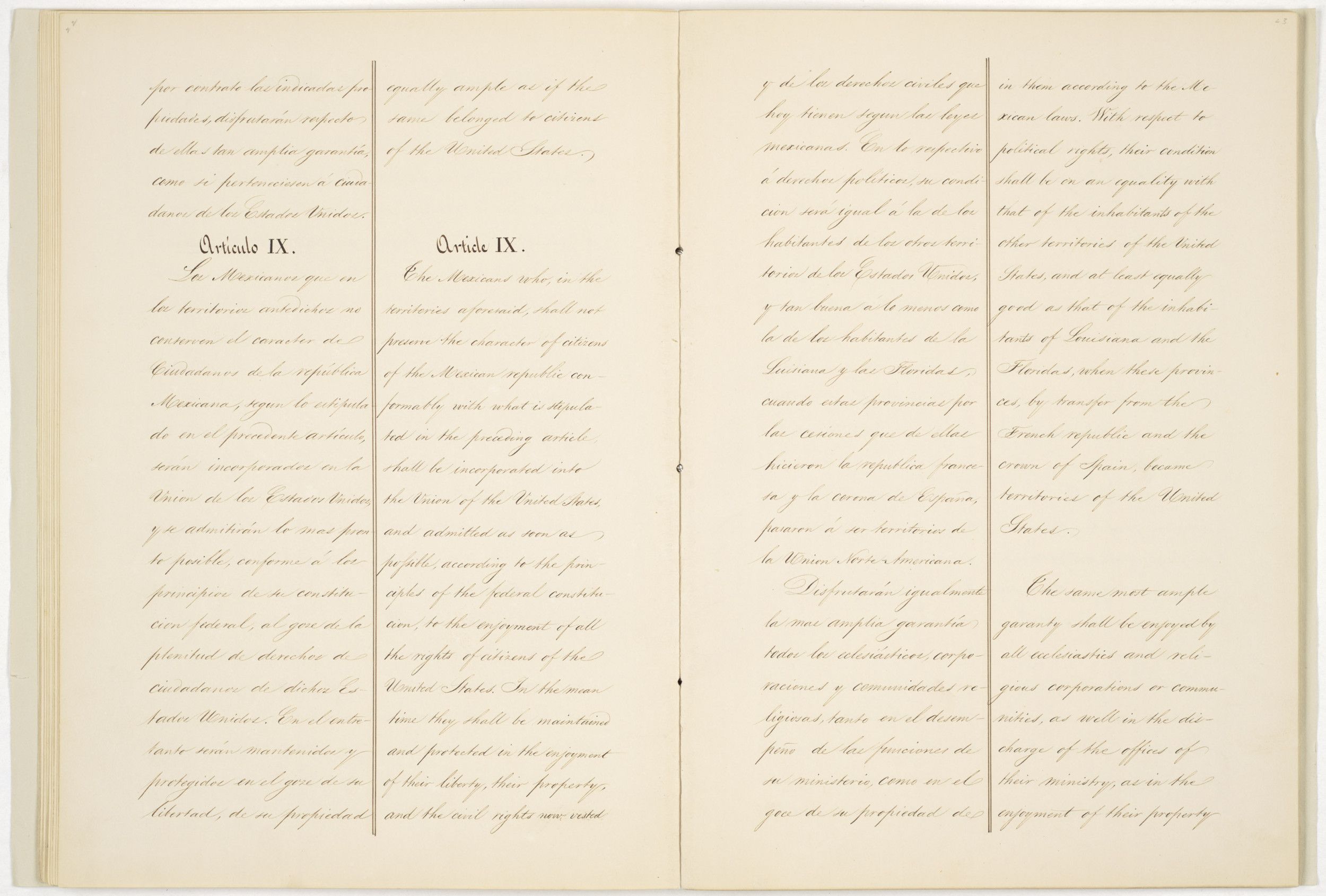
Treaty of Guadalupe Hidalgo [Exchange copy]
Page 13
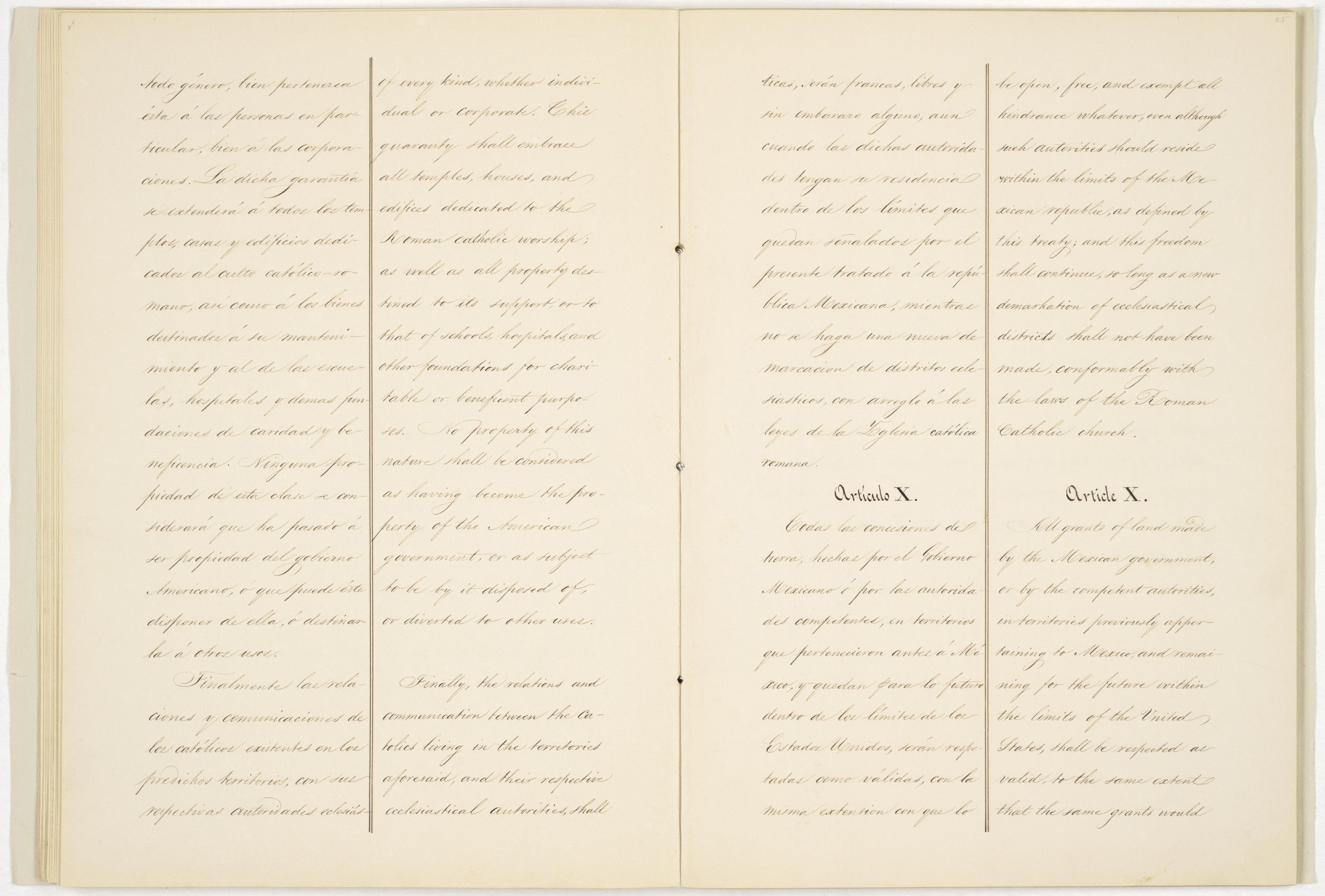
Treaty of Guadalupe Hidalgo [Exchange copy]
Page 14
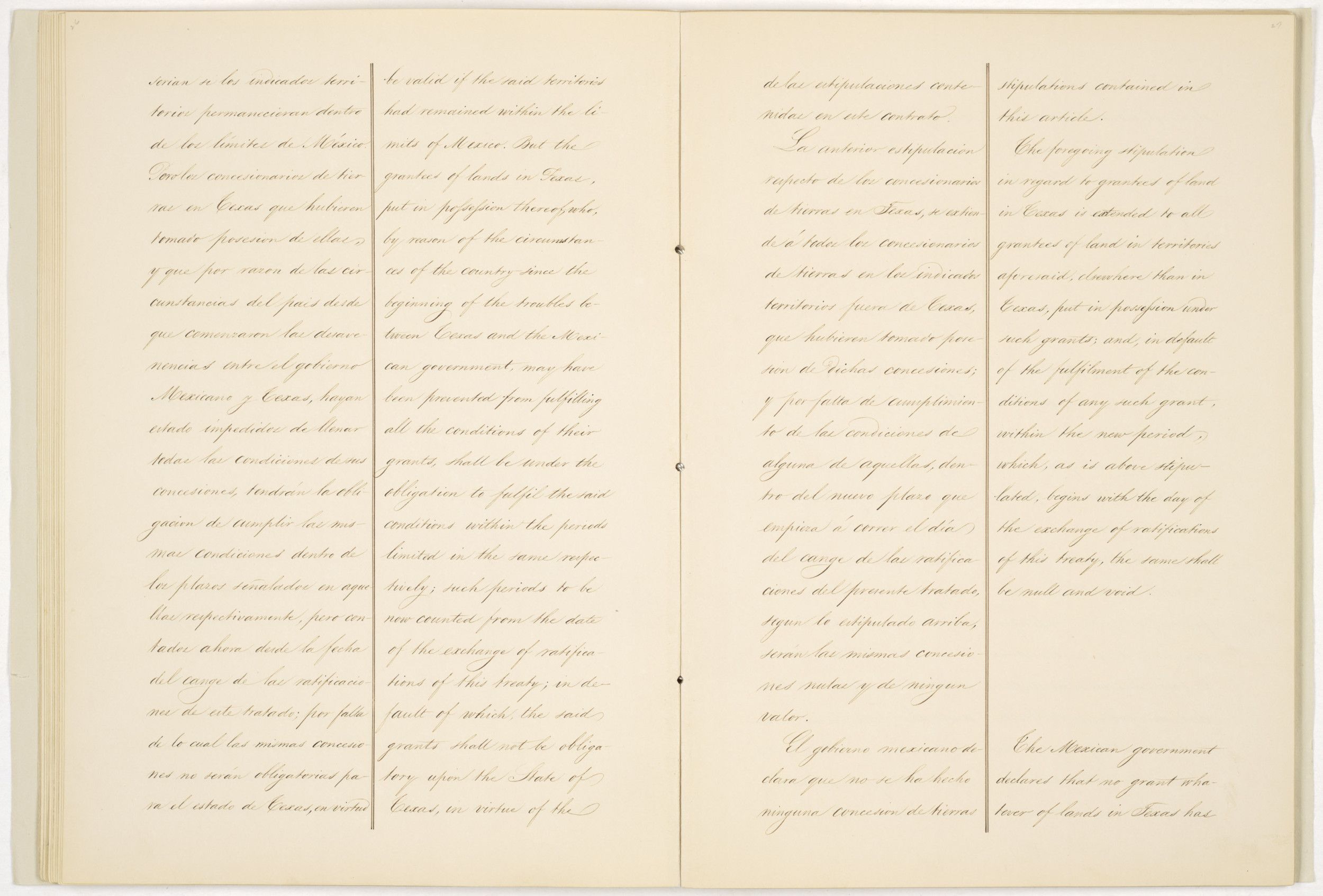
Treaty of Guadalupe Hidalgo [Exchange copy]
Page 15
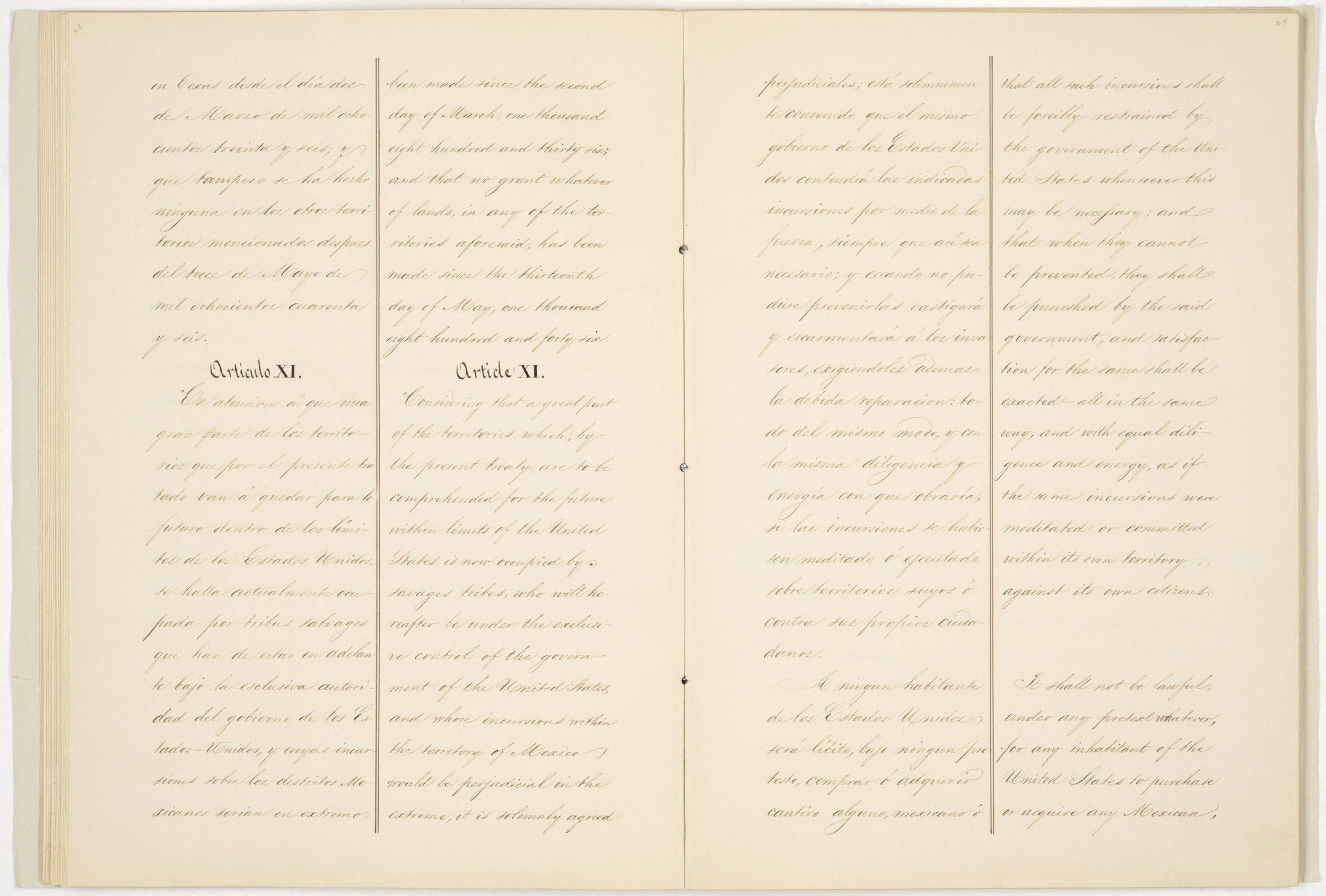
Treaty of Guadalupe Hidalgo [Exchange copy]
Page 16
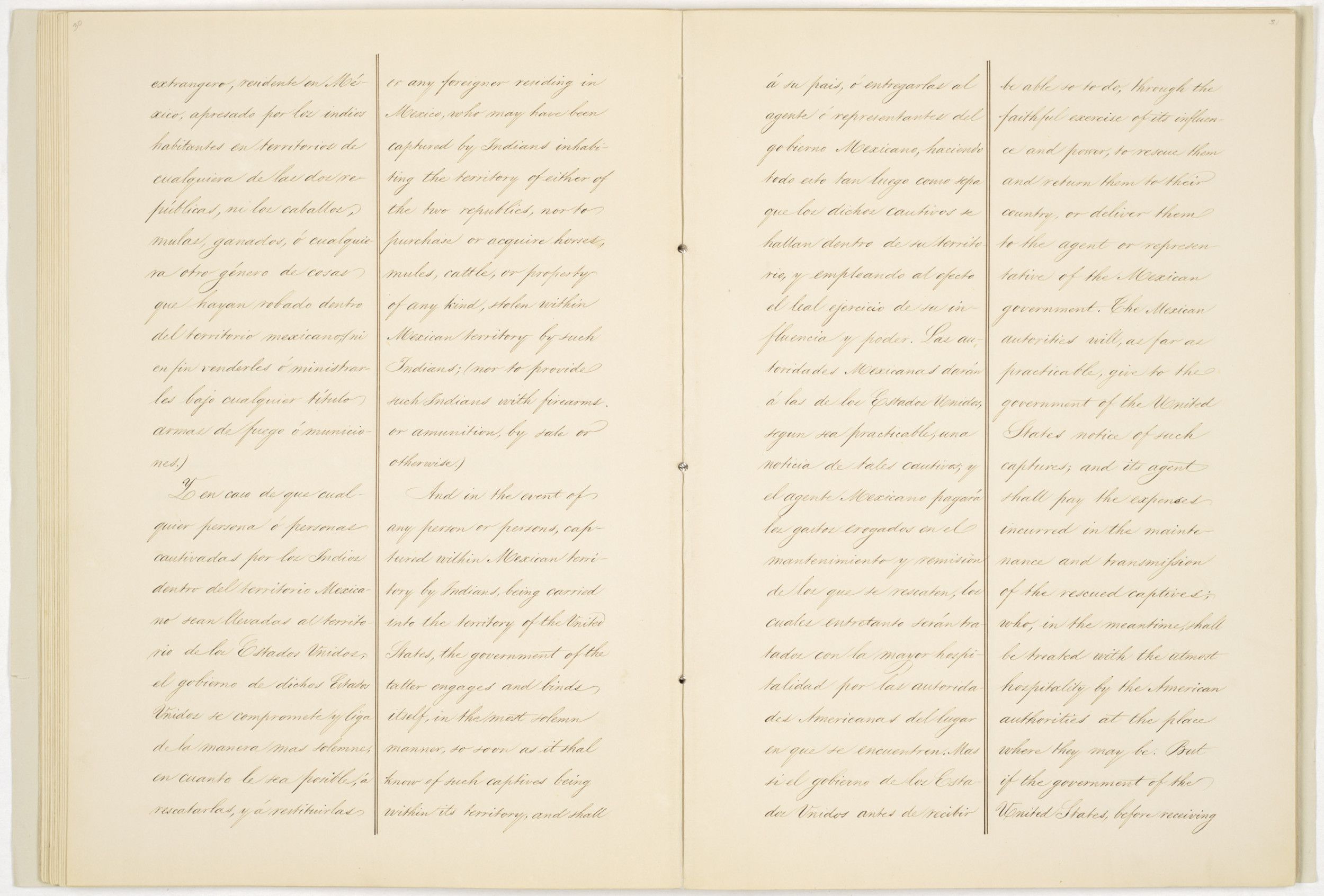
Treaty of Guadalupe Hidalgo [Exchange copy]
Page 17
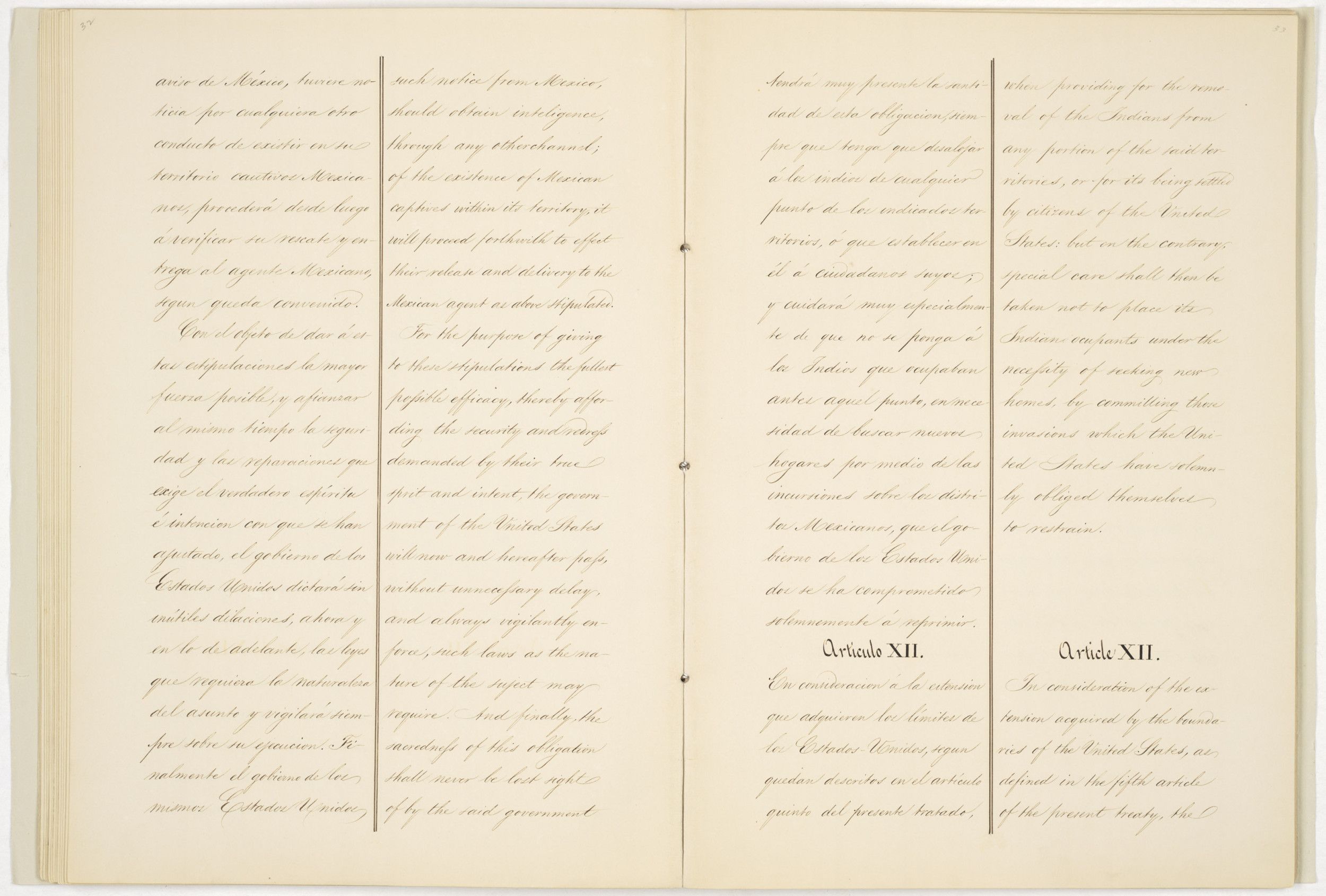
Treaty of Guadalupe Hidalgo [Exchange copy]
Page 18
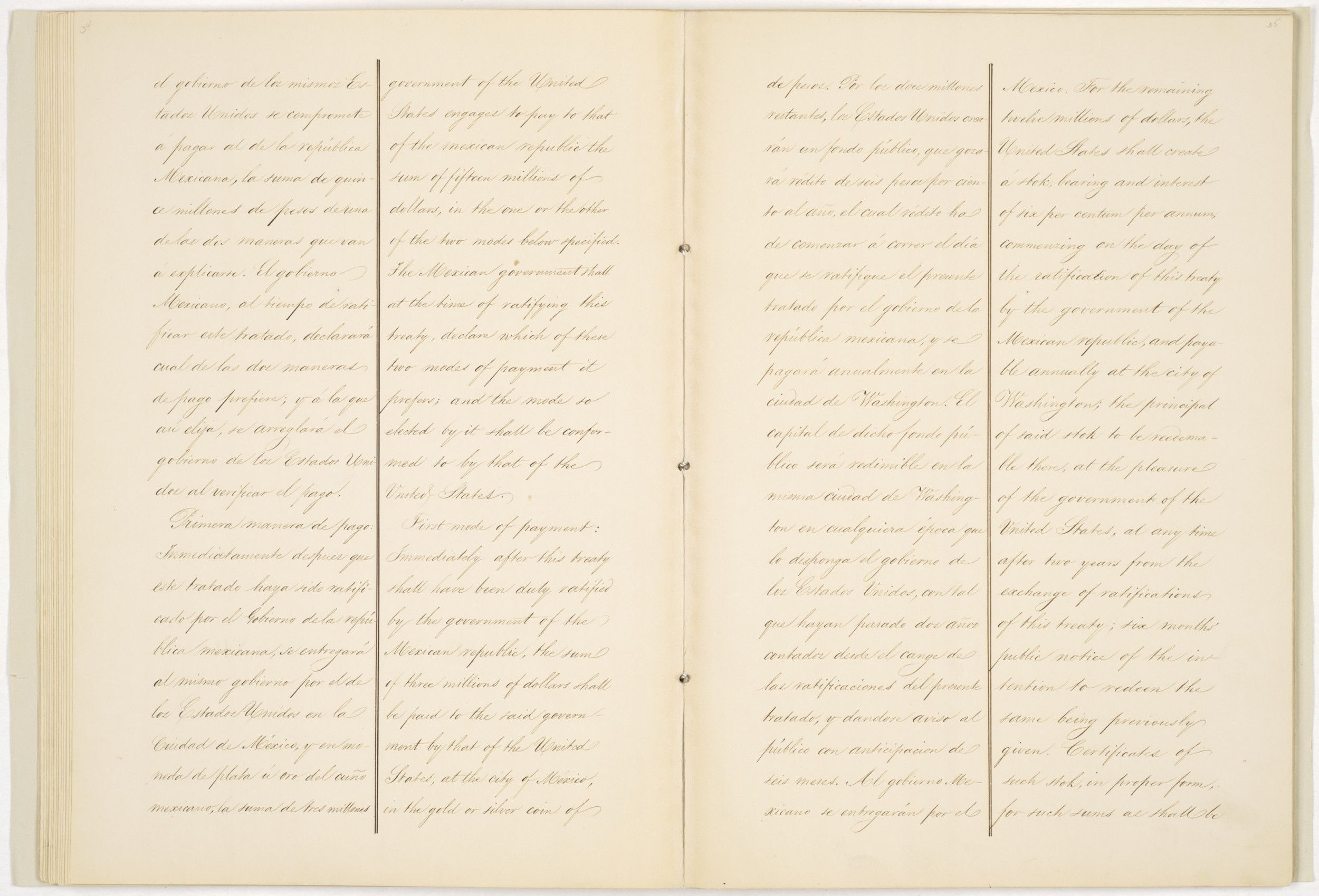
Treaty of Guadalupe Hidalgo [Exchange copy]
Page 19
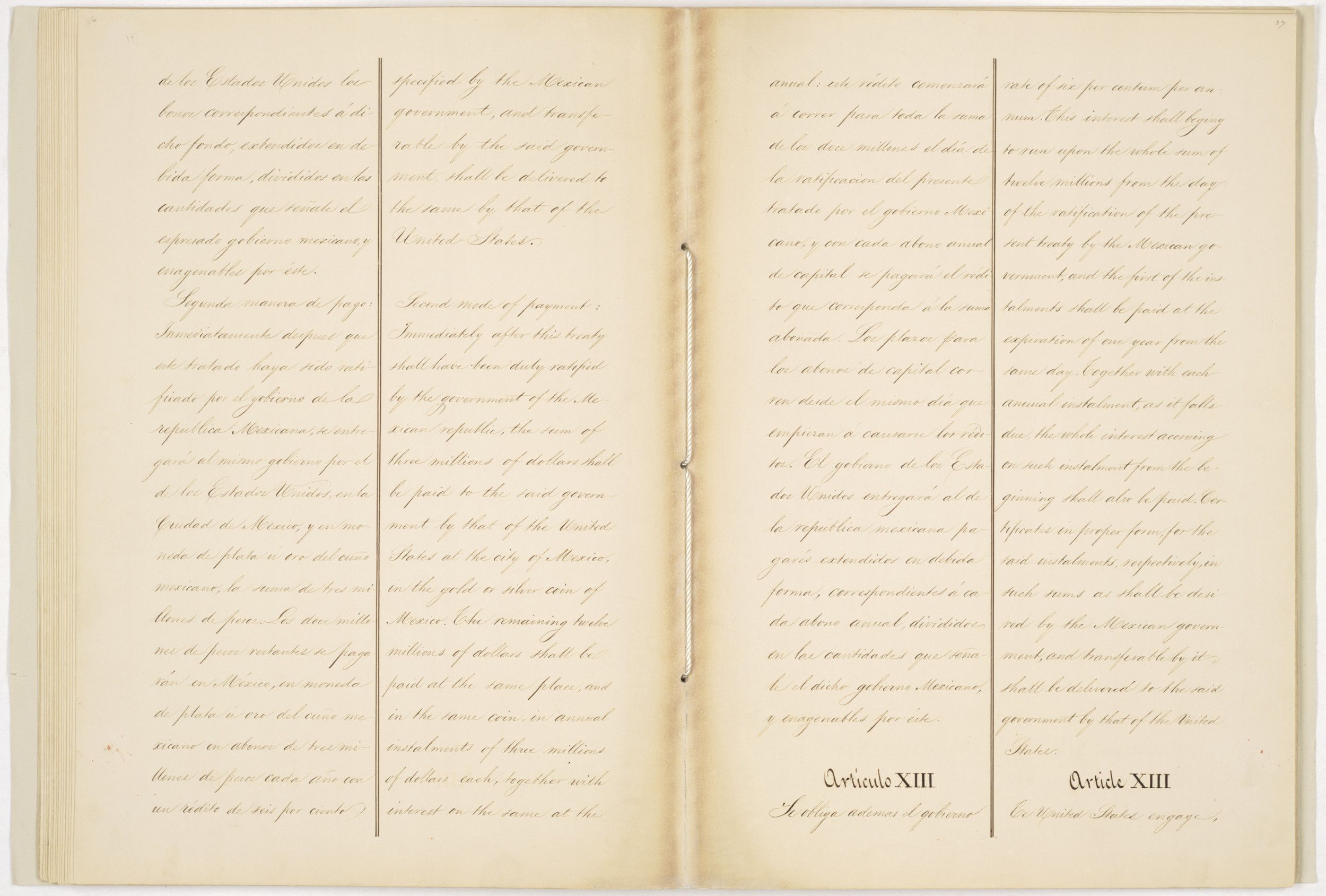
Treaty of Guadalupe Hidalgo [Exchange copy]
Page 20
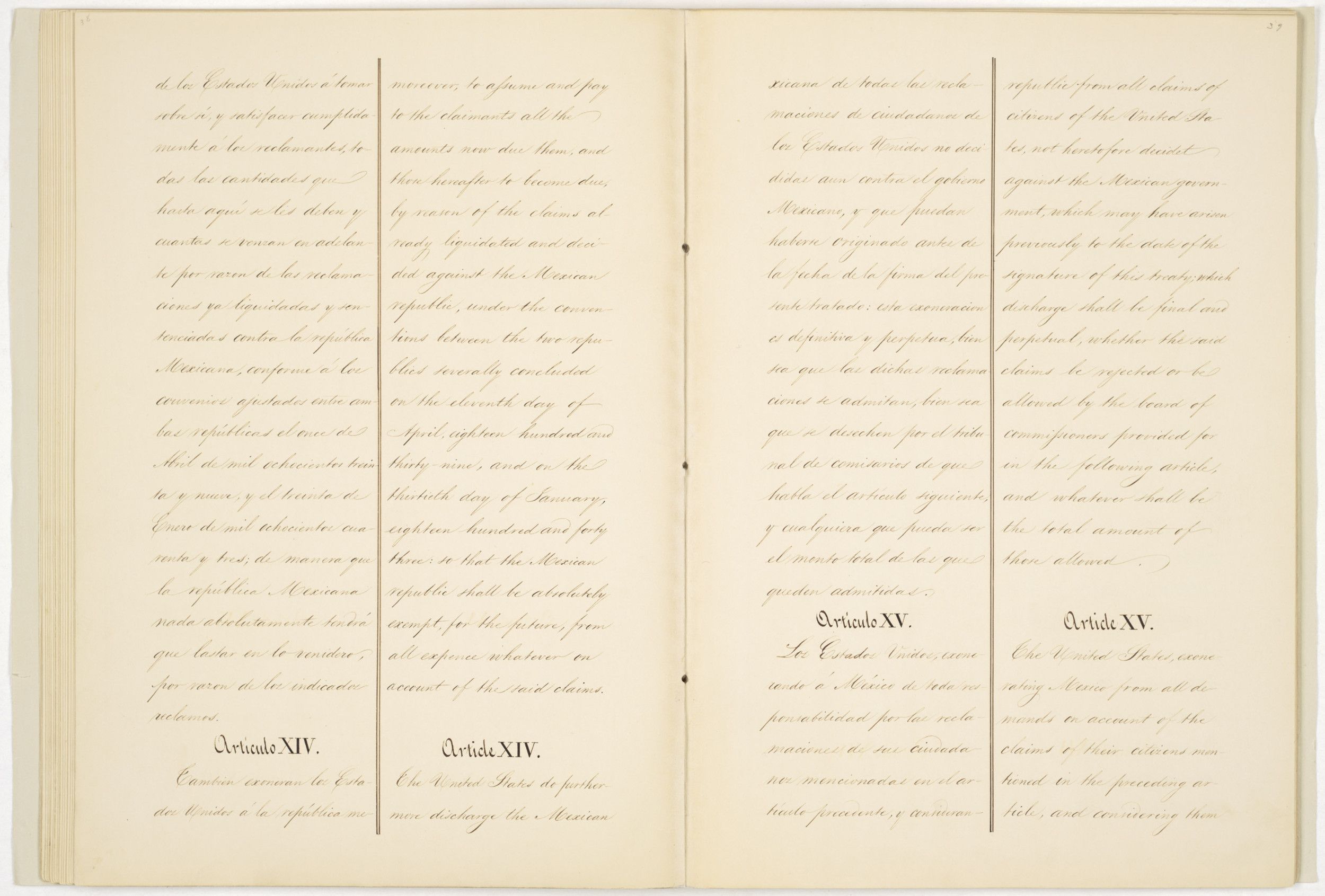
Treaty of Guadalupe Hidalgo [Exchange copy]
Page 21
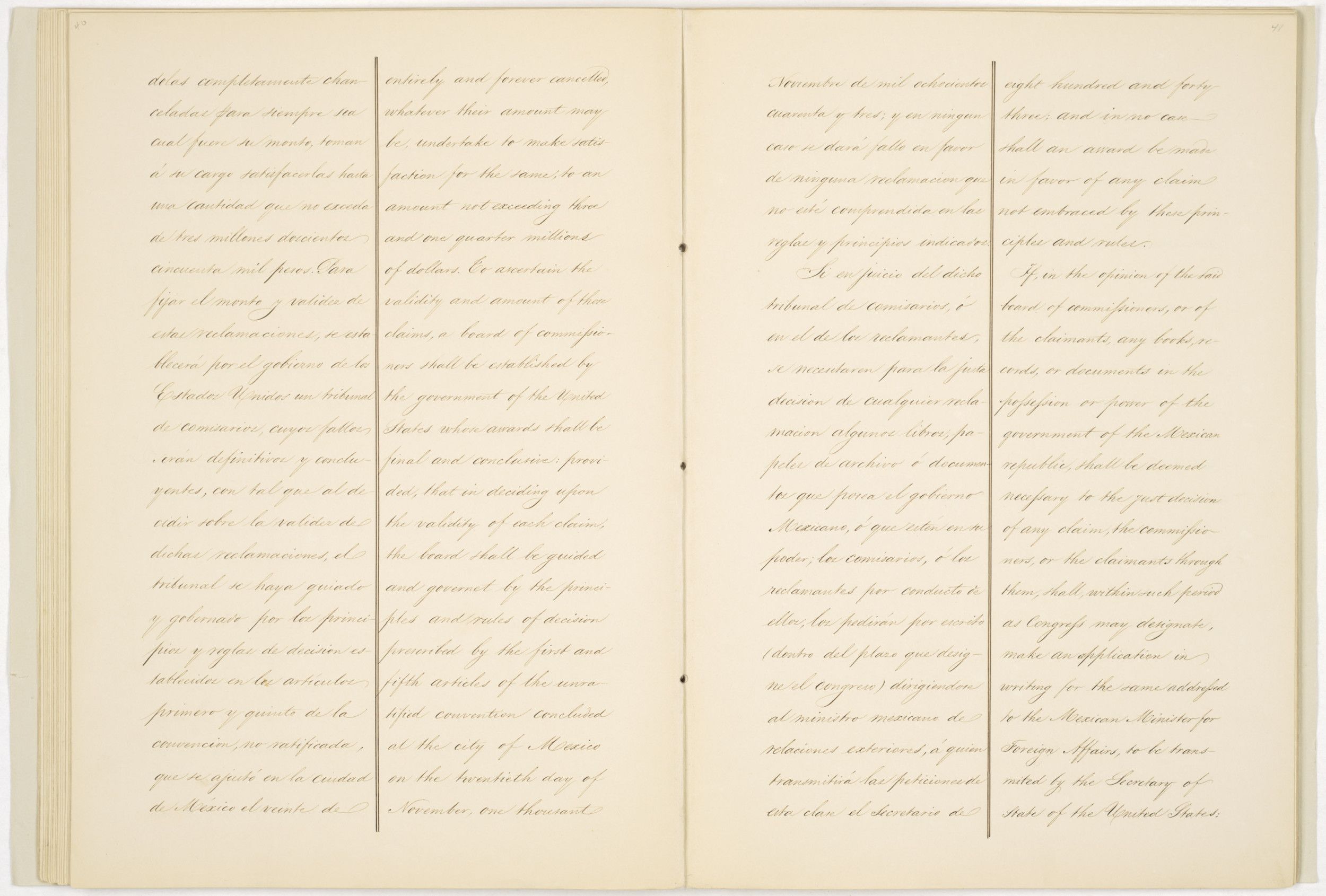
Treaty of Guadalupe Hidalgo [Exchange copy]
Page 22
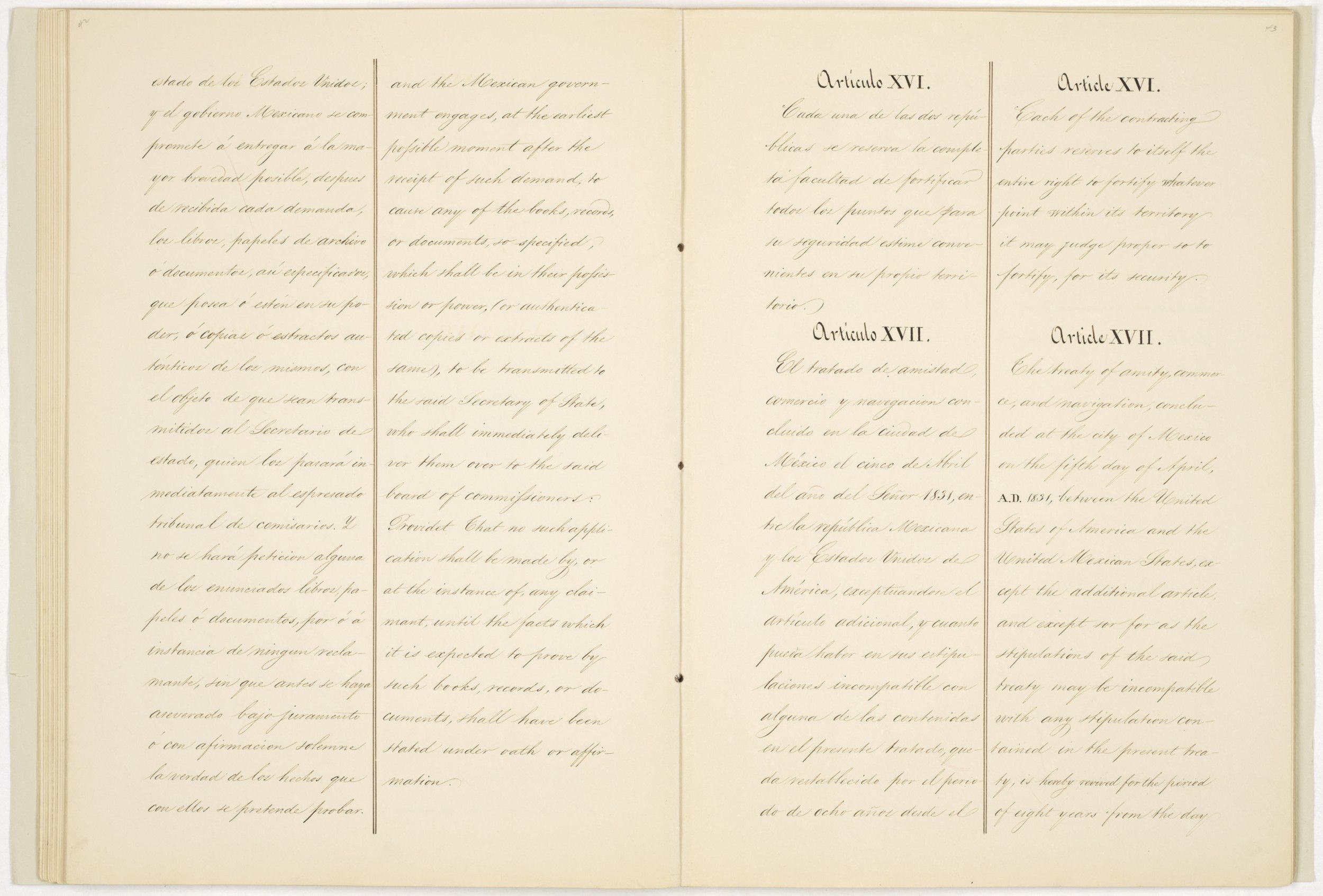
Treaty of Guadalupe Hidalgo [Exchange copy]
Page 23
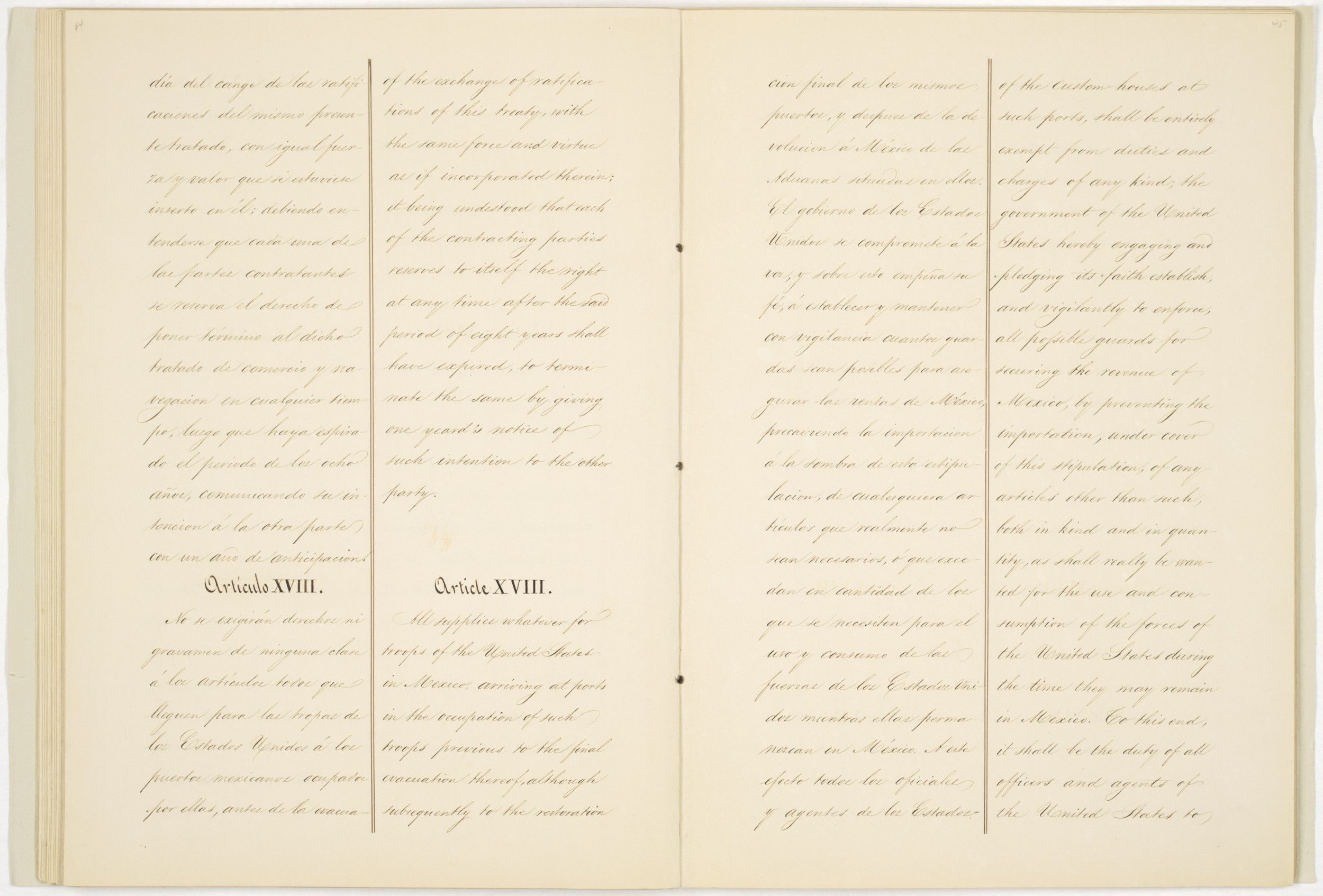
Treaty of Guadalupe Hidalgo [Exchange copy]
Page 24
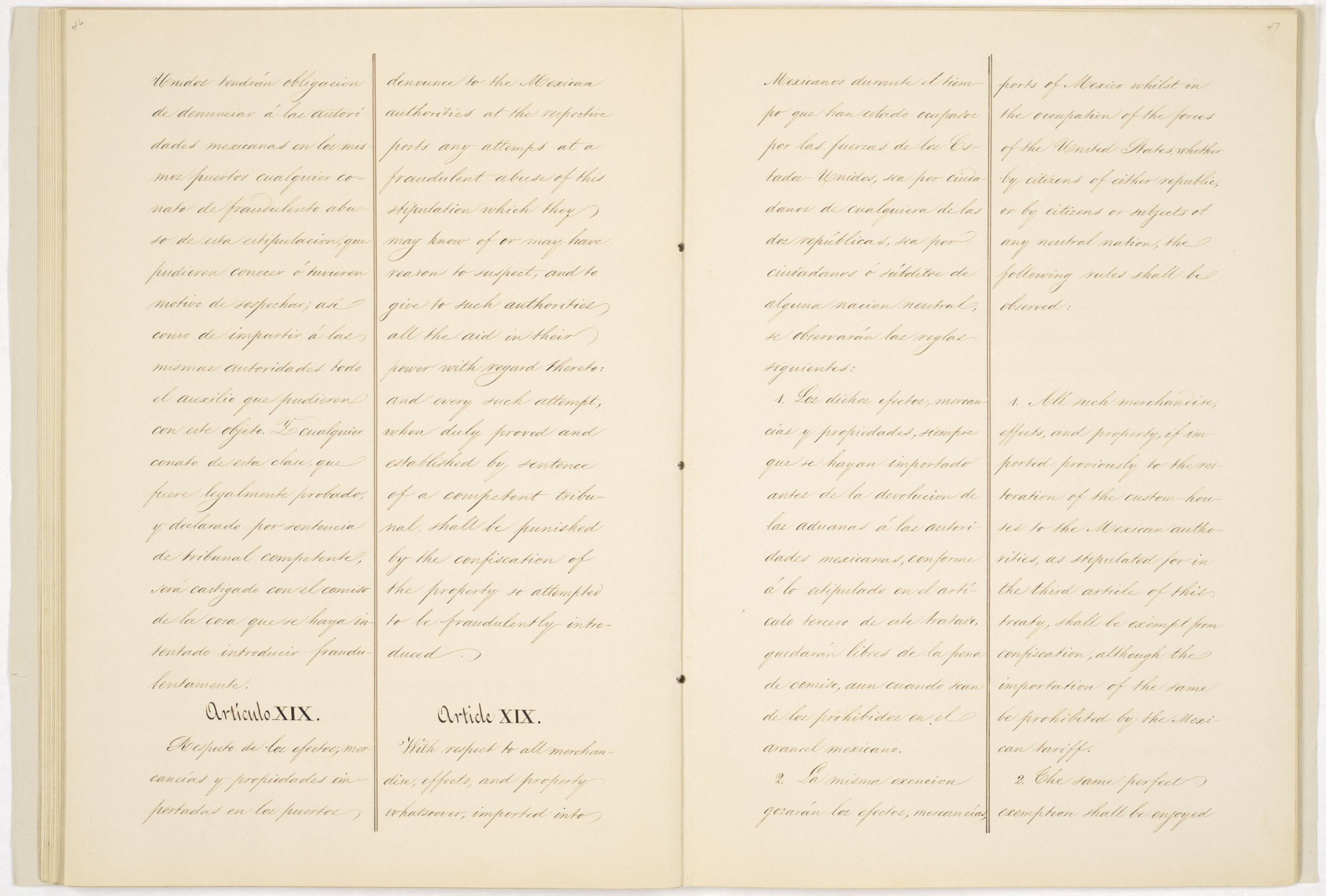
Treaty of Guadalupe Hidalgo [Exchange copy]
Page 25
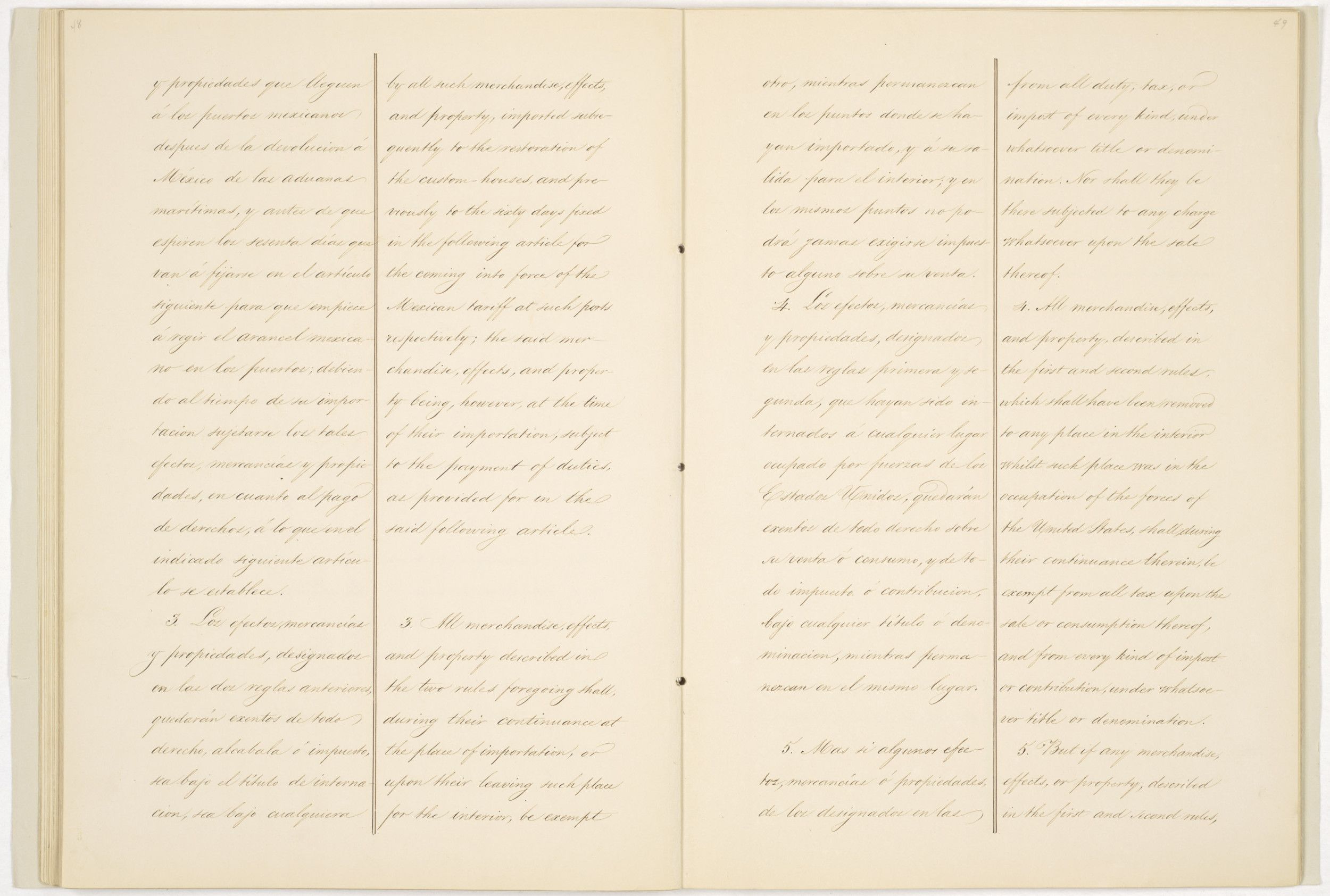
Treaty of Guadalupe Hidalgo [Exchange copy]
Page 26
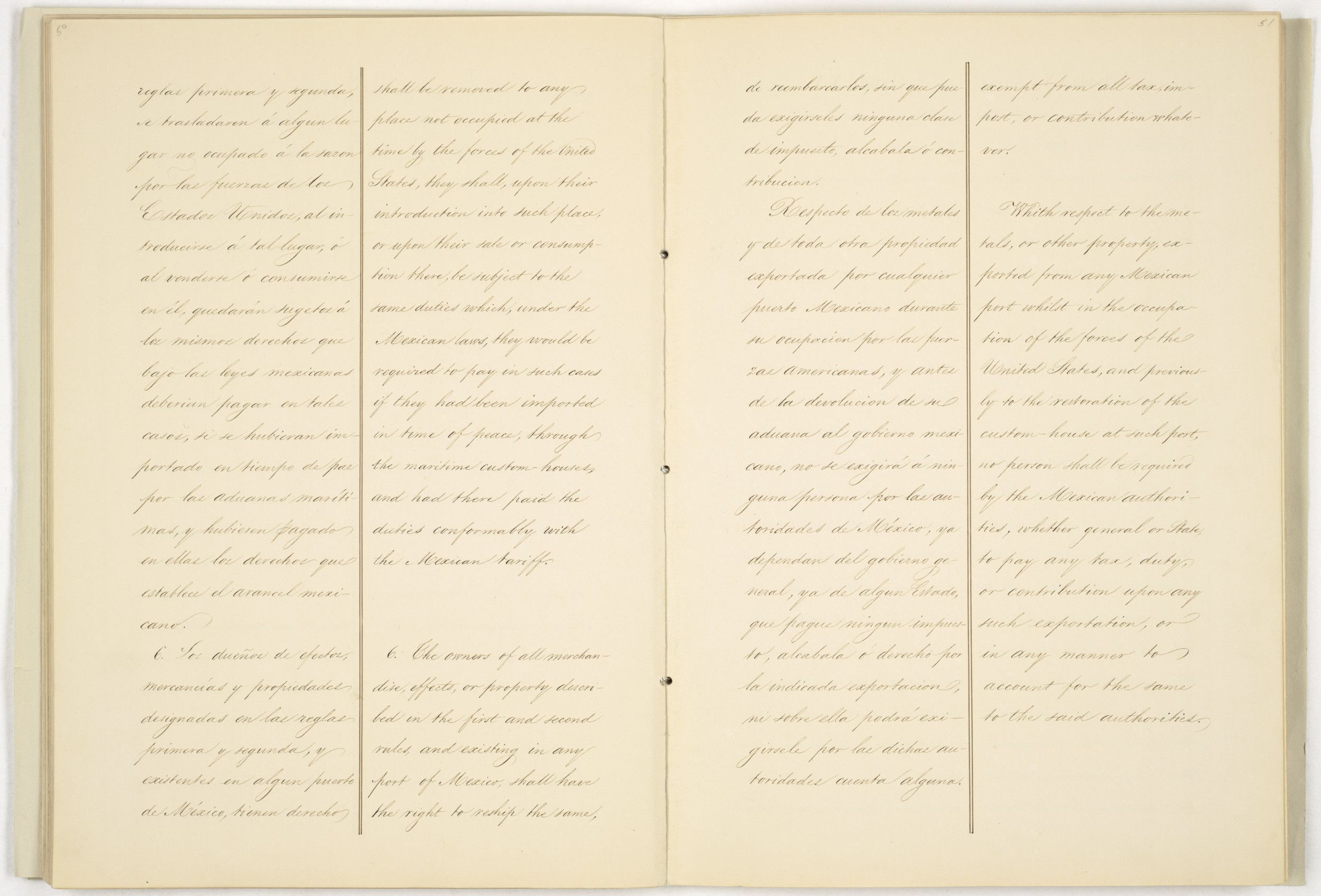
Treaty of Guadalupe Hidalgo [Exchange copy]
Page 27
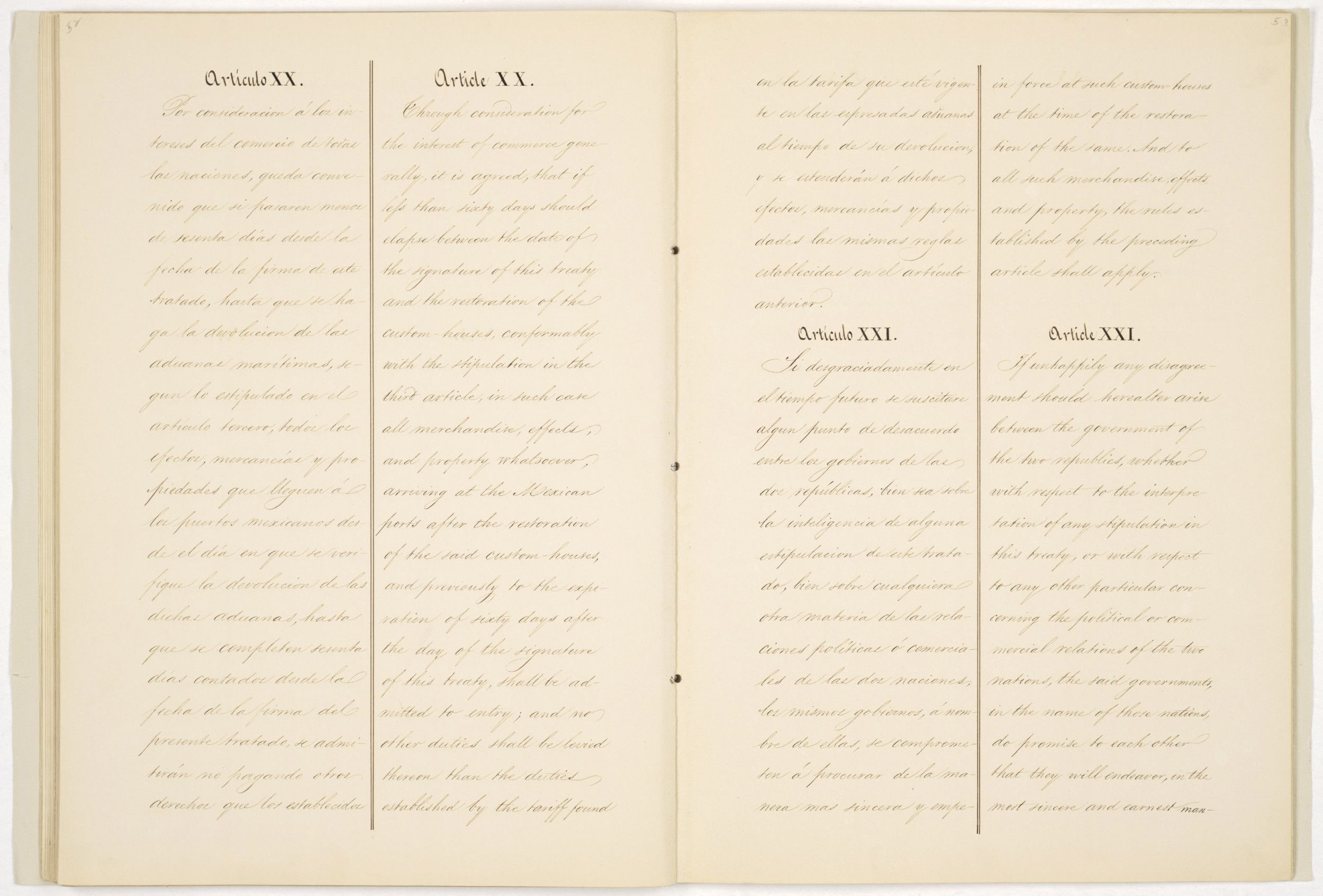
Treaty of Guadalupe Hidalgo [Exchange copy]
Page 28
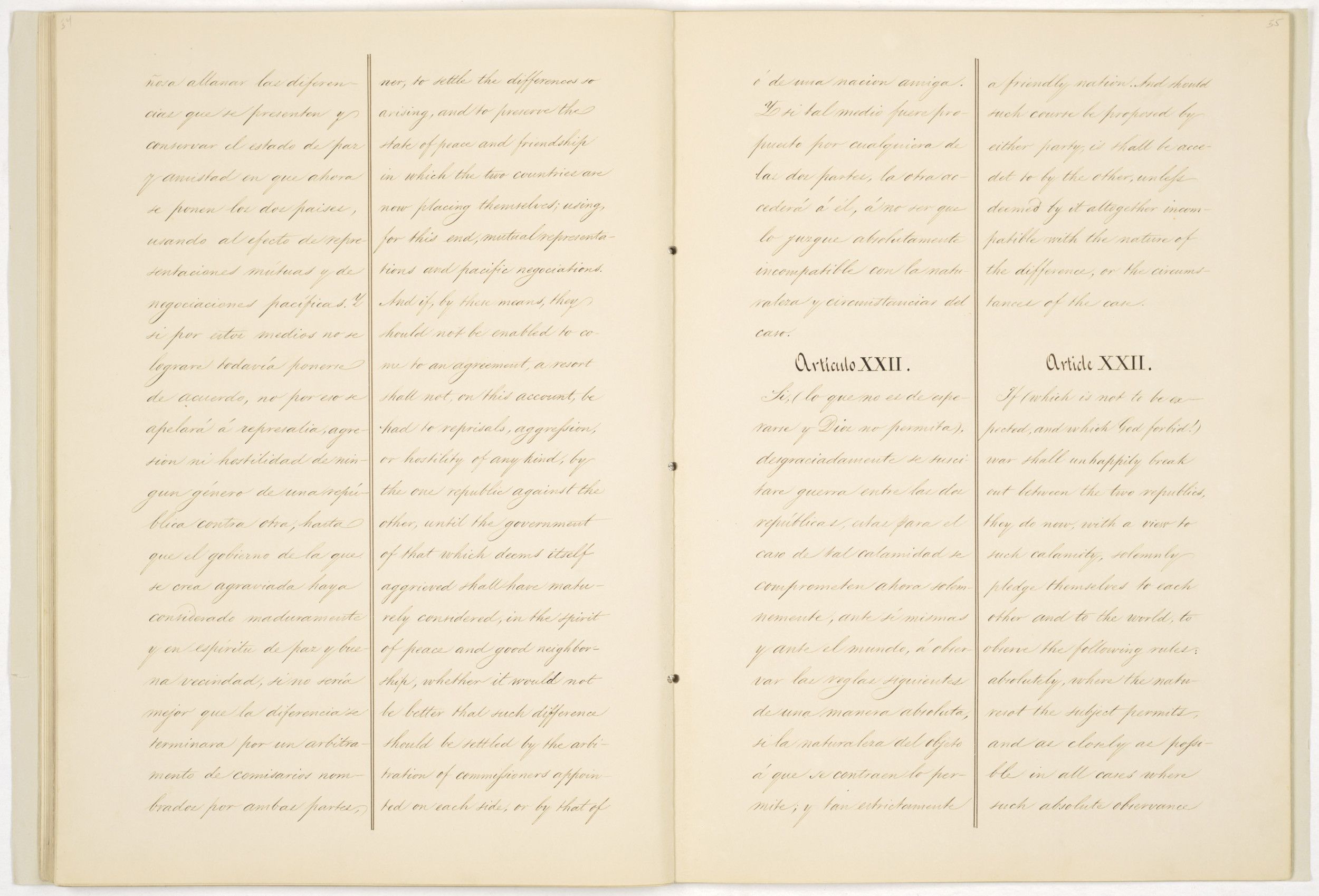
Treaty of Guadalupe Hidalgo [Exchange copy]
Page 29
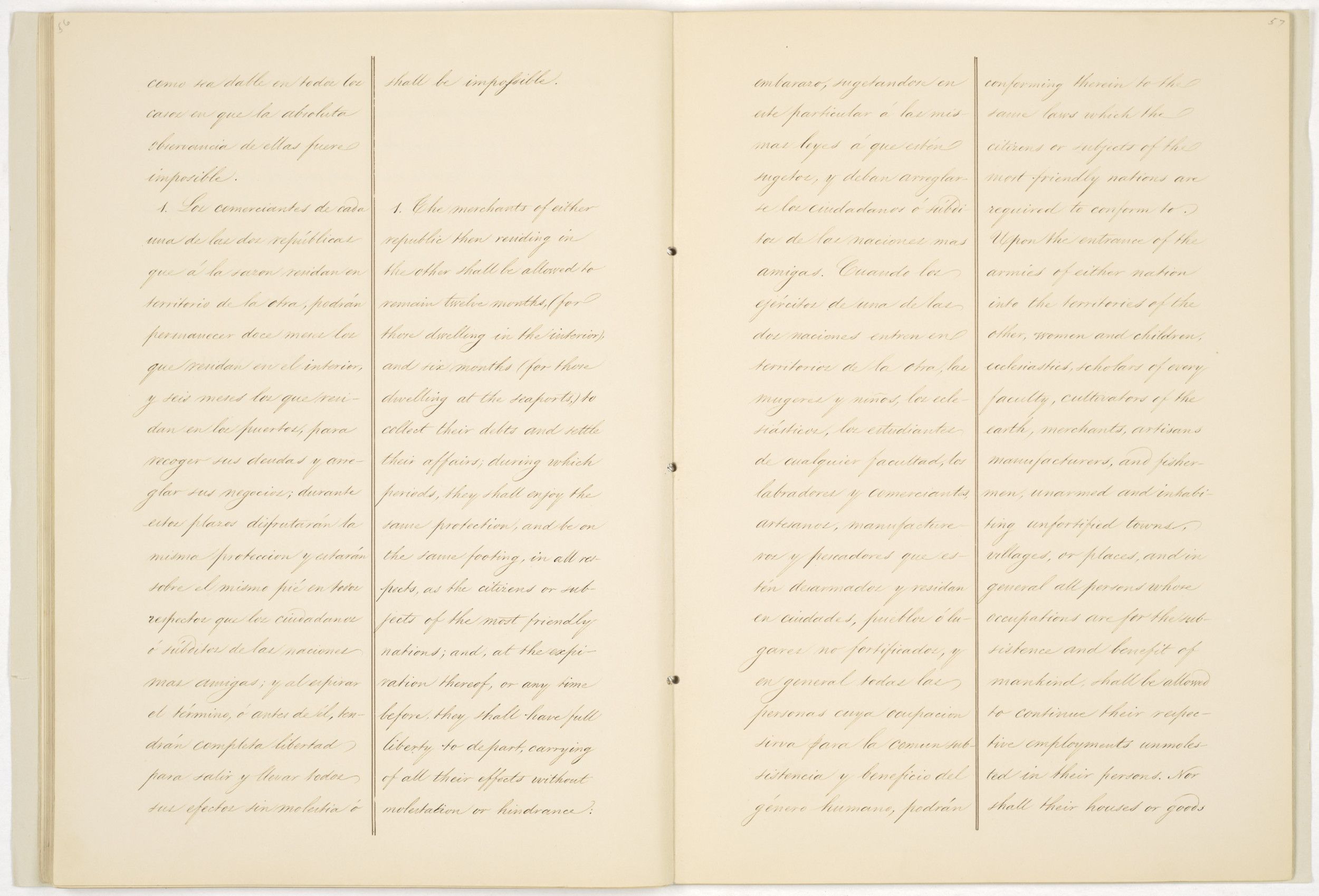
Treaty of Guadalupe Hidalgo [Exchange copy]
Page 30
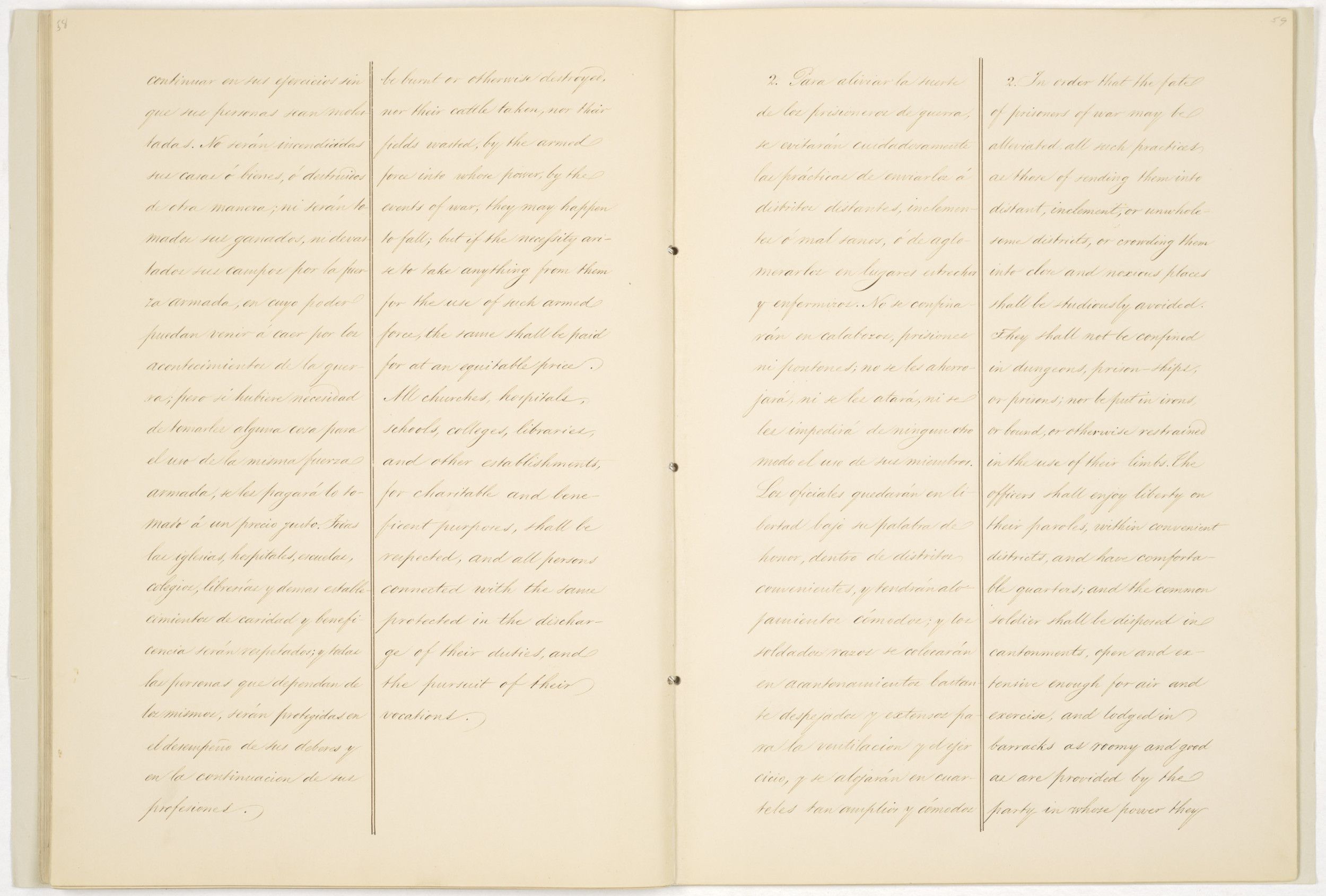
Treaty of Guadalupe Hidalgo [Exchange copy]
Page 31
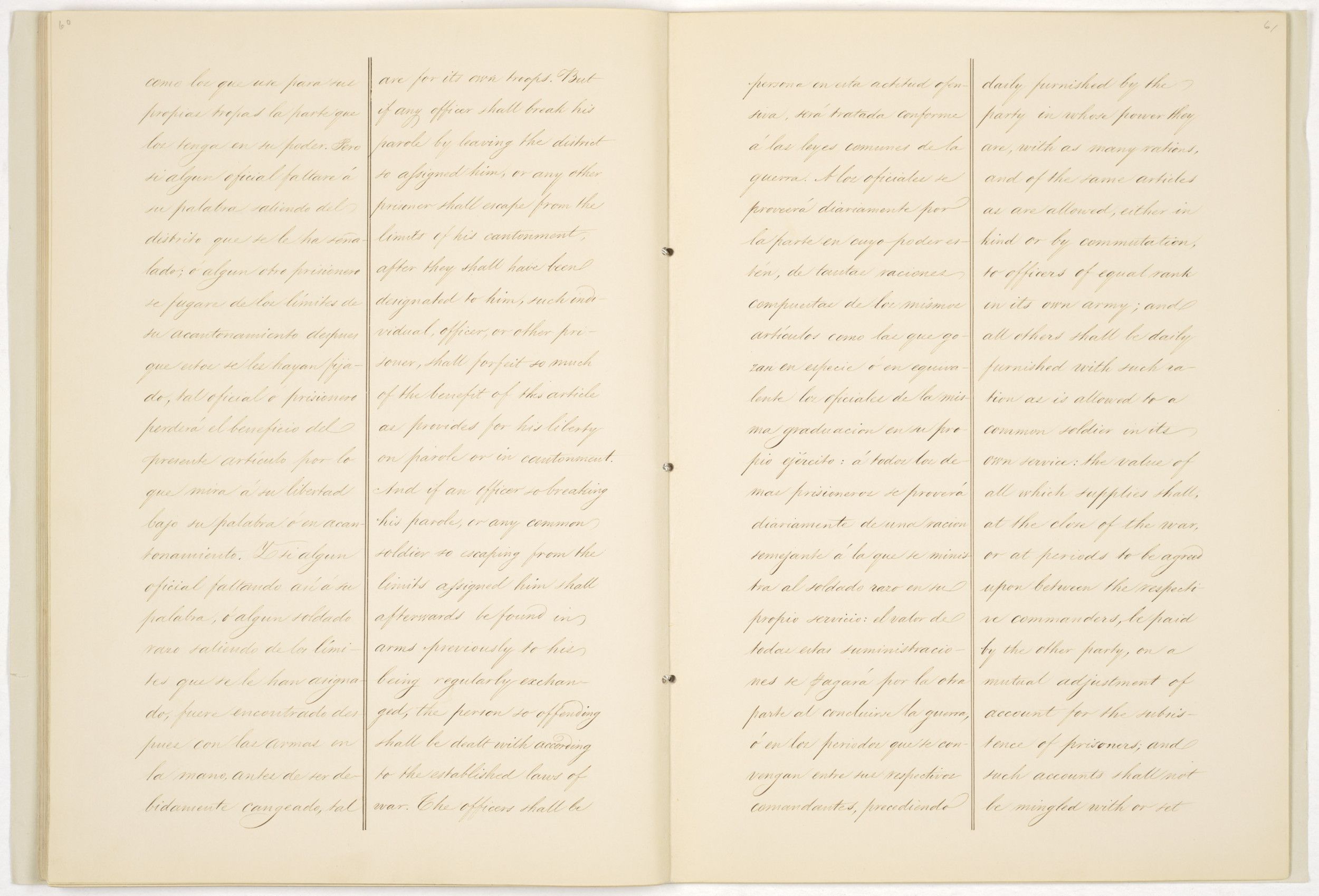
Treaty of Guadalupe Hidalgo [Exchange copy]
Page 32
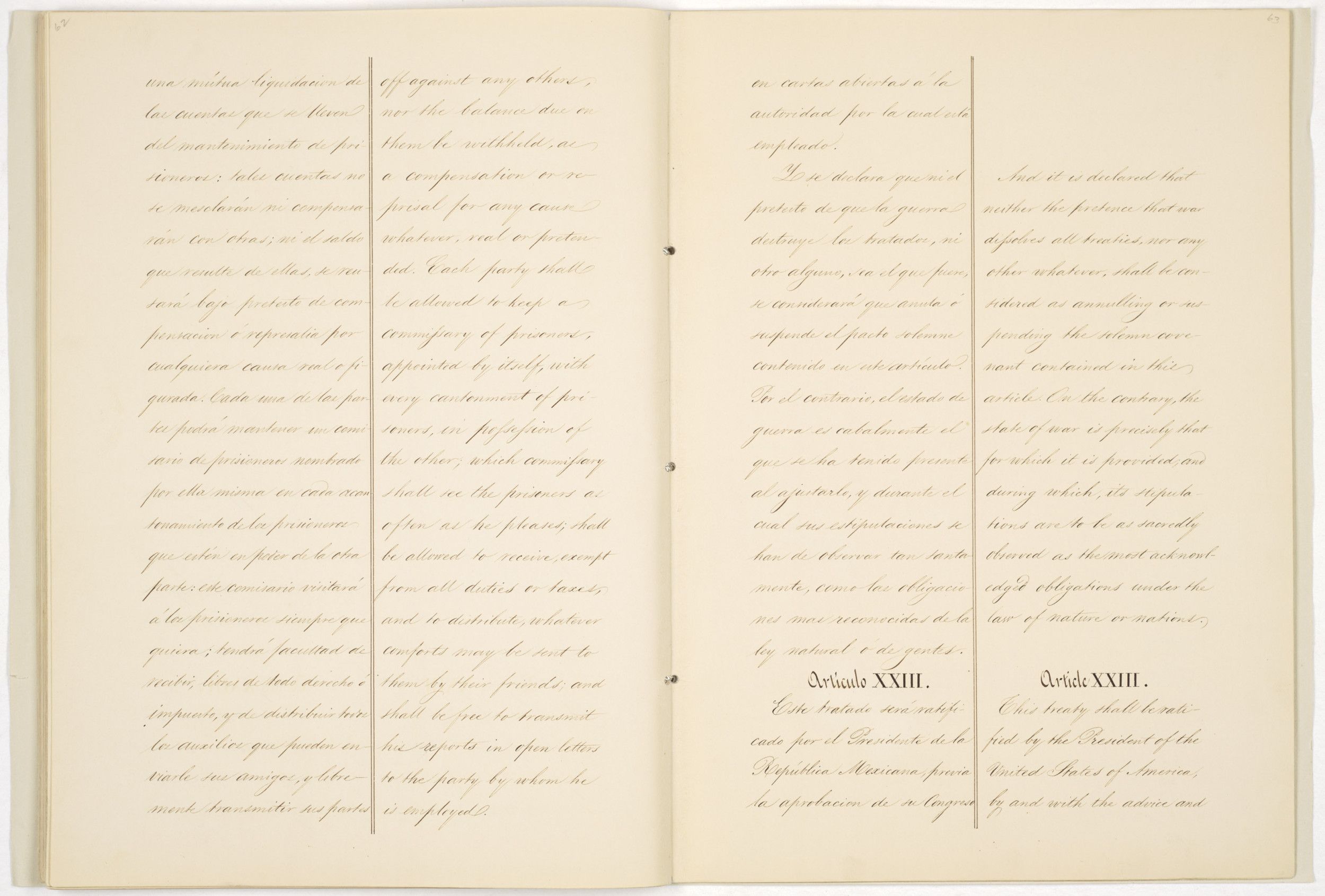
Treaty of Guadalupe Hidalgo [Exchange copy]
Page 33
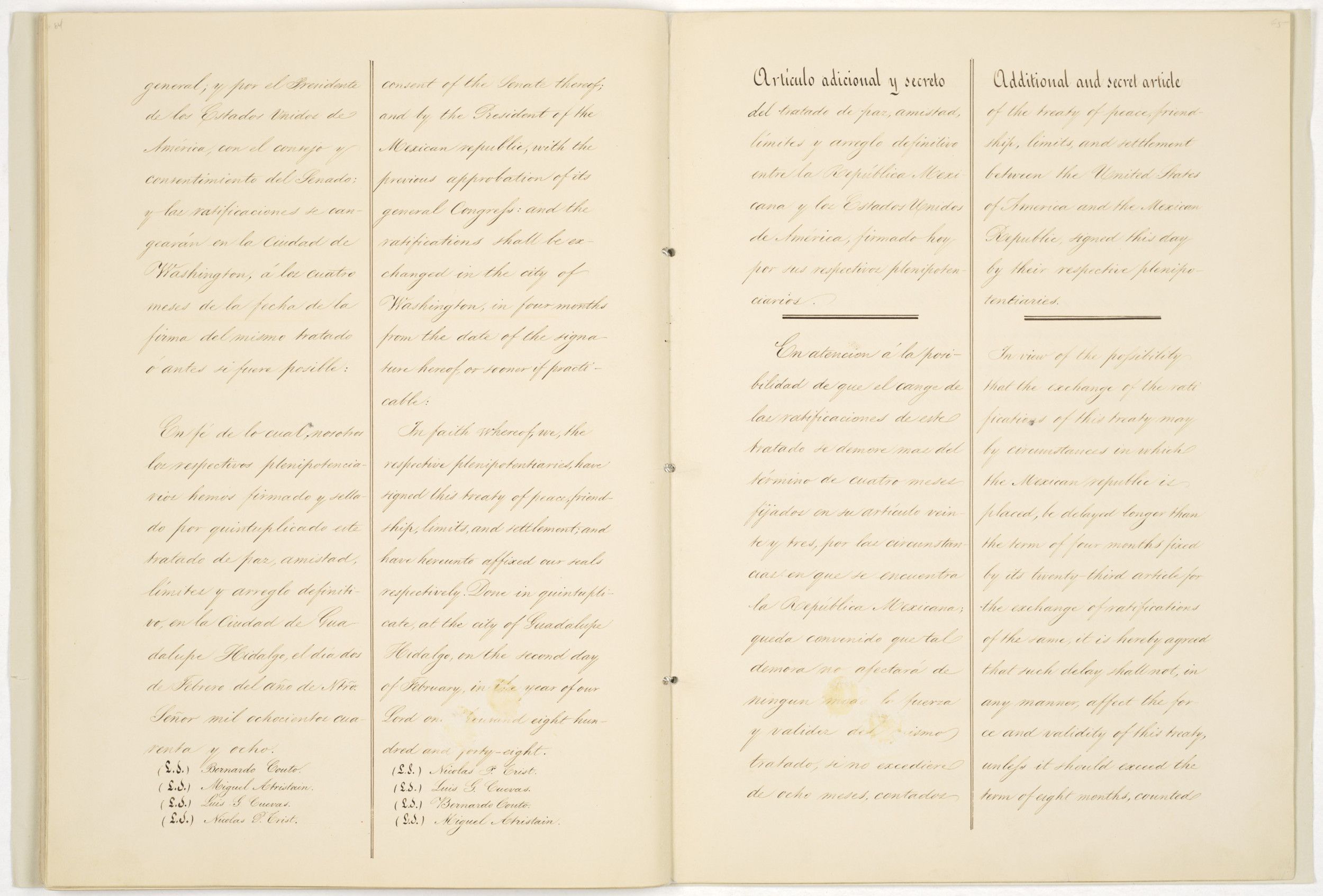
Treaty of Guadalupe Hidalgo [Exchange copy]
Page 34
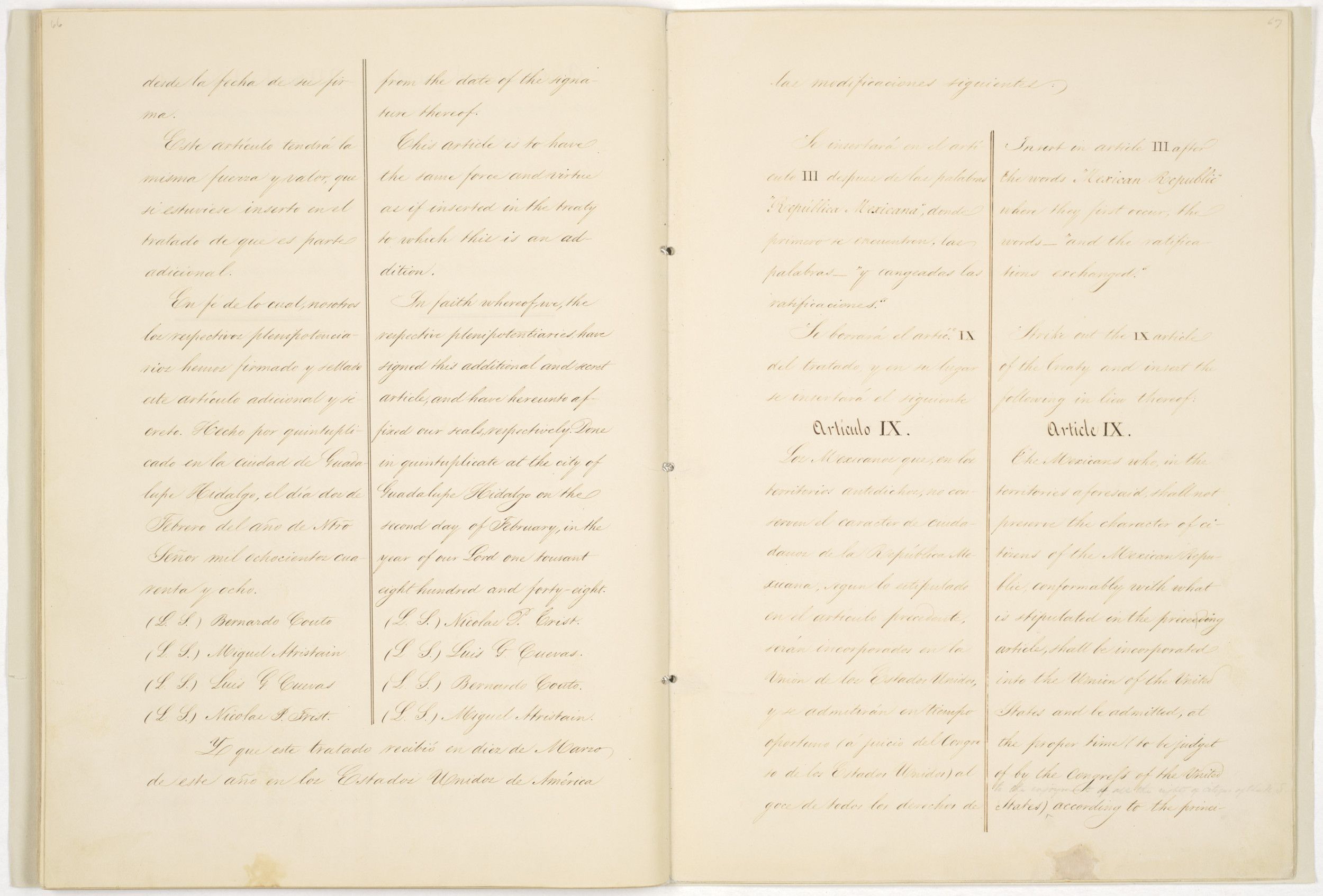
Treaty of Guadalupe Hidalgo [Exchange copy]
Page 35
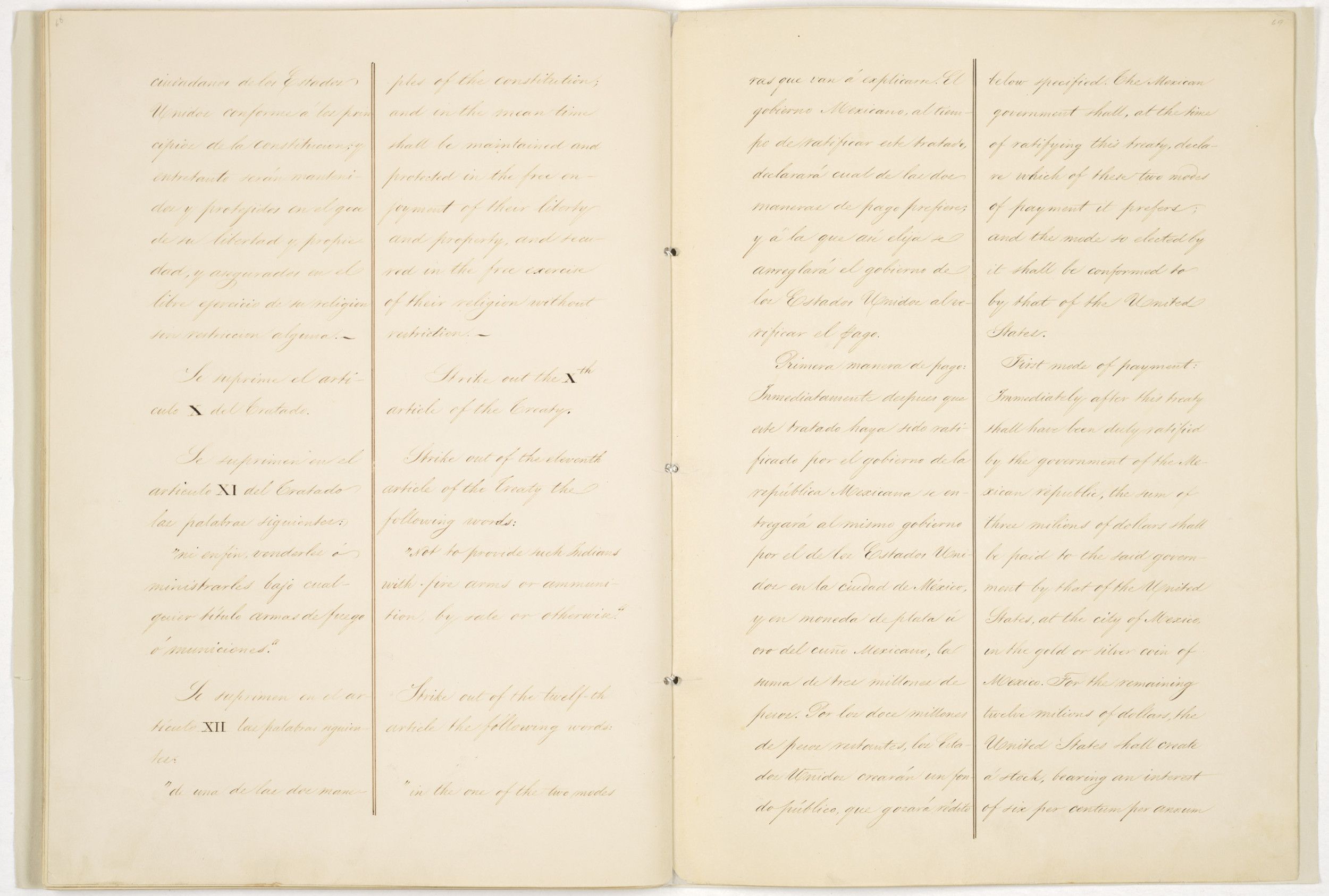
Treaty of Guadalupe Hidalgo [Exchange copy]
Page 36
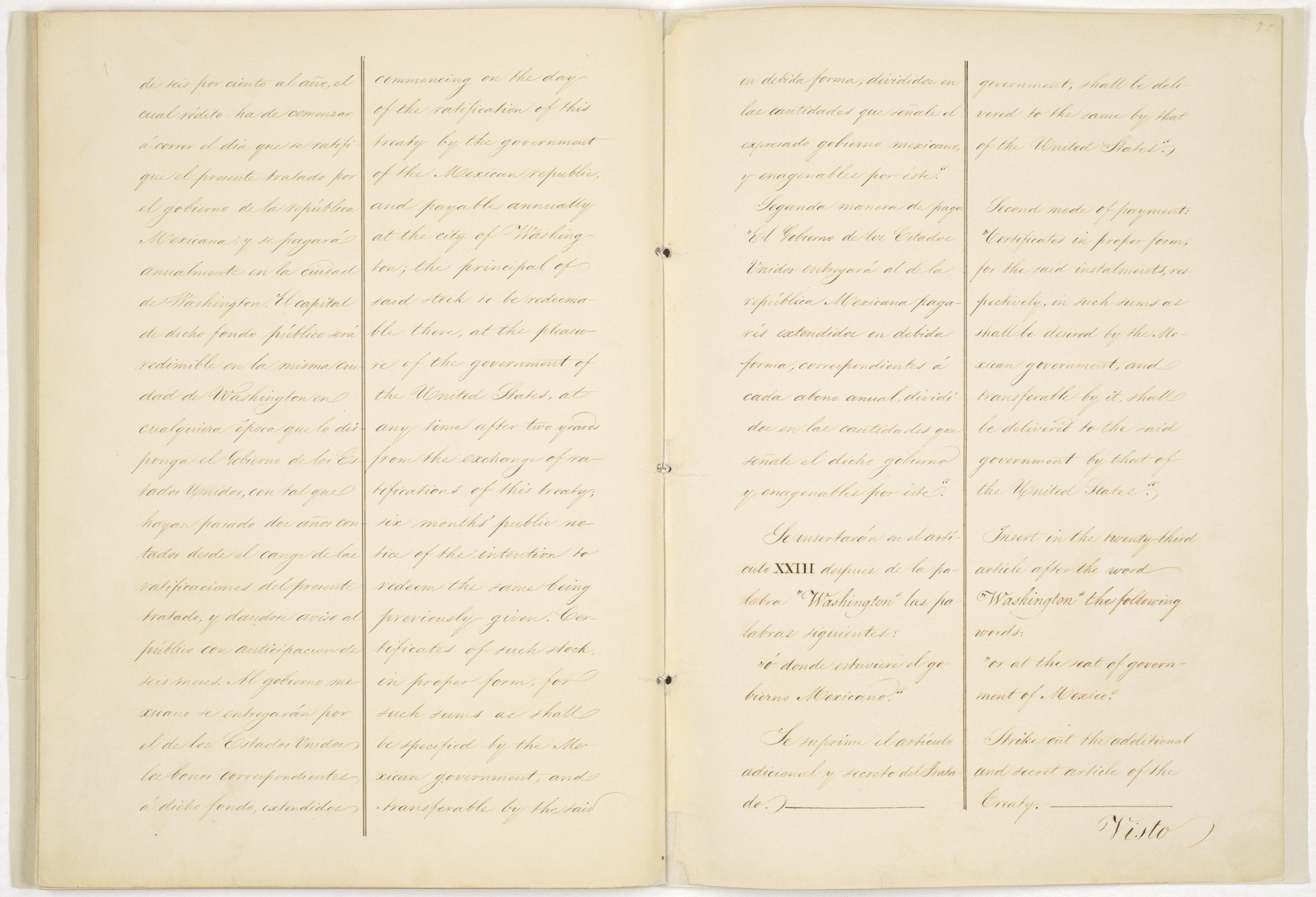
Treaty of Guadalupe Hidalgo [Exchange copy]
Page 37
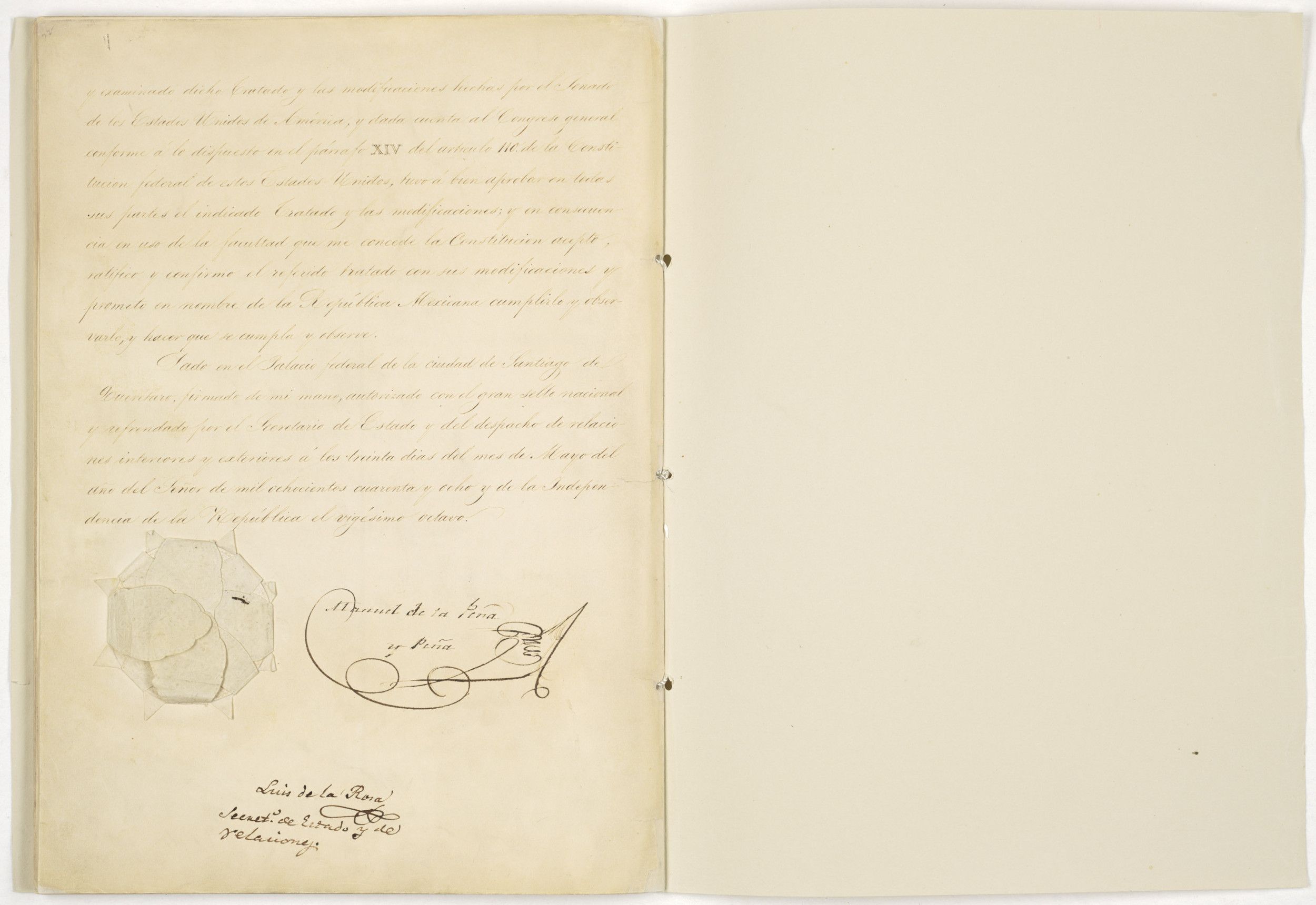
Treaty of Guadalupe Hidalgo [Exchange copy]
Page 38

Treaty of Guadalupe Hidalgo [Exchange copy]
Page 39
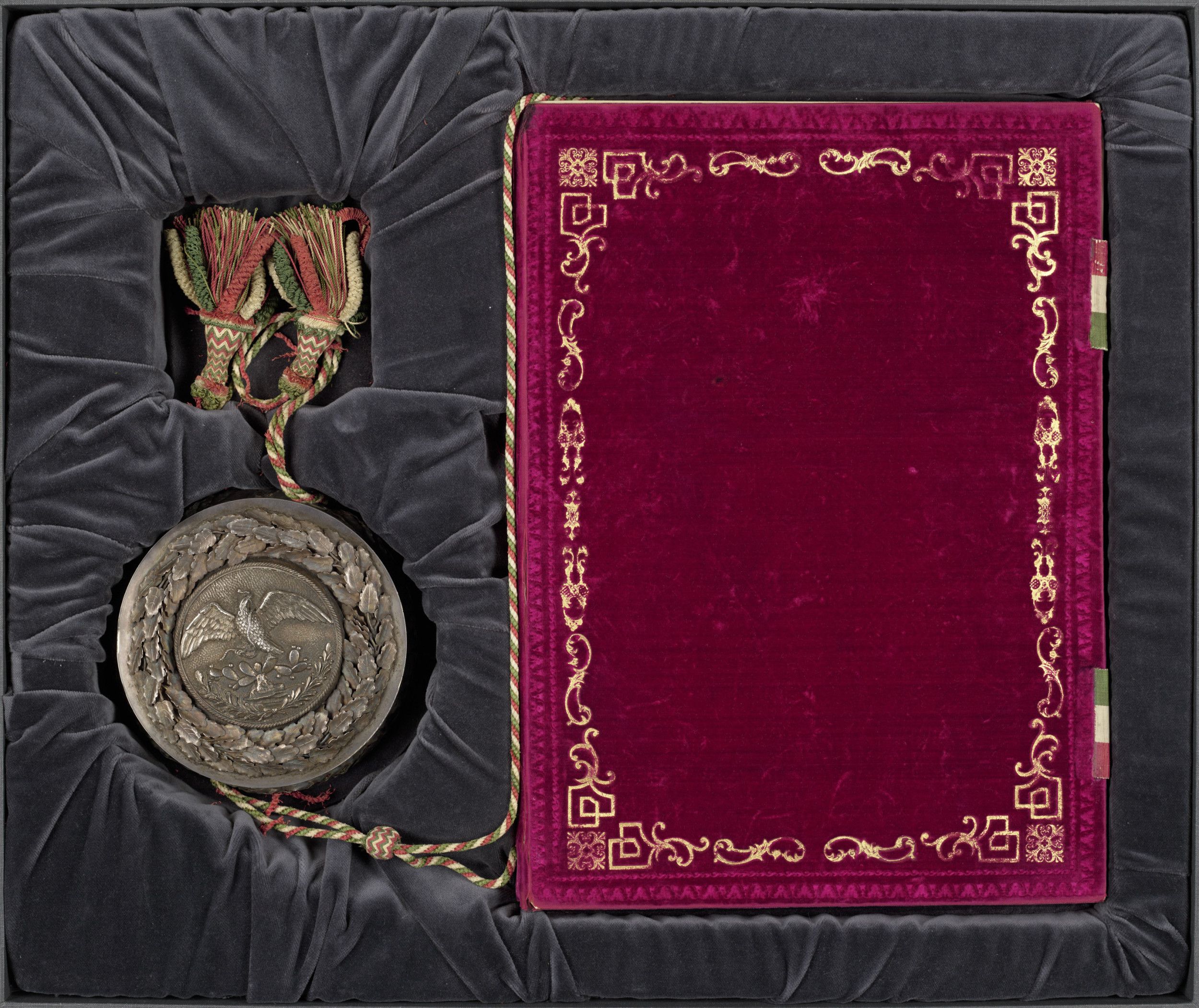
Treaty of Guadalupe Hidalgo [Exchange copy]
Page 40
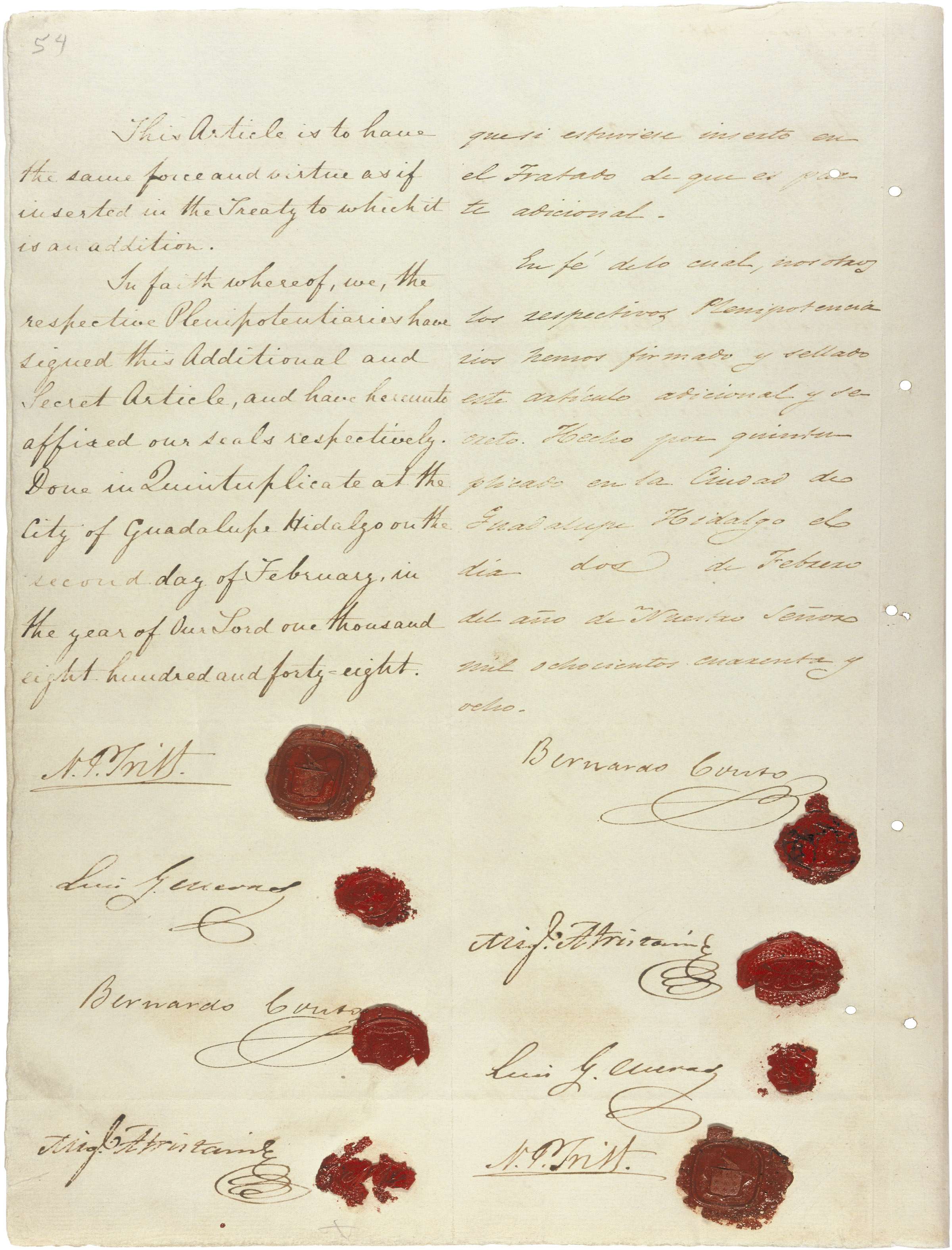
Document
Map of the United States Including Western Territories
12/1848
This map was ordered by President James K. Polk to accompany his annual message to Congress in December 1848. Principal draftsman Ephraim Gilman, of the U.S. General Land Office, created the map to show all of the existing states, territories, proposed territories, and the area of the Mexican Cession in the southwest acquired by the terms of the Treaty of Guadalupe Hidalgo, which ended the war with Mexico.
It represents Polk's conception, as a Southern Democrat, of how to divide up the new territory acquired through the Treaty. It became the starting point of debates in Congress over slavery and westward expansion.
It represents Polk's conception, as a Southern Democrat, of how to divide up the new territory acquired through the Treaty. It became the starting point of debates in Congress over slavery and westward expansion.
This primary source comes from the Records of the U.S. House of Representatives.
National Archives Identifier: 2127339
Full Citation: Map of the United States Including Western Territories; 12/1848; (HR29A-B1); General Records, 1791 - 2010; Records of the U.S. House of Representatives, ; National Archives Building, Washington, DC. [Online Version, https://docsteach.org/documents/document/western-territories-map, April 28, 2024]Map of the United States Including Western Territories
Page 2
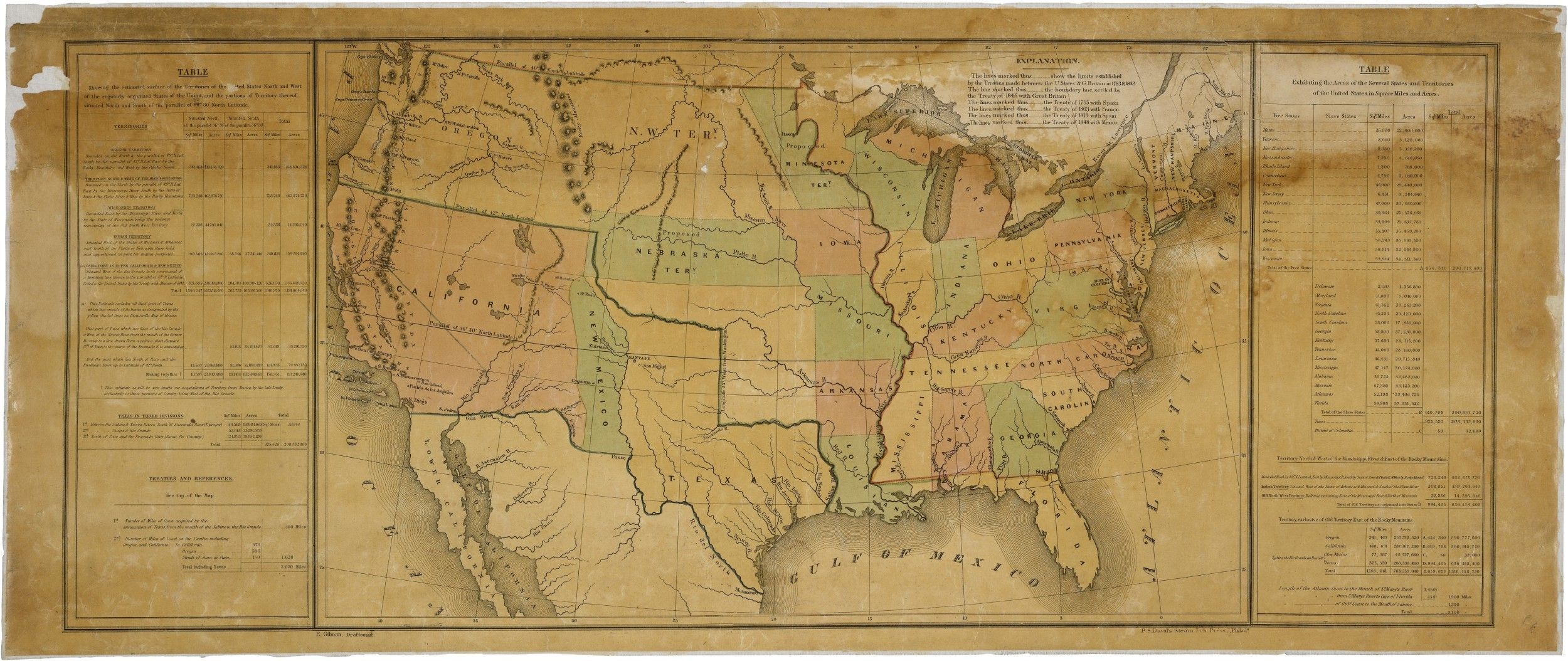
Document
Constitution of the United States
9/17/1787
Drafted in secret by delegates to the Constitutional Convention during the summer of 1787, this four-page document, signed on September 17, 1787, established the government of the United States.
The Federal Convention convened in the State House (Independence Hall) in Philadelphia on May 14, 1787, to revise the Articles of Confederation. Because the delegations from only two states were at first present, the members adjourned from day to day until a quorum of seven states was obtained on May 25. Through discussion and debate it became clear by mid-June that, rather than amend the existing Articles, the Convention would draft an entirely new frame of government.
All through the summer, in closed sessions, the delegates debated, and redrafted the articles of the new Constitution. Among the chief points at issue were how much power to allow the central government, how many representatives in Congress to allow each state, and how these representatives should be elected — directly by the people or by the state legislators. The work of many minds, the Constitution stands as a model of cooperative statesmanship and the art of compromise.
The Federal Convention convened in the State House (Independence Hall) in Philadelphia on May 14, 1787, to revise the Articles of Confederation. Because the delegations from only two states were at first present, the members adjourned from day to day until a quorum of seven states was obtained on May 25. Through discussion and debate it became clear by mid-June that, rather than amend the existing Articles, the Convention would draft an entirely new frame of government.
All through the summer, in closed sessions, the delegates debated, and redrafted the articles of the new Constitution. Among the chief points at issue were how much power to allow the central government, how many representatives in Congress to allow each state, and how these representatives should be elected — directly by the people or by the state legislators. The work of many minds, the Constitution stands as a model of cooperative statesmanship and the art of compromise.
Transcript
We the People of the United States, in Order to form a more perfect Union, establish Justice, insure domestic Tranquility, provide for the common defence, promote the general Welfare, and secure the Blessings of Liberty to ourselves and our Posterity, do ordain and establish this Constitution for the United States of America.Article. I.
Section. 1.
All legislative Powers herein granted shall be vested in a Congress of the United States, which shall consist of a Senate and House of Representatives.
Section. 2.
The House of Representatives shall be composed of Members chosen every second Year by the People of the several States, and the Electors in each State shall have the Qualifications requisite for Electors of the most numerous Branch of the State Legislature.
No Person shall be a Representative who shall not have attained to the Age of twenty five Years, and been seven Years a Citizen of the United States, and who shall not, when elected, be an Inhabitant of that State in which he shall be chosen.
Representatives and direct Taxes shall be apportioned among the several States which may be included within this Union, according to their respective Numbers, which shall be determined by adding to the whole Number of free Persons, including those bound to Service for a Term of Years, and excluding Indians not taxed, three fifths of all other Persons. The actual Enumeration shall be made within three Years after the first Meeting of the Congress of the United States, and within every subsequent Term of ten Years, in such Manner as they shall by Law direct. The Number of Representatives shall not exceed one for every thirty Thousand, but each State shall have at Least one Representative; and until such enumeration shall be made, the State of New Hampshire shall be entitled to chuse three, Massachusetts eight, Rhode-Island and Providence Plantations one, Connecticut five, New-York six, New Jersey four, Pennsylvania eight, Delaware one, Maryland six, Virginia ten, North Carolina five, South Carolina five, and Georgia three.
When vacancies happen in the Representation from any State, the Executive Authority thereof shall issue Writs of Election to fill such Vacancies.
The House of Representatives shall chuse their Speaker and other Officers; and shall have the sole Power of Impeachment.
Section. 3.
The Senate of the United States shall be composed of two Senators from each State, chosen by the Legislature thereof, for six Years; and each Senator shall have one Vote.
Immediately after they shall be assembled in Consequence of the first Election, they shall be divided as equally as may be into three Classes. The Seats of the Senators of the first Class shall be vacated at the Expiration of the second Year, of the second Class at the Expiration of the fourth Year, and of the third Class at the Expiration of the sixth Year, so that one third may be chosen every second Year; and if Vacancies happen by Resignation, or otherwise, during the Recess of the Legislature of any State, the Executive thereof may make temporary Appointments until the next Meeting of the Legislature, which shall then fill such Vacancies.
No Person shall be a Senator who shall not have attained to the Age of thirty Years, and been nine Years a Citizen of the United States, and who shall not, when elected, be an Inhabitant of that State for which he shall be chosen.
The Vice President of the United States shall be President of the Senate, but shall have no Vote, unless they be equally divided.
The Senate shall chuse their other Officers, and also a President pro tempore, in the Absence of the Vice President, or when he shall exercise the Office of President of the United States.
The Senate shall have the sole Power to try all Impeachments. When sitting for that Purpose, they shall be on Oath or Affirmation. When the President of the United States is tried, the Chief Justice shall preside: And no Person shall be convicted without the Concurrence of two thirds of the Members present.
Judgment in Cases of Impeachment shall not extend further than to removal from Office, and disqualification to hold and enjoy any Office of honor, Trust or Profit under the United States: but the Party convicted shall nevertheless be liable and subject to Indictment, Trial, Judgment and Punishment, according to Law.
Section. 4.
The Times, Places and Manner of holding Elections for Senators and Representatives, shall be prescribed in each State by the Legislature thereof; but the Congress may at any time by Law make or alter such Regulations, except as to the Places of chusing Senators.
The Congress shall assemble at least once in every Year, and such Meeting shall be on the first Monday in December, unless they shall by Law appoint a different Day.
Section. 5.
Each House shall be the Judge of the Elections, Returns and Qualifications of its own Members, and a Majority of each shall constitute a Quorum to do Business; but a smaller Number may adjourn from day to day, and may be authorized to compel the Attendance of absent Members, in such Manner, and under such Penalties as each House may provide.
Each House may determine the Rules of its Proceedings, punish its Members for disorderly Behaviour, and, with the Concurrence of two thirds, expel a Member.
Each House shall keep a Journal of its Proceedings, and from time to time publish the same, excepting such Parts as may in their Judgment require Secrecy; and the Yeas and Nays of the Members of either House on any question shall, at the Desire of one fifth of those Present, be entered on the Journal.
Neither House, during the Session of Congress, shall, without the Consent of the other, adjourn for more than three days, nor to any other Place than that in which the two Houses shall be sitting.
Section. 6.
The Senators and Representatives shall receive a Compensation for their Services, to be ascertained by Law, and paid out of the Treasury of the United States. They shall in all Cases, except Treason, Felony and Breach of the Peace, be privileged from Arrest during their Attendance at the Session of their respective Houses, and in going to and returning from the same; and for any Speech or Debate in either House, they shall not be questioned in any other Place.
No Senator or Representative shall, during the Time for which he was elected, be appointed to any civil Office under the Authority of the United States, which shall have been created, or the Emoluments whereof shall have been encreased during such time; and no Person holding any Office under the United States, shall be a Member of either House during his Continuance in Office.
Section. 7.
All Bills for raising Revenue shall originate in the House of Representatives; but the Senate may propose or concur with Amendments as on other Bills.
Every Bill which shall have passed the House of Representatives and the Senate, shall, before it become a Law, be presented to the President of the
United States; If he approve he shall sign it, but if not he shall return it, with his Objections to that House in which it shall have originated, who shall enter the Objections at large on their Journal, and proceed to reconsider it. If after such Reconsideration two thirds of that House shall agree to pass the Bill, it shall be sent, together with the Objections, to the other House, by which it shall likewise be reconsidered, and if approved by two thirds of that House, it shall become a Law. But in all such Cases the Votes of both Houses shall be determined by yeas and Nays, and the Names of the Persons voting for and against the Bill shall be entered on the Journal of each House respectively. If any Bill shall not be returned by the President within ten Days (Sundays excepted) after it shall have been presented to him, the Same shall be a Law, in like Manner as if he had signed it, unless the Congress by their Adjournment prevent its Return, in which Case it shall not be a Law.
Every Order, Resolution, or Vote to which the Concurrence of the Senate and House of Representatives may be necessary (except on a question of Adjournment) shall be presented to the President of the United States; and before the Same shall take Effect, shall be approved by him, or being disapproved by him, shall be repassed by two thirds of the Senate and House of Representatives, according to the Rules and Limitations prescribed in the Case of a Bill.
Section. 8.
The Congress shall have Power To lay and collect Taxes, Duties, Imposts and Excises, to pay the Debts and provide for the common Defence and general Welfare of the United States; but all Duties, Imposts and Excises shall be uniform throughout the United States;
To borrow Money on the credit of the United States;
To regulate Commerce with foreign Nations, and among the several States, and with the Indian Tribes;
To establish an uniform Rule of Naturalization, and uniform Laws on the subject of Bankruptcies throughout the United States;
To coin Money, regulate the Value thereof, and of foreign Coin, and fix the Standard of Weights and Measures;
To provide for the Punishment of counterfeiting the Securities and current Coin of the United States;
To establish Post Offices and post Roads;
To promote the Progress of Science and useful Arts, by securing for limited Times to Authors and Inventors the exclusive Right to their respective Writings and Discoveries;
To constitute Tribunals inferior to the supreme Court;
To define and punish Piracies and Felonies committed on the high Seas, and Offences against the Law of Nations;
To declare War, grant Letters of Marque and Reprisal, and make Rules concerning Captures on Land and Water;
To raise and support Armies, but no Appropriation of Money to that Use shall be for a longer Term than two Years;
To provide and maintain a Navy;
To make Rules for the Government and Regulation of the land and naval Forces;
To provide for calling forth the Militia to execute the Laws of the Union, suppress Insurrections and repel Invasions;
To provide for organizing, arming, and disciplining, the Militia, and for governing such Part of them as may be employed in the Service of the United States, reserving to the States respectively, the Appointment of the Officers, and the Authority of training the Militia according to the discipline prescribed by Congress;
To exercise exclusive Legislation in all Cases whatsoever, over such District (not exceeding ten Miles square) as may, by Cession of particular States, and the Acceptance of Congress, become the Seat of the Government of the United States, and to exercise like Authority over all Places purchased by the Consent of the Legislature of the State in which the Same shall be, for the Erection of Forts, Magazines, Arsenals, dock-Yards, and other needful Buildings;—And
To make all Laws which shall be necessary and proper for carrying into Execution the foregoing Powers, and all other Powers vested by this Constitution in the Government of the United States, or in any Department or Officer thereof.
Section. 9.
The Migration or Importation of such Persons as any of the States now existing shall think proper to admit, shall not be prohibited by the Congress prior to the Year one thousand eight hundred and eight, but a Tax or duty may be imposed on such Importation, not exceeding ten dollars for each Person.
The Privilege of the Writ of Habeas Corpus shall not be suspended, unless when in Cases of Rebellion or Invasion the public Safety may require it.
No Bill of Attainder or ex post facto Law shall be passed.
No Capitation, or other direct, Tax shall be laid, unless in Proportion to the Census or enumeration herein before directed to be taken.
No Tax or Duty shall be laid on Articles exported from any State.
No Preference shall be given by any Regulation of Commerce or Revenue to the Ports of one State over those of another: nor shall Vessels bound to, or from, one State, be obliged to enter, clear, or pay Duties in another.
No Money shall be drawn from the Treasury, but in Consequence of Appropriations made by Law; and a regular Statement and Account of the Receipts and Expenditures of all public Money shall be published from time to time.
No Title of Nobility shall be granted by the United States: And no Person holding any Office of Profit or Trust under them, shall, without the Consent of the Congress, accept of any present, Emolument, Office, or Title, of any kind whatever, from any King, Prince, or foreign State.
Section. 10.
No State shall enter into any Treaty, Alliance, or Confederation; grant Letters of Marque and Reprisal; coin Money; emit Bills of Credit; make any Thing but gold and silver Coin a Tender in Payment of Debts; pass any Bill of Attainder, ex post facto Law, or Law impairing the Obligation of Contracts, or grant any Title of Nobility.
No State shall, without the Consent of the Congress, lay any Imposts or Duties on Imports or Exports, except what may be absolutely necessary for executing it's inspection Laws: and the net Produce of all Duties and Imposts, laid by any State on Imports or Exports, shall be for the Use of the Treasury of the United States; and all such Laws shall be subject to the Revision and Controul of the Congress.
No State shall, without the Consent of Congress, lay any Duty of Tonnage, keep Troops, or Ships of War in time of Peace, enter into any Agreement or Compact with another State, or with a foreign Power, or engage in War, unless actually invaded, or in such imminent Danger as will not admit of delay.
Article. II.
Section. 1.
The executive Power shall be vested in a President of the United States of America. He shall hold his Office during the Term of four Years, and, together with the Vice President, chosen for the same Term, be elected, as follows
Each State shall appoint, in such Manner as the Legislature thereof may direct, a Number of Electors, equal to the whole Number of Senators and Representatives to which the State may be entitled in the Congress: but no Senator or Representative, or Person holding an Office of Trust or Profit under the United States, shall be appointed an Elector.
The Electors shall meet in their respective States, and vote by Ballot for two Persons, of whom one at least shall not be an Inhabitant of
the same State with themselves. And they shall make a List of all the Persons voted for, and of the Number of Votes for each; which List they shall sign and certify, and transmit sealed to the Seat of the Government of the United States, directed to the President of the Senate. The President of the Senate shall, in the Presence of the Senate and House of Representatives, open all the Certificates, and the Votes shall then be counted. The Person having the greatest Number of Votes shall be the President, if such Number be a Majority of the whole Number of Electors appointed; and if there be more than one who have such Majority, and have an equal Number of Votes, then the House of Representatives shall immediately chuse by Ballot one of them for President; and if no Person have a Majority, then from the five highest on the List the said House shall in like Manner chuse the President. But in chusing the President, the Votes shall be taken by States, the Representation from each State having one Vote; A quorum for this Purpose shall consist of a Member or Members from two thirds of the States, and a Majority of all the States shall be necessary to a Choice. In every Case, after the Choice of the President, the Person having the greatest Number of Votes of the Electors shall be the Vice President. But if there should remain two or more who have equal Votes, the Senate shall chuse from them by Ballot the Vice President.
The Congress may determine the Time of chusing the Electors, and the Day on which they shall give their Votes; which Day shall be the same throughout the United States.
No Person except a natural born Citizen, or a Citizen of the United States, at the time of the Adoption of this Constitution, shall be eligible to the Office of President; neither shall any Person be eligible to that Office who shall not have attained to the Age of thirty five Years, and been fourteen Years a Resident within the United States.
In Case of the Removal of the President from Office, or of his Death, Resignation, or Inability to discharge the Powers and Duties of the said Office, the Same shall devolve on the Vice President, and the Congress may by Law provide for the Case of Removal, Death, Resignation or Inability, both of the President and Vice President, declaring what Officer shall then act as President, and such Officer shall act accordingly, until the Disability be removed, or a President shall be elected.
The President shall, at stated Times, receive for his Services, a Compensation, which shall neither be encreased nor diminished during the Period for which he shall have been elected, and he shall not receive within that Period any other Emolument from the United States, or any of them.
Before he enter on the Execution of his Office, he shall take the following Oath or Affirmation:—"I do solemnly swear (or affirm) that I will faithfully execute the Office of President of the United States, and will to the best of my Ability, preserve, protect and defend the Constitution of the United States."
Section. 2.
The President shall be Commander in Chief of the Army and Navy of the United States, and of the Militia of the several States, when called into the actual Service of the United States; he may require the Opinion, in writing, of the principal Officer in each of the executive Departments, upon any Subject relating to the Duties of their respective Offices, and he shall have Power to grant Reprieves and Pardons for Offences against the United States, except in Cases of Impeachment.
He shall have Power, by and with the Advice and Consent of the Senate, to make Treaties, provided two thirds of the Senators present concur; and he shall nominate, and by and with the Advice and Consent of the Senate, shall appoint Ambassadors, other public Ministers and Consuls, Judges of the supreme Court, and all other Officers of the United States, whose Appointments are not herein otherwise provided for, and which shall be established by Law: but the Congress may by Law vest the Appointment of such inferior Officers, as they think proper, in the President alone, in the Courts of Law, or in the Heads of Departments.
The President shall have Power to fill up all Vacancies that may happen during the Recess of the Senate, by granting Commissions which shall expire at the End of their next Session.
Section. 3.
He shall from time to time give to the Congress Information of the State of the Union, and recommend to their Consideration such Measures as he shall judge necessary and expedient; he may, on extraordinary Occasions, convene both Houses, or either of them, and in Case of Disagreement between them, with Respect to the Time of Adjournment, he may adjourn them to such Time as he shall think proper; he shall receive Ambassadors and other public Ministers; he shall take Care that the Laws be faithfully executed, and shall Commission all the Officers of the United States.
Section. 4.
The President, Vice President and all civil Officers of the United States, shall be removed from Office on Impeachment for, and Conviction of, Treason, Bribery, or other high Crimes and Misdemeanors.
Article III.
Section. 1.
The judicial Power of the United States, shall be vested in one supreme Court, and in such inferior Courts as the Congress may from time to time ordain and establish. The Judges, both of the supreme and inferior Courts, shall hold their Offices during good Behaviour, and shall, at stated Times, receive for their Services, a Compensation, which shall not be diminished during their Continuance in Office.
Section. 2.
The judicial Power shall extend to all Cases, in Law and Equity, arising under this Constitution, the Laws of the United States, and Treaties made, or which shall be made, under their Authority;—to all Cases affecting Ambassadors, other public Ministers and Consuls;—to all Cases of admiralty and maritime Jurisdiction;—to Controversies to which the United States shall be a Party;—to Controversies between two or more States;— between a State and Citizens of another State,—between Citizens of different States,—between Citizens of the same State claiming Lands under Grants of different States, and between a State, or the Citizens thereof, and foreign States, Citizens or Subjects.
In all Cases affecting Ambassadors, other public Ministers and Consuls, and those in which a State shall be Party, the supreme Court shall have original Jurisdiction. In all the other Cases before mentioned, the supreme Court shall have appellate Jurisdiction, both as to Law and Fact, with such Exceptions, and under such Regulations as the Congress shall make.
The Trial of all Crimes, except in Cases of Impeachment, shall be by Jury; and such Trial shall be held in the State where the said Crimes shall have been committed; but when not committed within any State, the Trial shall be at such Place or Places as the Congress may by Law have directed.
Section. 3.
Treason against the United States, shall consist only in levying War against them, or in adhering to their Enemies, giving them Aid and Comfort. No Person shall be convicted of Treason unless on the Testimony of two Witnesses to the same overt Act, or on Confession in open Court.
The Congress shall have Power to declare the Punishment of Treason, but no Attainder of Treason shall work Corruption of Blood, or Forfeiture except during the Life of the Person attainted.
Article. IV.
Section. 1.
Full Faith and Credit shall be given in each State to the public Acts, Records, and judicial Proceedings of every other State. And the
Congress may by general Laws prescribe the Manner in which such Acts, Records and Proceedings shall be proved, and the Effect thereof.
Section. 2.
The Citizens of each State shall be entitled to all Privileges and Immunities of Citizens in the several States.
A Person charged in any State with Treason, Felony, or other Crime, who shall flee from Justice, and be found in another State, shall on Demand of the executive Authority of the State from which he fled, be delivered up, to be removed to the State having Jurisdiction of the Crime.
No Person held to Service or Labour in one State, under the Laws thereof, escaping into another, shall, in Consequence of any Law or Regulation therein, be discharged from such Service or Labour, but shall be delivered up on Claim of the Party to whom such Service or Labour may be due.
Section. 3.
New States may be admitted by the Congress into this Union; but no new State shall be formed or erected within the Jurisdiction of any other State; nor any State be formed by the Junction of two or more States, or Parts of States, without the Consent of the Legislatures of the States concerned as well as of the Congress.
The Congress shall have Power to dispose of and make all needful Rules and Regulations respecting the Territory or other Property belonging to the United States; and nothing in this Constitution shall be so construed as to Prejudice any Claims of the United States, or of any particular State.
Section. 4.
The United States shall guarantee to every State in this Union a Republican Form of Government, and shall protect each of them against Invasion; and on Application of the Legislature, or of the Executive (when the Legislature cannot be convened), against domestic Violence.
Article. V.
The Congress, whenever two thirds of both Houses shall deem it necessary, shall propose Amendments to this Constitution, or, on the Application of the Legislatures of two thirds of the several States, shall call a Convention for proposing Amendments, which, in either Case, shall be valid to all Intents and Purposes, as Part of this Constitution, when ratified by the Legislatures of three fourths of the several States, or by Conventions in three fourths thereof, as the one or the other Mode of Ratification may be proposed by the Congress; Provided that no Amendment which may be made prior to the Year One thousand eight hundred and eight shall in any Manner affect the first and fourth Clauses in the Ninth Section of the first Article; and that no State, without its Consent, shall be deprived of its equal Suffrage in the Senate.
Article. VI.
All Debts contracted and Engagements entered into, before the Adoption of this Constitution, shall be as valid against the United States under this Constitution, as under the Confederation.
This Constitution, and the Laws of the United States which shall be made in Pursuance thereof; and all Treaties made, or which shall be made, under the Authority of the United States, shall be the supreme Law of the Land; and the Judges in every State shall be bound thereby, any Thing in the Constitution or Laws of any State to the Contrary notwithstanding.
The Senators and Representatives before mentioned, and the Members of the several State Legislatures, and all executive and judicial Officers, both of the United States and of the several States, shall be bound by Oath or Affirmation, to support this Constitution; but no religious Test shall ever be required as a Qualification to any Office or public Trust under the United States.
Article. VII.
The Ratification of the Conventions of nine States, shall be sufficient for the Establishment of this Constitution between the States so ratifying the Same.
The Word, "the," being interlined between the seventh and eighth Lines of the first Page, The Word "Thirty" being partly written on an Erazure in the fifteenth Line of the first Page, The Words "is tried" being interlined between the thirty second and thirty third Lines of the first Page and the Word "the" being interlined between the forty third and forty fourth Lines of the second Page.
Attest William Jackson Secretary
done in Convention by the Unanimous Consent of the States present the Seventeenth Day of September in the Year of our Lord one thousand seven hundred and Eighty seven and of the Independance of the United States of America the Twelfth In witness whereof We have hereunto subscribed our Names,
G°. Washington
Presidt and deputy from Virginia
Delaware
Geo: Read
Gunning Bedford jun
John Dickinson
Richard Bassett
Jaco: Broom
Maryland
James McHenry
Dan of St Thos. Jenifer
Danl. Carroll
Virginia
John Blair
James Madison Jr.
North Carolina
Wm. Blount
Richd. Dobbs Spaight
Hu Williamson
South Carolina
J. Rutledge
Charles Cotesworth Pinckney
Charles Pinckney
Pierce Butler
Georgia
William Few
Abr Baldwin
New Hampshire
John Langdon
Nicholas Gilman
Massachusetts
Nathaniel Gorham
Rufus King
Connecticut
Wm. Saml. Johnson
Roger Sherman
New York
Alexander Hamilton
New Jersey
Wil: Livingston
David Brearley
Wm. Paterson
Jona: Dayton
Pensylvania
B Franklin
Thomas Mifflin
Robt. Morris
Geo. Clymer
Thos. FitzSimons
Jared Ingersoll
James Wilson
Gouv Morris
This primary source comes from the General Records of the United States Government.
National Archives Identifier: 1667751
Full Citation: Constitution of the United States; 9/17/1787; The Constitution of the United States, 9/17/1787 - 9/17/1787; General Records of the United States Government, ; National Archives Building,Washington, DC. [Online Version, https://docsteach.org/documents/document/constitution, April 28, 2024]Constitution of the United States
Page 1
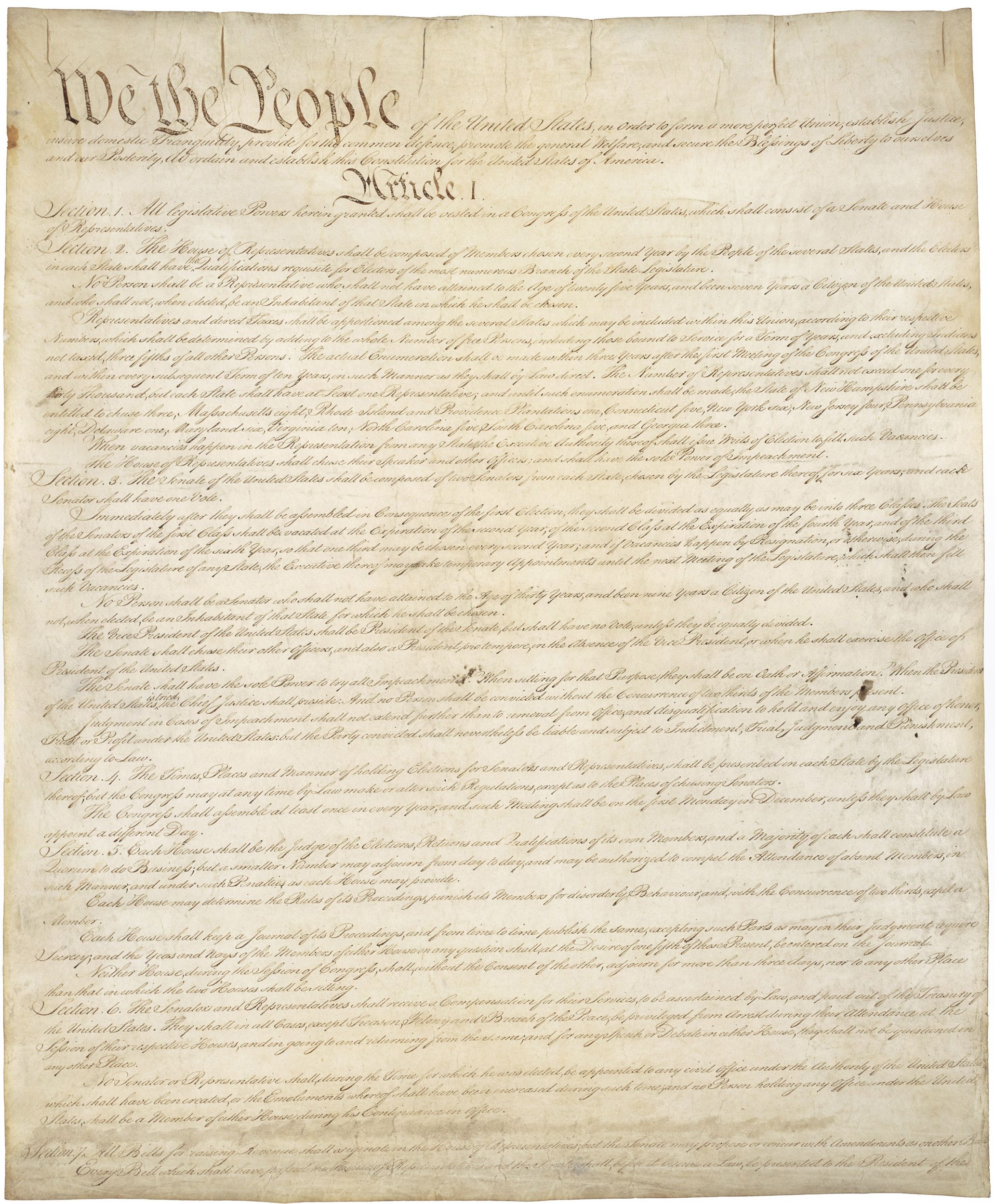
Constitution of the United States
Page 2
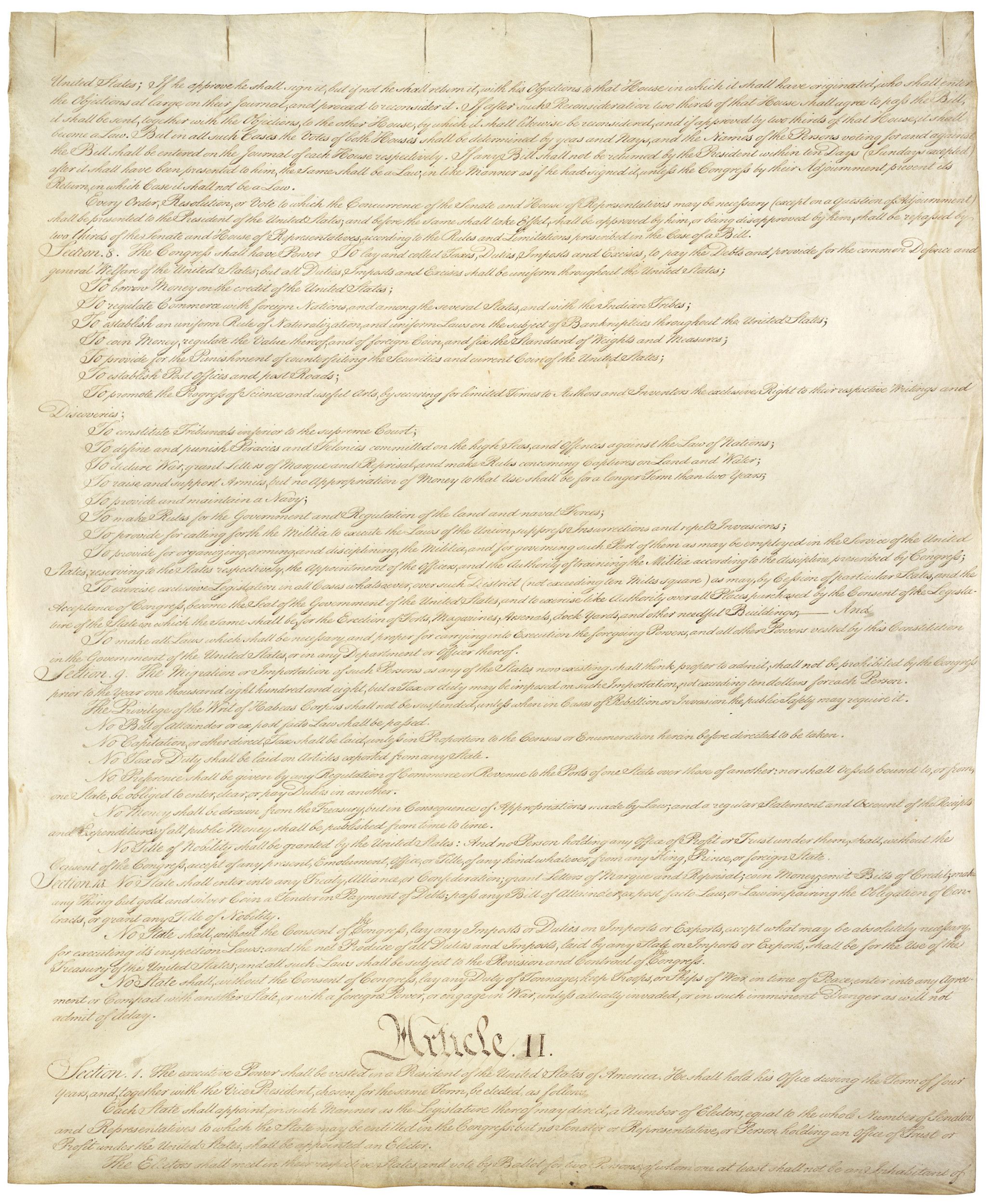
Constitution of the United States
Page 3
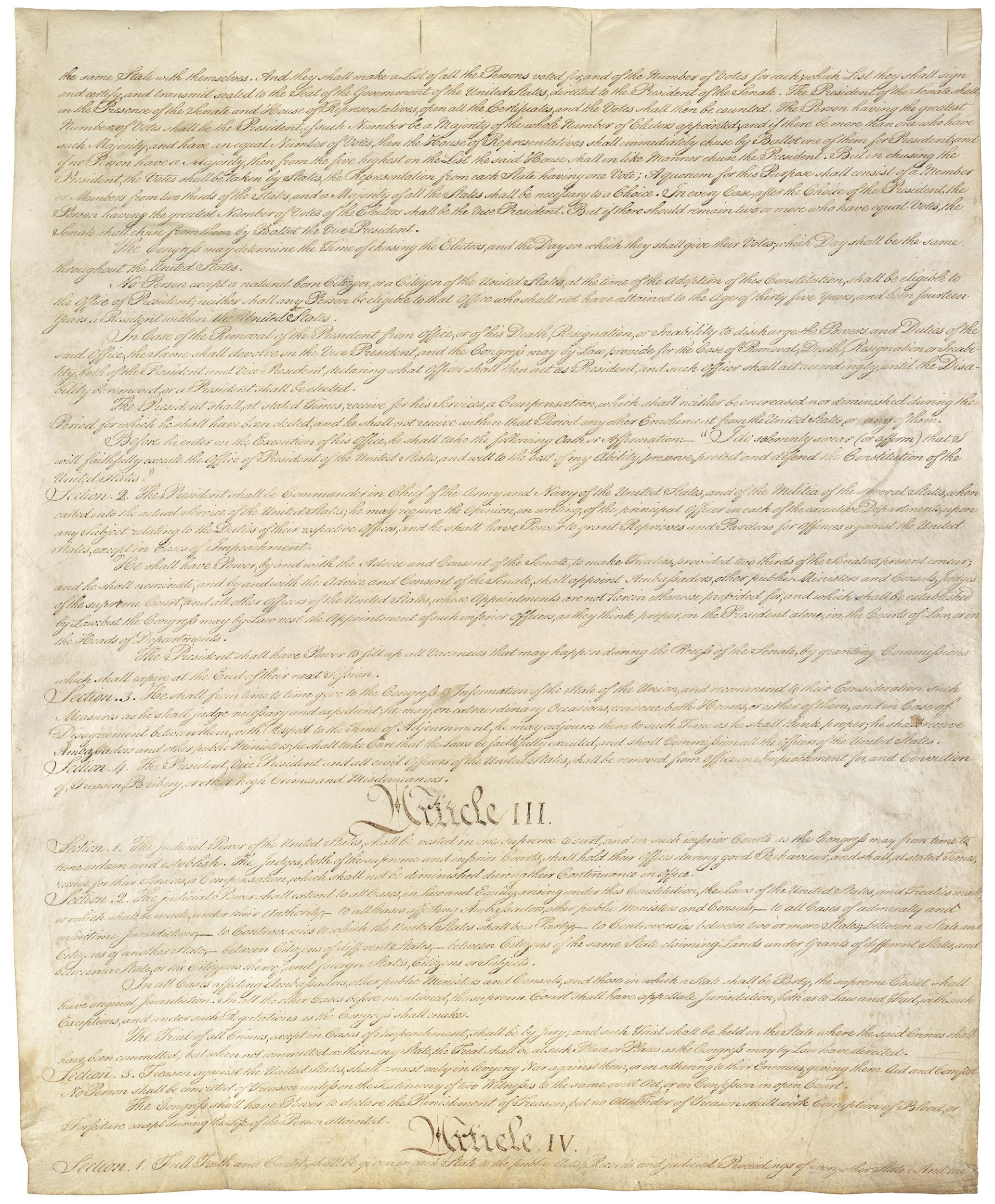
Constitution of the United States
Page 4
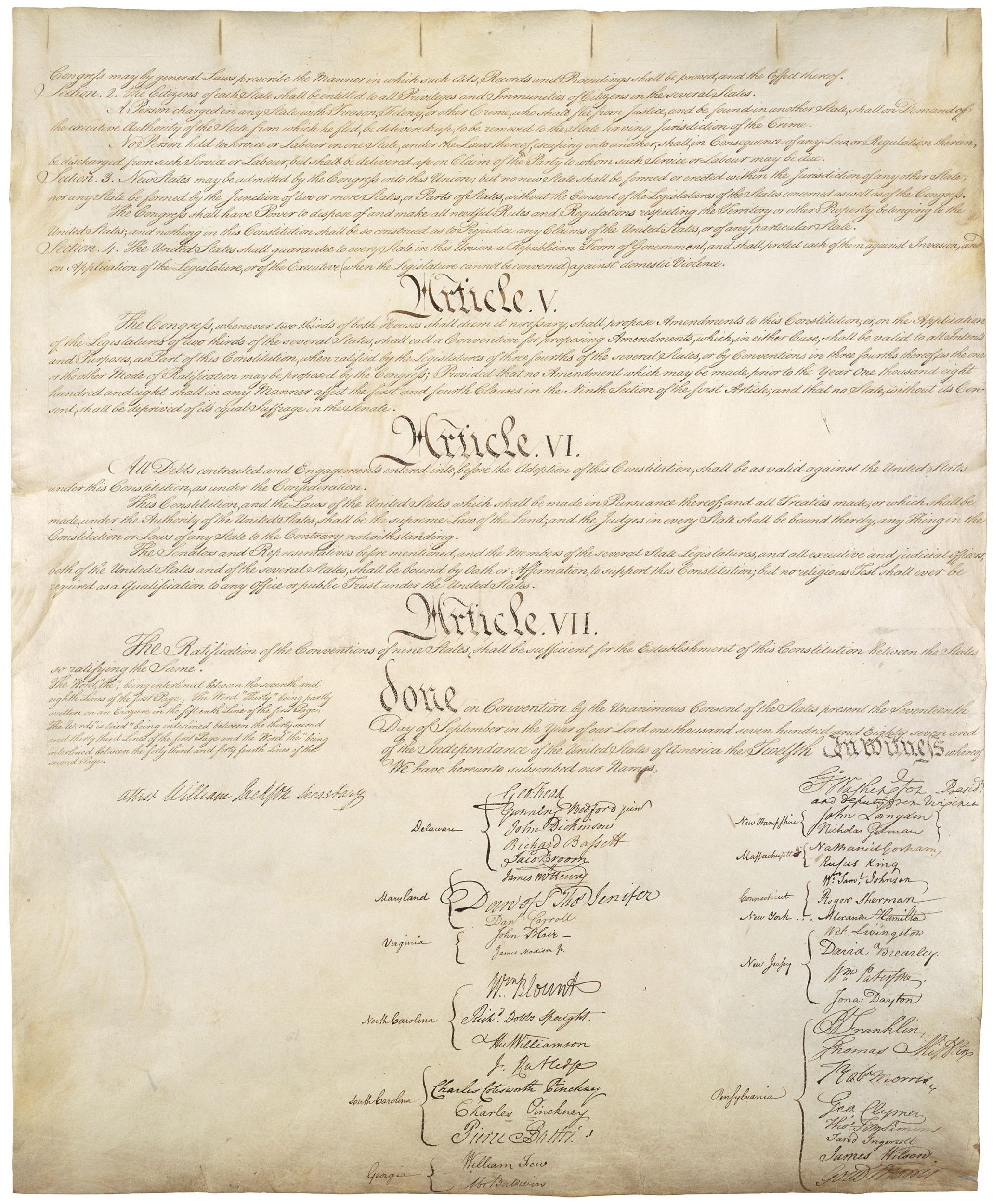
Document
Act of May 20, 1862 (Homestead Act), Public Law 37-64 (12 STAT 392)
5/20/1862
President Abraham Lincoln signed the Homestead Act on May 20, 1862, during the Civil War. The act provided that any adult citizen, or future citizen, who had never borne arms against the U.S. government could claim 160 acres of surveyed government land.
On January 1, 1863, Daniel Freeman made the first claim under the Act. Claimants were required to "improve" the plot by building a dwelling and cultivating the land. After 5 years on the land, the original filer was entitled to the property, free and clear, except for a small registration fee. Title could also be acquired after only a 6-month residency and trivial improvements, provided the claimant paid the government $1.25 per acre. After the Civil War, Union soldiers could deduct the time they had served from the residency requirements.
In reality, few laborers and farmers could afford to build a farm or acquire the necessary tools, seed, and livestock. Most of those who purchased land under the act came from areas quite close to their new homesteads (Iowans moved to Nebraska, Minnesotans to South Dakota, and so on). Unfortunately, the act was framed so ambiguously that it seemed to invite fraud, and early modifications by Congress only compounded the problem. Most of the land went to speculators, cattlemen, miners, lumbermen, and railroads. Of some 500 million acres dispersed by the General Land Office between 1862 and 1904, only 80 million acres went to homesteaders. Indeed, small farmers acquired more land under the Homestead Act in the 20th century than in the 19th.
On January 1, 1863, Daniel Freeman made the first claim under the Act. Claimants were required to "improve" the plot by building a dwelling and cultivating the land. After 5 years on the land, the original filer was entitled to the property, free and clear, except for a small registration fee. Title could also be acquired after only a 6-month residency and trivial improvements, provided the claimant paid the government $1.25 per acre. After the Civil War, Union soldiers could deduct the time they had served from the residency requirements.
In reality, few laborers and farmers could afford to build a farm or acquire the necessary tools, seed, and livestock. Most of those who purchased land under the act came from areas quite close to their new homesteads (Iowans moved to Nebraska, Minnesotans to South Dakota, and so on). Unfortunately, the act was framed so ambiguously that it seemed to invite fraud, and early modifications by Congress only compounded the problem. Most of the land went to speculators, cattlemen, miners, lumbermen, and railroads. Of some 500 million acres dispersed by the General Land Office between 1862 and 1904, only 80 million acres went to homesteaders. Indeed, small farmers acquired more land under the Homestead Act in the 20th century than in the 19th.
Transcript
Rec[?] 21 MayPublic 64
HR 125
Thirty-seventh
Congress of the United States
At the Second Session
BEGUN AND HELD AT THE CITY OF WASHINGTON
In the District of Columbia
On Monday the [second] day of December one thousand eight-hundred and sixty-one
[line]
AN ACT to secure homesteads to actual, settlers on the public domain.
[line]
Be it Enacted by the Senate and House of Representatives of the United States of America in Congress assembled, That any person who is the head of a family, or who has arrived at the age of twenty-one years, and is a citizen of the United States, or who shall have filed his declaration of intention to become such, as required by the naturalization laws of the United States, and who has never borne arms against the United States Government or given aid and comfort to its enemies, shall, from and after the first January, eighteen hundred and. sixty-three, be entitled to enter one quarter section or a less quantity of unappropriated public lands, upon which said person may have filed a preemption claim, or which may, at the time the application is made, be subject to preemption at one dollar and twenty-five cents, or less, per acre; or eighty acres or less of such unappropriated lands, at two dollars and fifty cents per acre, to be located in a body, in conformity to the legal subdivisions of the public lands, and after the same shall have been surveyed: Provided, That any person owning and residing on land may, under the provisions of this act, enter other land lying contiguous to his or her said land, which shall not, with the land so already owned and occupied, exceed in the aggregate one hundred and sixty acres.
SEC. 2. And be it further enacted, That the person applying
for the benefit of this act shall, upon application to the register of the land office in which he or she is about to make such entry, make affidavit before the said register or receiver that he or she is the head of a family, or is twenty-one years or more of age, or shall have performed service in the army or navy of the United States, and that he has never borne arms against the Government of the United States or given aid and comfort to its enemies, and that such application is made for his or her exclusive use and benefit, and that said entry is made for the purpose of actual settlement and cultivation, and not either directly or indirectly for the use or benefit of any other person or persons whomsoever; and upon filing the said affidavit with the register or receiver, and on payment of ten dollars, he or she shall thereupon be permitted to enter the quantity of land specified: Provided, however, That no certificate shall be given or patent issued therefor until the expiration of five years from the date of such entry ; and if, at the expiration of such time, or at any time within two years thereafter, the person making such entry ; or, if he be dead, his widow; or in case of her death, his heirs or devisee; or in case of a widow making such entry, her heirs or devisee, in case of her death ; shall. prove by two credible witnesses that he, she, or they have resided upon or cultivated the same for the term of five years immediately succeeding the time of filing the affidavit aforesaid, and shall make affidavit that no part of said land has been alienated, and that he has borne rue allegiance to the Government of the United States; then, in such case, he, she, or they, if at that time a citizen of the United States, shall be entitled to a patent, as in other cases provided for by law: And provided, further, That in case of the death
of both father and mother, leaving an Infant child, or children, under twenty-one years of age, the right and fee shall ensure to the benefit of said infant child or children ; and the executor,
administrator, or guardian may, at any time within two years after the death of the surviving
parent, and in accordance with the laws of the State in which such children for the time being have their domicil, sell said land for the benefit of said infants, but for no other purpose; and the purchaser shall acquire the absolute title by the purchase, and be en- titled to a patent from the United States, on payment of the office fees and sum of money herein specified.
SEC. 3. And be it further enacted, That the register of the land office shall note all such
applications on the tract books and plats of, his office, and keep a register of all such entries, and make return thereof to the General Land Office, together with the proof upon which they have been founded.
SEC. 4. And be it further enacted, That no lands acquired under the provisions of this act shall in any event become liable to the satisfaction of any debt or debts contracted prior to the issuing of the patent therefor.
SEC. 5. And be it further enacted, That if, at any time after the filing of the affidavit, as required in the second section of this act, and before the expiration of the five years aforesaid, it shall be proven, after due notice to the settler, to the satisfaction of the register of the land office, that the person having filed such affidavit shall have actually changed his or her residence, or abandoned the said land for more than six months at any time, then and in that event the land so entered shall revert to the government.
SEC. 6. And be it further enacted, That no individual shall be permit- ted to acquire title to more than one quarter section under the provisions of this act; and that the Commissioner of the General Land Office is hereby required to prepare and issue such rules and regulations, consistent with this act, as shall be necessary and proper to carry its provisions into effect; and that the registers and receivers of the several land offices shall be entitled to receive the same compensation for any lands entered under the provisions of this act that they are
now entitled to receive when the same quantity of land is entered with money, one half to be paid by the person making the application at the time of so doing, and the other half on the issue of the certificate by the person to whom it may be issued; but this shall not be construed to enlarge the maximum of compensation now prescribed by law for any register or receiver: Provided, That nothing contained in this act shall be so construed as to im- pair or interfere in any manner whatever with existing preemption rights: And provided, further, That all persons who may have filed their applications for a preemption right prior to the passage of this act, shall be entitled to all privileges of this act: Provided, further, That no person who has served, or may hereafter serve, for a period of not less than fourteen days in the army or navy of the United States, either regular or volunteer, under the laws thereof, during the existence of an actual war, domestic or foreign, shall be deprived of the benefits of this act on account of not having attained the age of twenty-one years.
SEC. 7. And be it further enacted, That the fifth section of the act en- titled "An act in addition to an act more effectually to provide for the punishment of certain crimes against the United States, and for other purposes," approved the third of March, in the year eighteen hundred and fifty-seven, shall extend to all oaths, affirmations, and affidavits, re- quired or authorized by this act.
SEC. 8. And be it further enacted, That nothing in this act shall be 80 construed as to prevent any person who has availed him or herself of the benefits of the fir8t section of this act, from paying the minimum price, or the price to which the same may have graduated, for the quantity of land so entered at any time before the expiration of the five years, and obtain- ing a patent therefor from the government, as in other cases provided by law, on making proof of settlement and cultivation as provided by existing laws granting preemption rights.
Galusha A. Grow
Speaker of the House of Representatives
Solomon Foot,
President of the Senate protempore
Approved, May 20, 1862
Abraham Lincoln
This primary source comes from the General Records of the United States Government.
National Archives Identifier: 299815
Full Citation: Act of May 20, 1862 (Homestead Act), Public Law 37-64 (12 STAT 392); 5/20/1862; Enrolled Acts and Resolutions of Congress, 1789 - 2011; General Records of the United States Government, ; National Archives Building, Washington, DC. [Online Version, https://docsteach.org/documents/document/homestead-act, April 28, 2024]Act of May 20, 1862 (Homestead Act), Public Law 37-64 (12 STAT 392)
Page 1
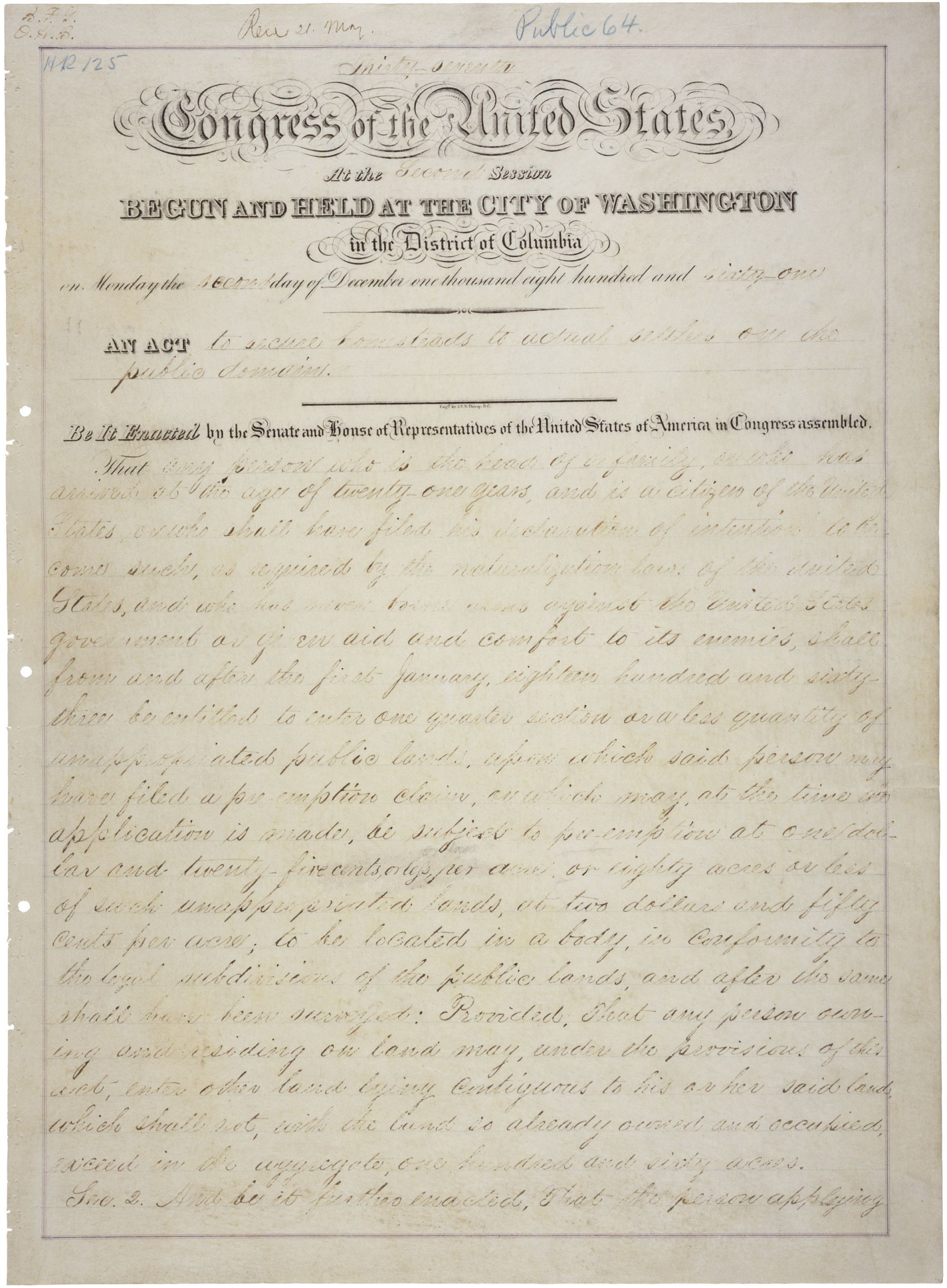
Act of May 20, 1862 (Homestead Act), Public Law 37-64 (12 STAT 392)
Page 2
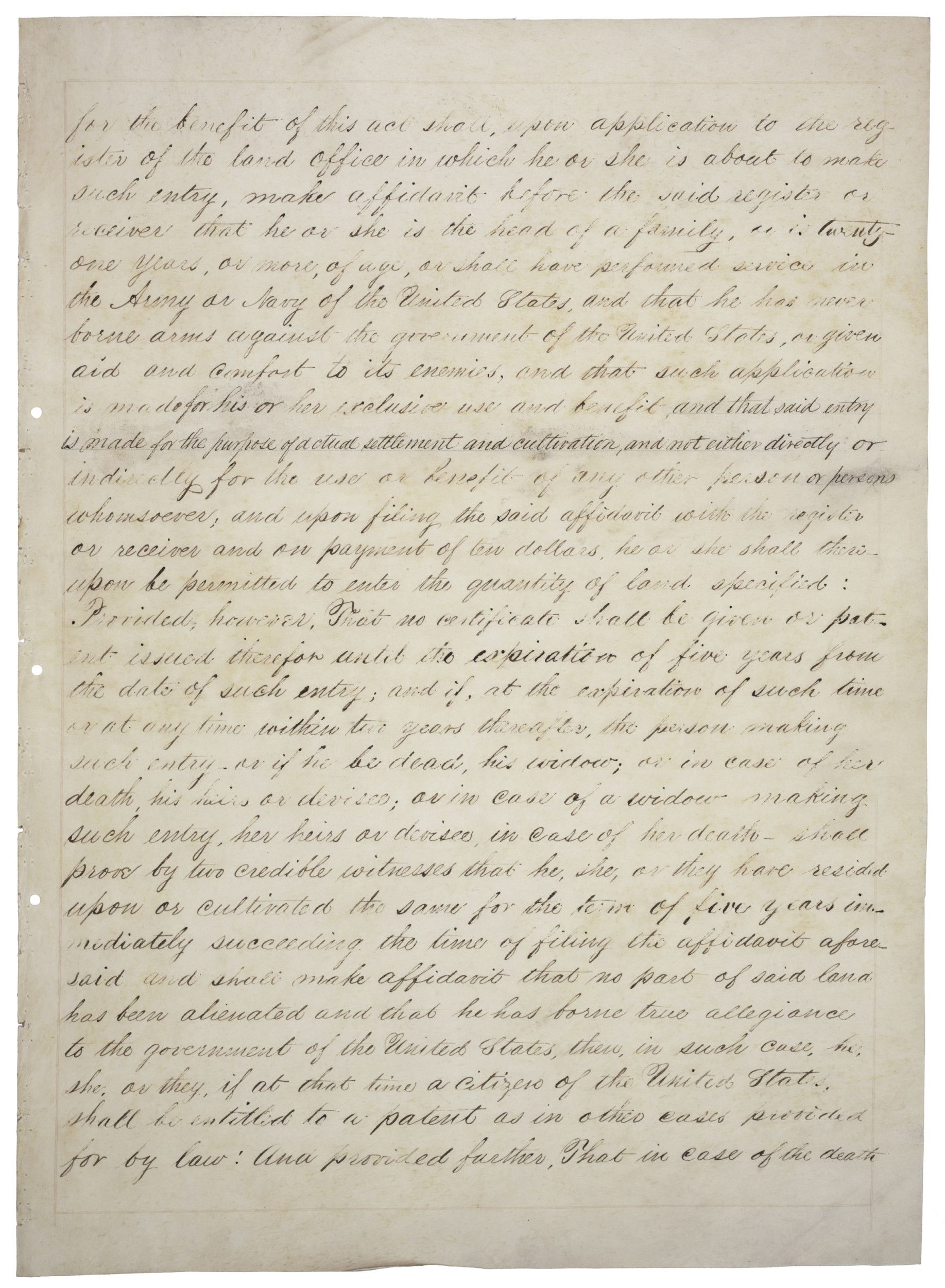
Act of May 20, 1862 (Homestead Act), Public Law 37-64 (12 STAT 392)
Page 3
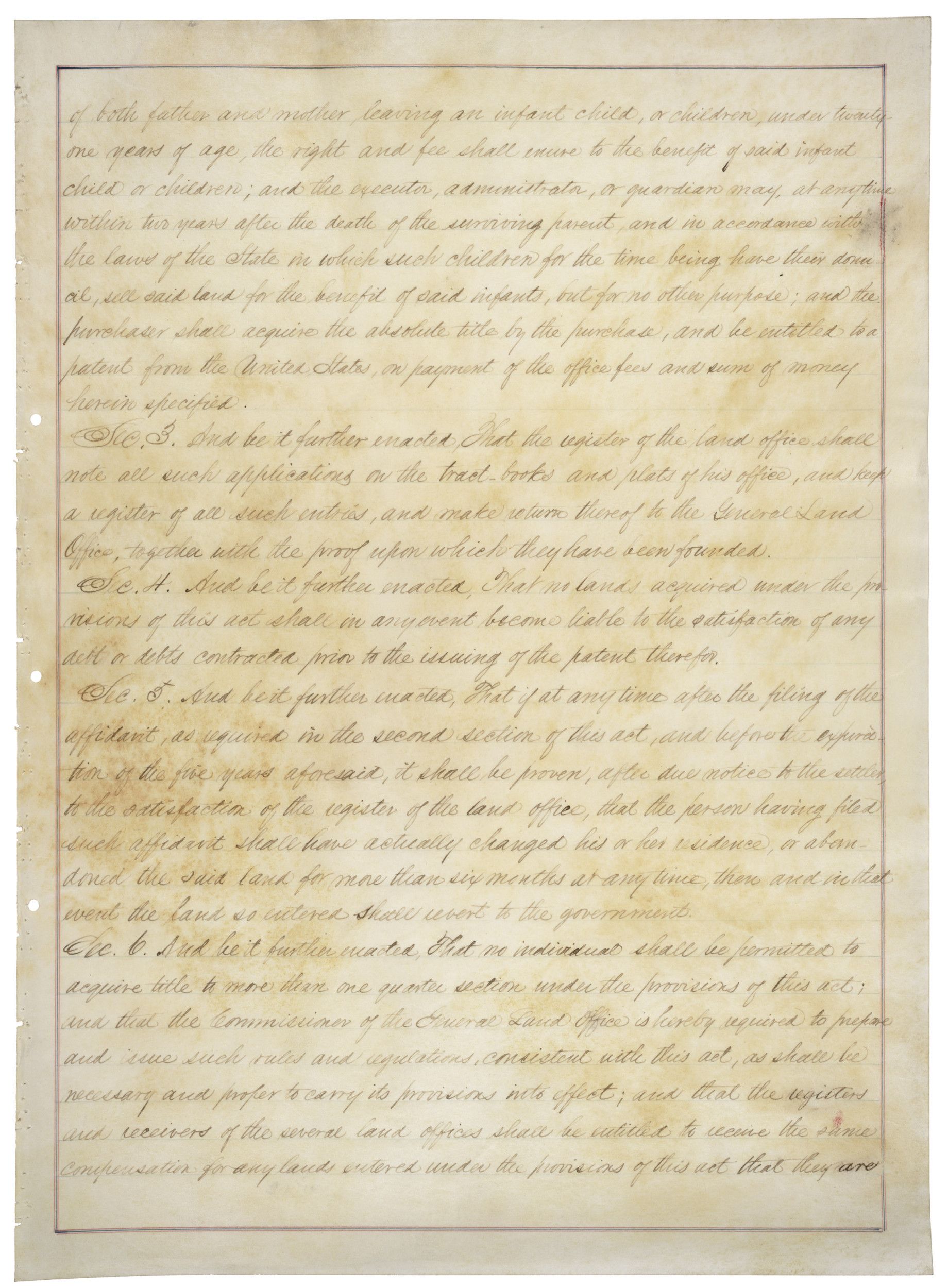
Act of May 20, 1862 (Homestead Act), Public Law 37-64 (12 STAT 392)
Page 4
